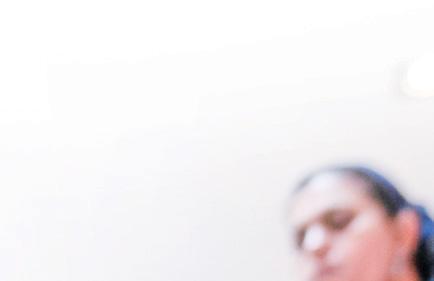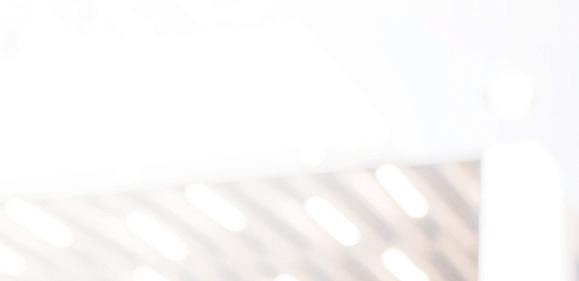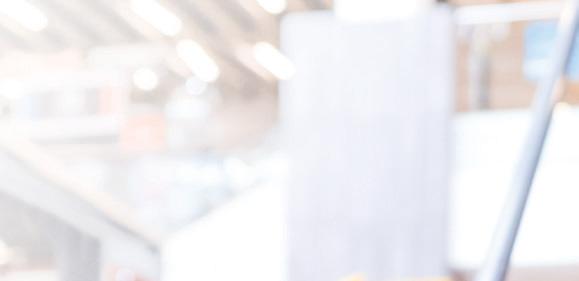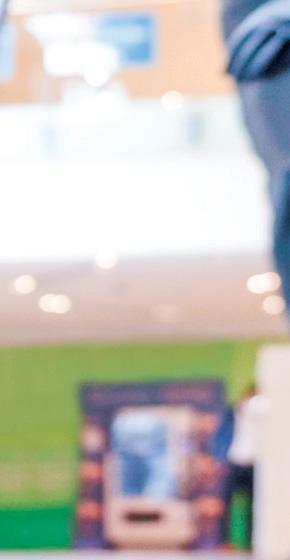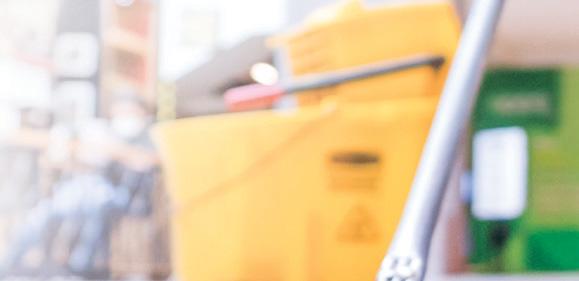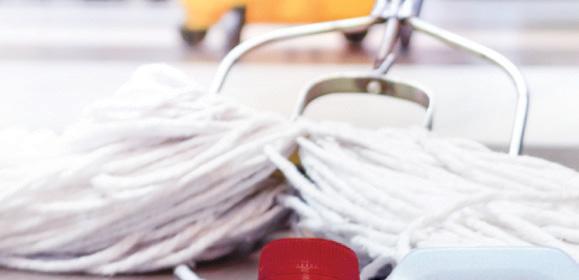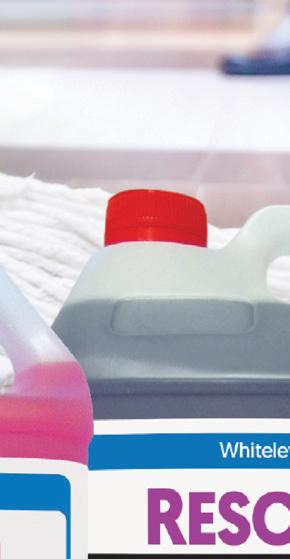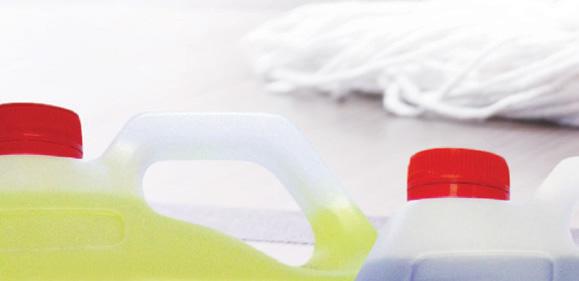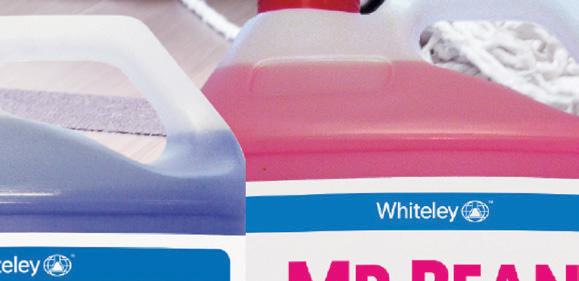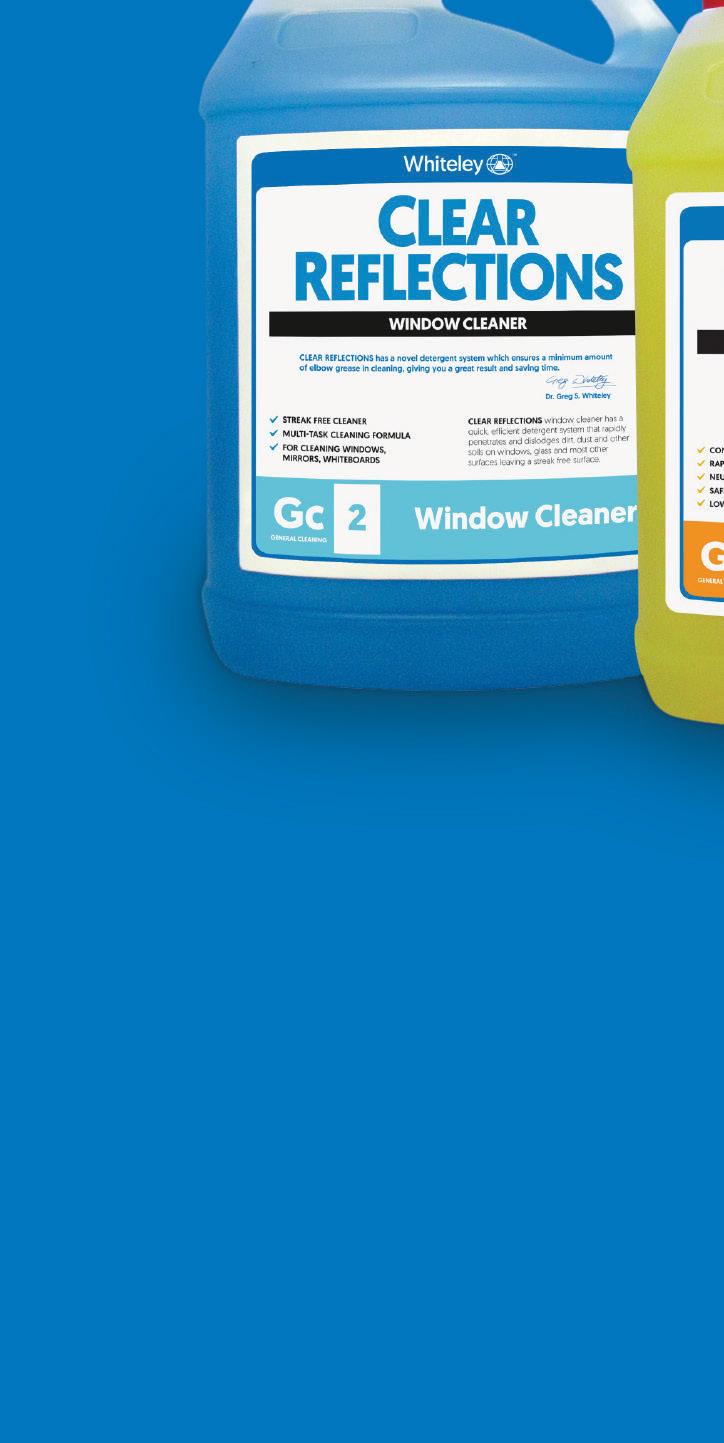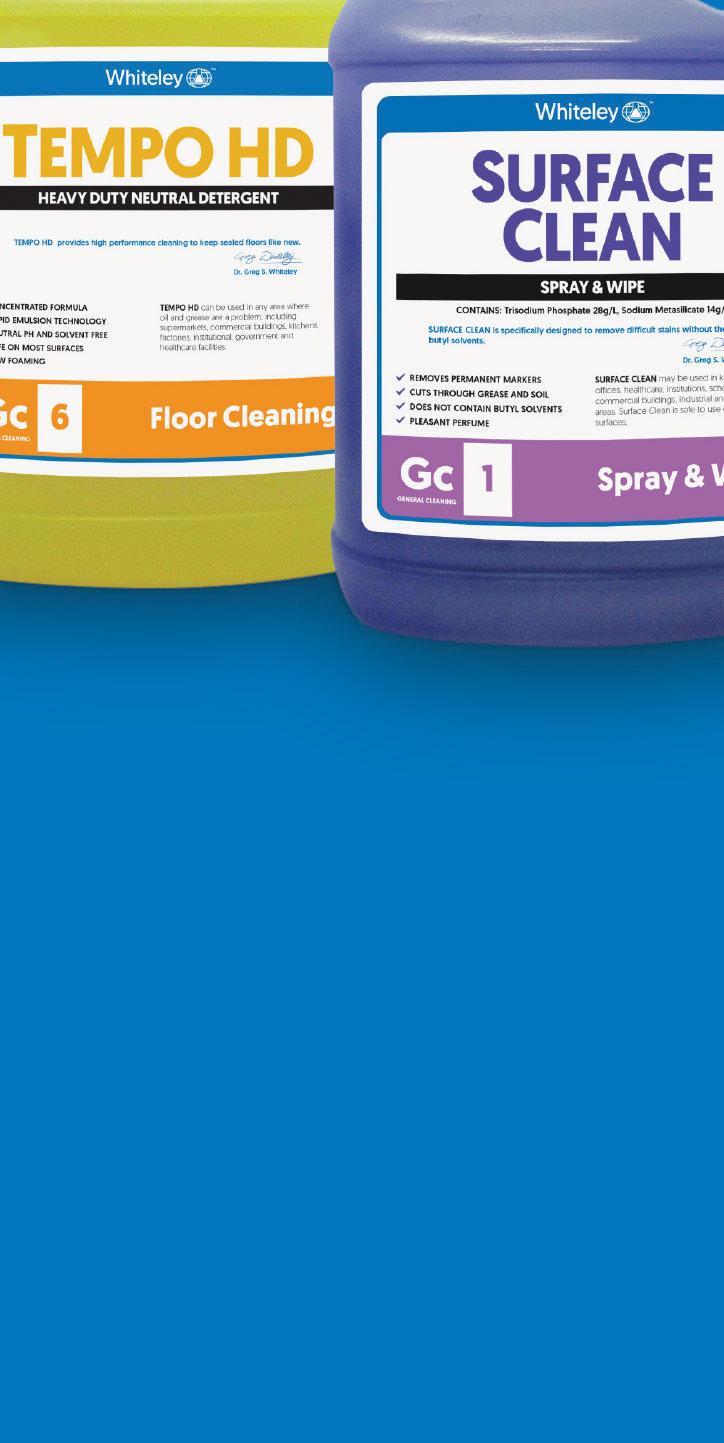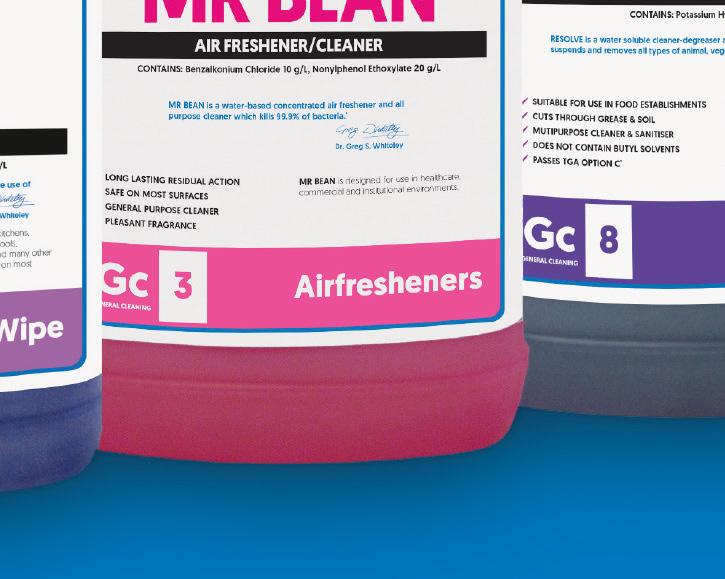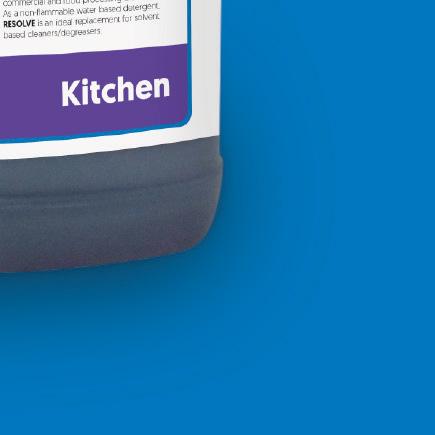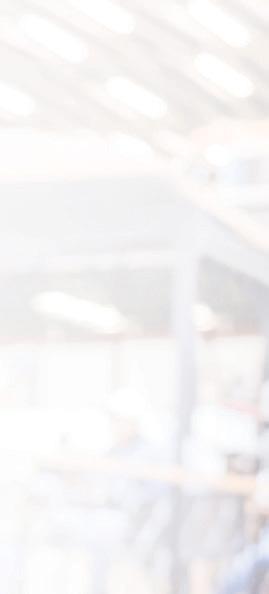February 2023


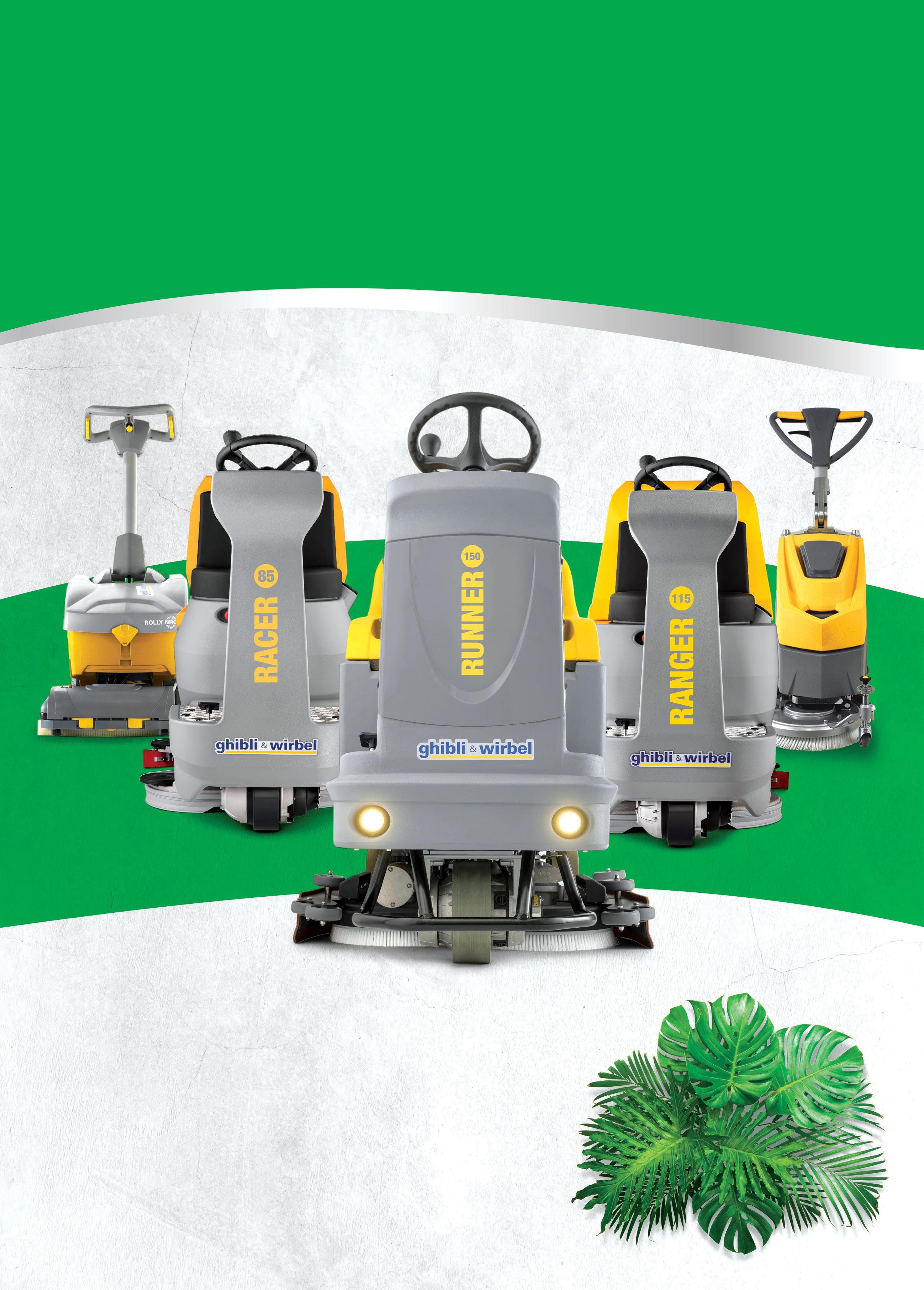

February 2023



makitasales@makita.co.nz
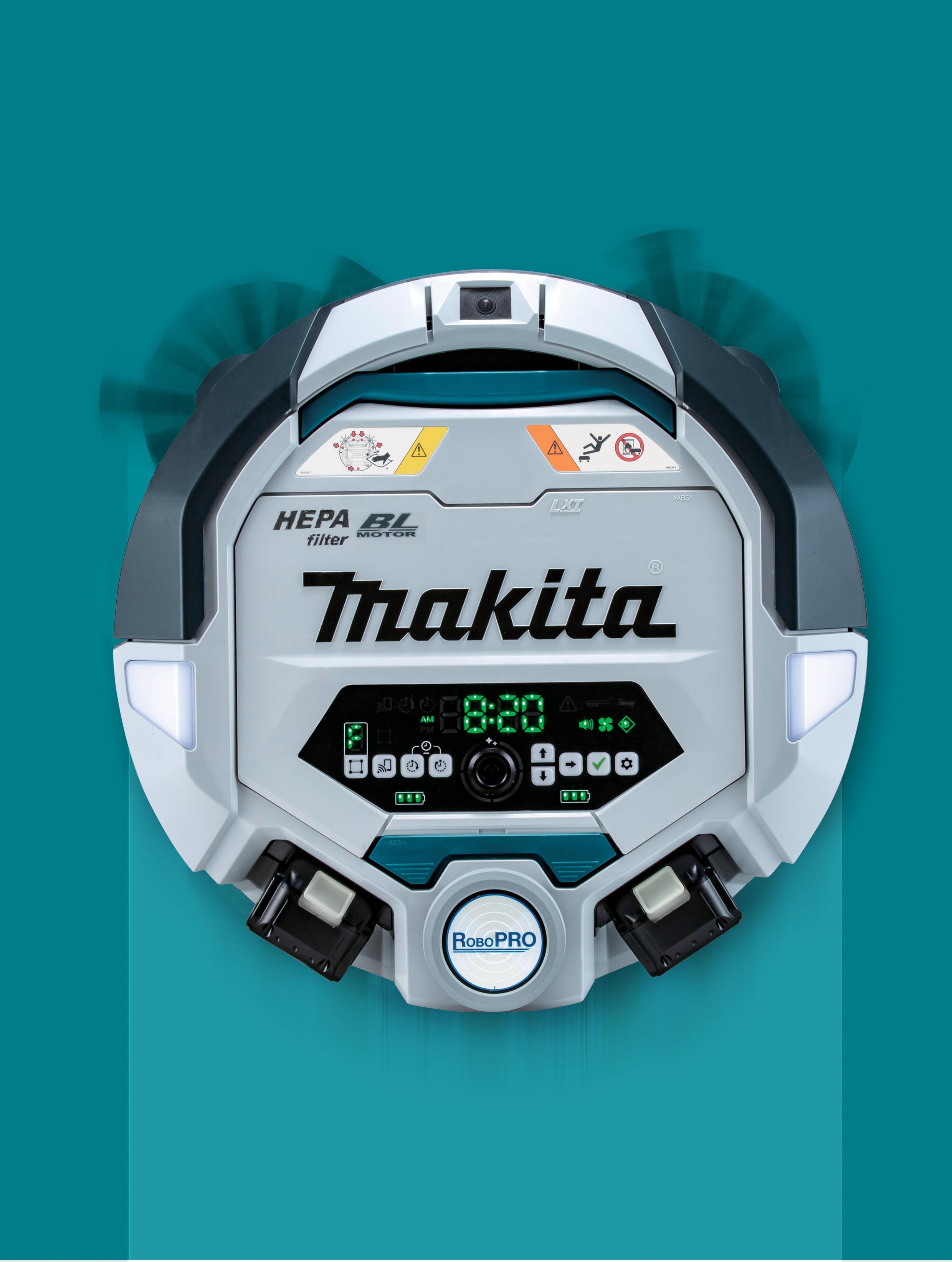 18V X2 LXT ® BRUSHLESS SMART ROBO VACUUM
Makita® LXT® Robotic Vacuums offer advanced cleaning options via the purpose built app.
Equipped with LiDAR sensor, providing a high-resolution 3D view of its surroundings
Makita® LXT® Robotic Vacuum builds on its advanced mapping capabilites with a front camera
The Robo Cleaner Pro can clean up to 600m2 equivalent to the size of two and a half tennis courts
18V X2 LXT ® BRUSHLESS SMART ROBO VACUUM
Makita® LXT® Robotic Vacuums offer advanced cleaning options via the purpose built app.
Equipped with LiDAR sensor, providing a high-resolution 3D view of its surroundings
Makita® LXT® Robotic Vacuum builds on its advanced mapping capabilites with a front camera
The Robo Cleaner Pro can clean up to 600m2 equivalent to the size of two and a half tennis courts
INCLEAN
PUBLISHER:
Cooper
MANAGING EDITOR:
Claire Hibbit
E: chibbit@intermedia.com.au
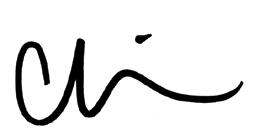
P: +61 2 8586 6140
ADVERTISING MANAGER:
Samantha Ewart
E: sewart@intermedia.com.au
P: +61 2 8586 6106
PRODUCTION MANAGER:
Jacqui Cooper
PRODUCTION ASSISTANT:
Natasha Jara
ART DIRECTOR:
Chris Papaspiros
NEW ZEALAND SUBSCRIPTION RATE:
12 months (4 issues) – NZD $44.00 (inc GST)
To subscribe call +61 1800 651 422
E: subscriptions@intermedia.com.au
INCLEAN NZ is owned by ISSA
ABN: 44 617 407 020
P: +61 2 9890 4951
A: Suite 1, Level 1, 52 O’Connell Street, Parramatta, NSW, 2150 W: www.issa.com
DISCLAIMER: This publication is published by The Intermedia Group Ltd (the “Publisher”). Materials in this publication have been created by a variety of different entities and, to the extent permitted by law, the Publisher accepts no liability for materials created by others. All materials should be considered protected by New Zealand and international intellectual property laws. Unless you are authorised by law or the copyright owner to do so, you may not copy any of the materials. The mention of a product or service, person or company in this publication does not indicate the Publisher’s endorsement. The views expressed in this publication do not necessarily represent the opinion of the Publisher, its agents, company officers or employees. Any use of the information contained in this publication is at the sole risk of the person using that information. The user should make independent enquiries as to the accuracy of the information before relying on that information. All express or implied terms, conditions, warranties, statements, assurances and representations in relation to the Publisher, its publications and its services are expressly excluded. To the extent permitted by law, the Publisher will not be liable for any damages including special, exemplary, punitive or consequential damages (including but not limited to economic loss or loss of profit or revenue or loss of opportunity) or indirect loss or damage of any kind arising in contract, tort or otherwise, even if advised of the possibility of such loss of profits or damages. While we use our best endeavours to ensure accuracy of the materials we create, to the extent permitted by law, the Publisher excludes all liability for loss resulting from any inaccuracies or false or misleading statements that may appear in this publication.
Copyright © 2023 - The Intermedia Group Ltd
Welcome to the first issue of INCLEAN NZ magazine for 2023 and our annual Industry Leaders Forum report.
Within our Leaders Forum report, you’ll read commentary from leaders across aspects of industry, discussing how they balanced the highs and lows of 2022, how the pandemic challenged their way of thinking, and how it even led some to transform the way they do business.
In this year’s edition, we reflect on another pandemic-impacted year that has once again tested the industry’s agility and resilience.
While there have been many ups and downs for organisations as they continue to navigate the disruption of the past two years, overall, the cleaning industry has managed to roll with the punches and weather the COVID storm.
However, as the industry prepares for the next wave of changes and economic impacts, what’s looking like the greatest challenge this year is recruiting and retaining staff. This unintended consequence of the pandemic has hit the cleaning industry harder than others and after speaking to leaders, it’s looking like it will continue to plague the sector this year.
This shortage of labour is anticipated to drive heightened demand for regular and thorough training, and leaders agree that businesses will need to invest in their people, products, and programs in a more robust way than ever before.
Our 2023 Leaders Forum is presented alongside trend forecasts and industry predictions from local and international thought leaders, making this issue essential reading. However, this edition wouldn’t be possible without the help of the leaders who have taken the time to share their knowledge, observations, and learnings, so thanks to all who have participated.
It’s always a personal highlight for our team putting this issue together and I hope there are some valuable insights that will help you, your staff, and your business in 2023.
Claire Hibbit Managing Editor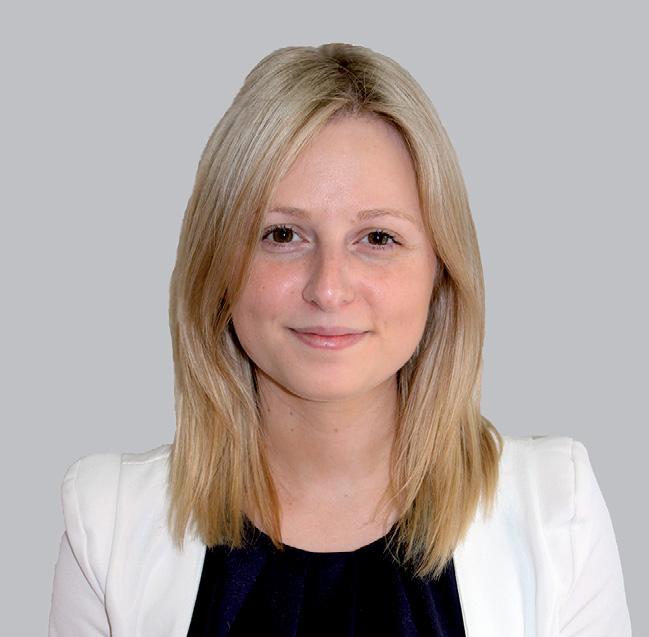
14-16 March 2023
The longest running dedicated event for the UK cleaning industry
www.cleaningshow.co.uk/london
ISSA Pulire
9-11 May 2023
The largest professional cleaning and sanitisation industry trade show in Italy www.issapulire.com/en
ISSA Show Canada
14-15 June 2023
Canada’s leading trade show and conference www.issa.com
CMS Berlin
19-22 September 2023
The international conference and trade show will be held in Berlin www.cms-berlin.de
ISSA Cleaning & Hygiene Expo
1-2 November 2023
The ISSA Cleaning & Hygiene Expo will take place in Melbourne www.issacleaninghygieneexpo.com
ISSA Show North America
13-16 November 2023
Vegas will play host to ISSA North America www.issa.com
14- 17 May 2024
The world’s leading trade show for cleaning and hygiene professionals
www.intercleanshow.com/amsterdam
www.incleanmag.com.au
Rapid Group GM steps down Rapid Group general manager Bruce Lees to depart after 12 years.
ISSA releases best practices for menstrual care solutions in public restrooms
Document provides cleaning professionals and facility managers guidelines to create a clean, healthy, and positive restroom experience.

Survey finds more than 90 per cent of real estate professionals believe smart technology and well-stocked restrooms warrants above-base rent.
Bunzl ANZ to move into 6-star GreenStar-rated headquarters
Bunzl ANZ announces science-based commitment to be net zero by 2030.
Govt seeks feedback on proposals to manage meth contamination in rental housing Government is seeking public consultation on proposals for regulation of methamphetamine contamination in rental housing.
Greater energy efficiency, better indoor air quality, and meeting ESG guidelines are top priorities by multi-national organisations, study finds.
The demand for cleaning grows hand in hand with the diversification of the areas to clean, from small office spaces to large commercial malls, from public transport areas to distribution centres. For this reason NZ Cleaning Supplies has further expanded its scrubber dryer range. Read more about NZ Cleaning Supplies’ extensive scrubber dryer range in this edition’s cover story on page 8.


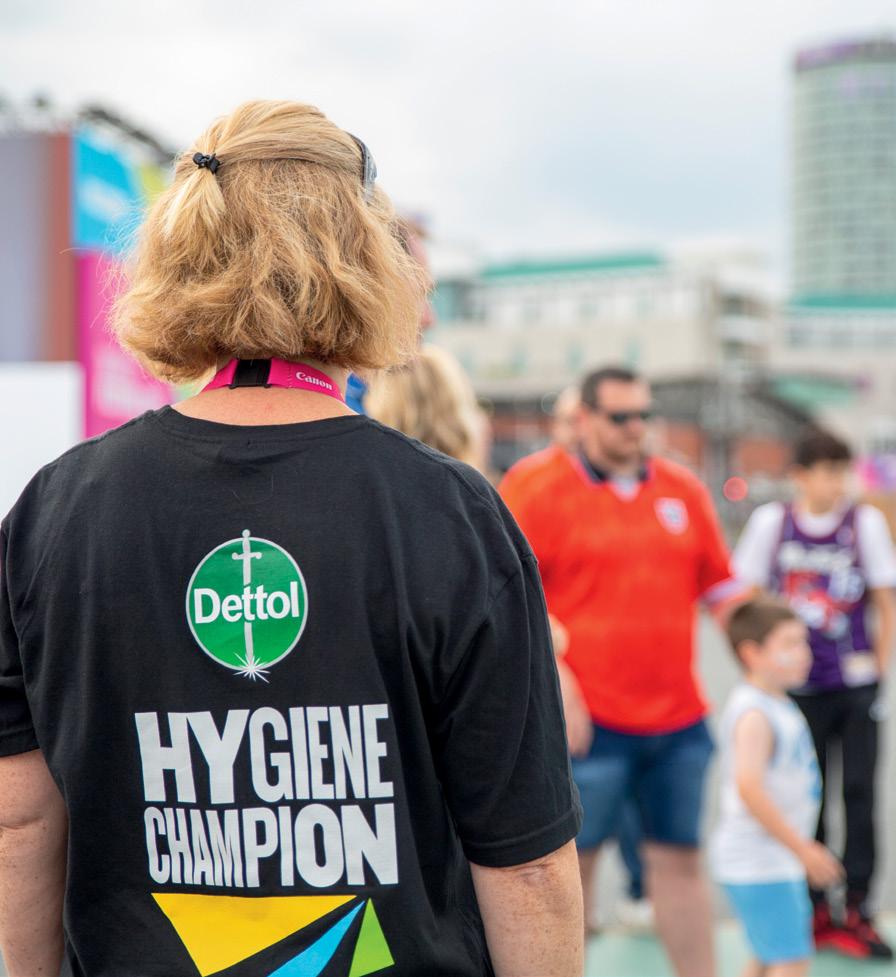
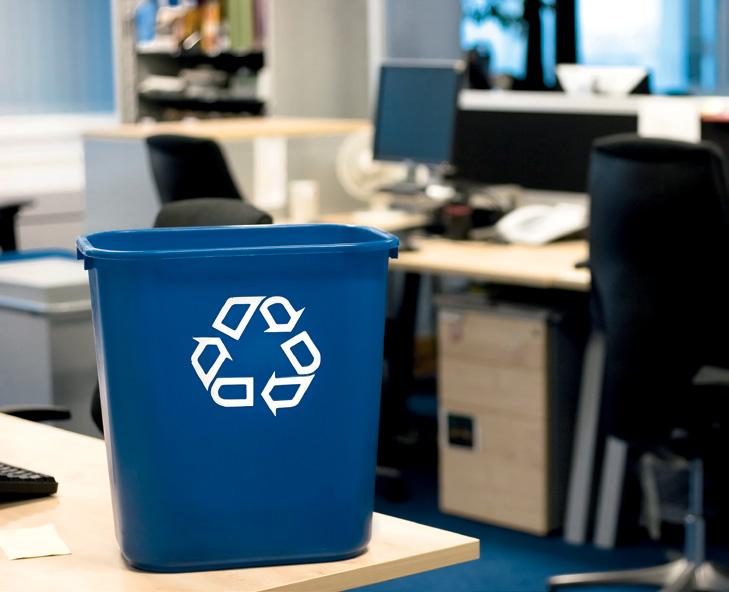

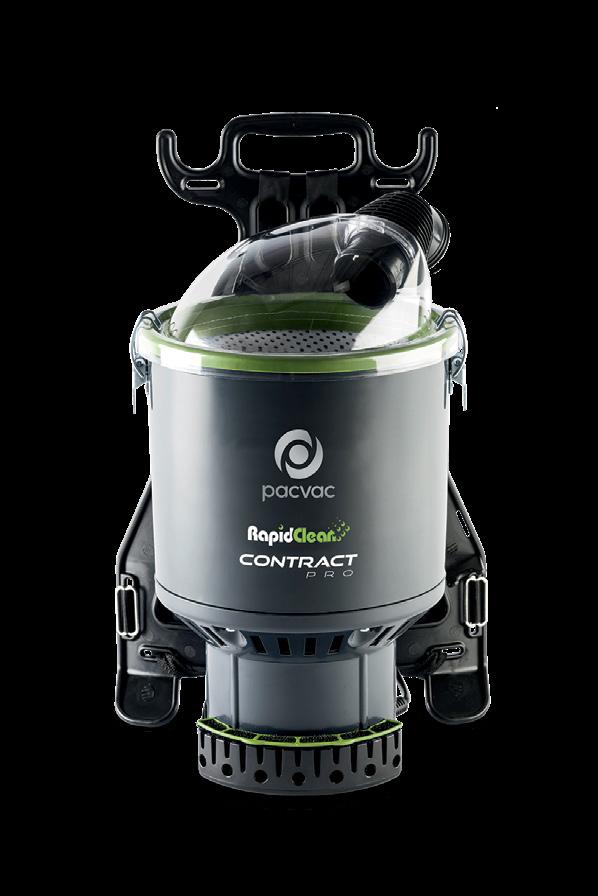
Greater energy efficiency, better indoor air quality (IAQ) and meeting environmental, social and governance (ESG) guidelines are three objectives currently prioritised by multinational organisations as they face increasing pressure to incorporate their building operations into their sustainability plans. These are among the key findings of a report released by Honeywell and Reuters.
Nearly nine in 10 respondents (87 per cent) say that achieving carbon neutrality in their building portfolio is either extremely (58 per cent) or somewhat (29 per cent) important in relation to their overall ESG goals, with only 4 per cent of respondents calling it unimportant.
“If we fast-forward to 2025, I believe carbon neutrality will be one of the top priorities for organisations, driven partly by new carbon taxation plans and decarbonising incentives,” Manish Sharma, vice president and general manager of Sustainable Buildings at Honeywell, said.
More than 90 per cent of those surveyed expect to achieve carbon neutrality across their portfolios by 2050, while 62 per cent expect to reach that goal by 2035. Only 8 per cent of respondents say they don’t foresee carbon neutrality ever becoming a reality for their portfolios.

Respondents also noted the business benefits of ramping up sustainability efforts across building portfolios. When asked which three of these benefits they valued most, they cited the following:
Complying with external regulations and investor demands: 90 per cent; with more than 50 per cent of those surveyed ranking it number one
• Increasing productivity and realising cost reductions: 84 per cent
• Improving brand image: 60 per cent
Despite their optimism, those surveyed noted several significant barriers that impede their efforts. When asked which three obstacles most hinder progress, respondents reported the following: managing costs (88 per cent), measuring sustainability or a lack of expertise (60 per cent), and gaining senior leadership support (50 per cent).
The survey also revealed that companies are investing strategically to accelerate decarbonisation and improve overall building performance.
While respondents note a wide range of specific efforts, a substantial majority (80 per cent) mention an on-site energy management system as one investment they’ve made to enhance the sustainability of their building operations.
Benjamin Nepgen has joined the Proquip team as the company’s Wellington-based Lower North Island regional business manager.
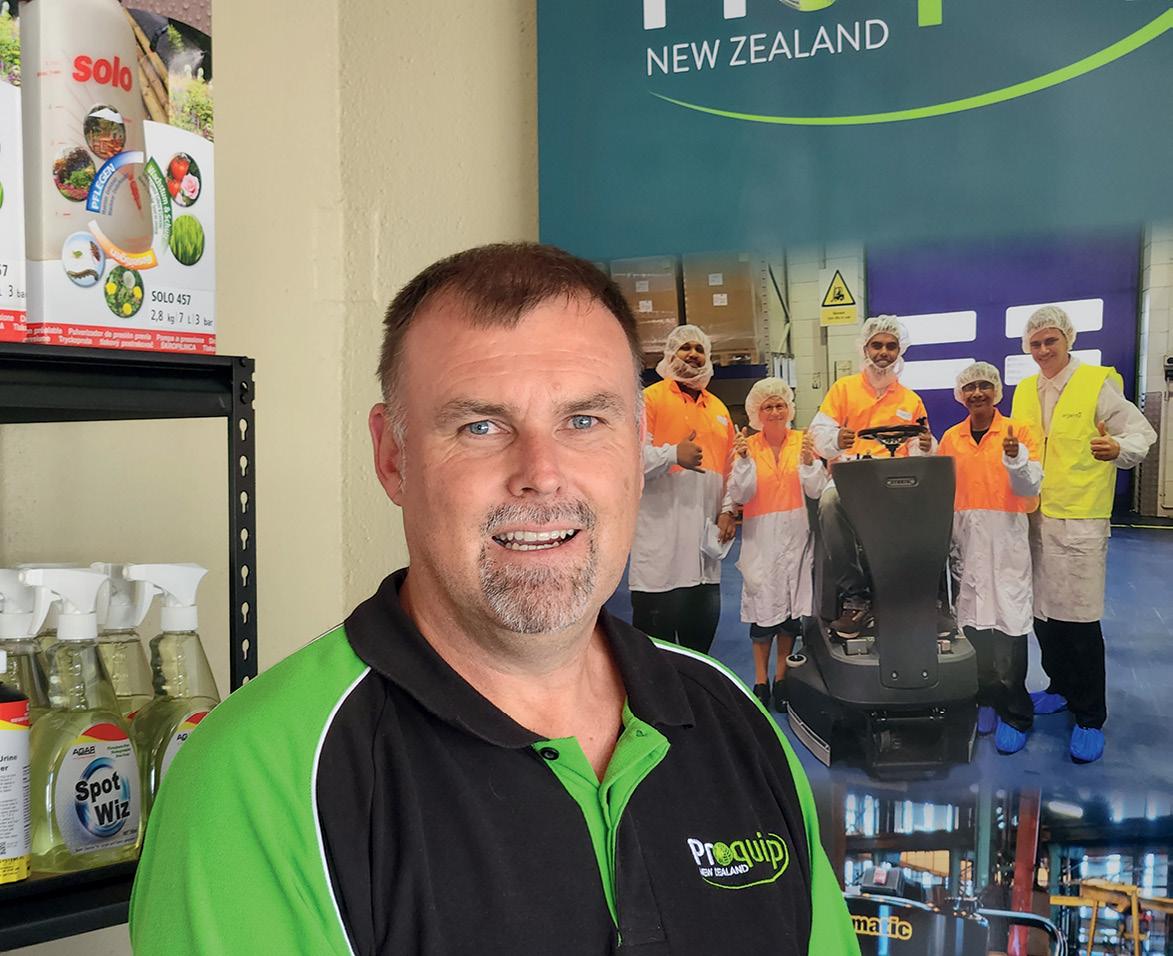
With more than 25 years’ experience in business development in manufacturing, ICT, retail, and other service delivery arenas, Nepgen brings a wealth of experience to Proquip and its Lower North Island customers.
With his technical and practical skillset, he’s able to guide, train, and support customers from assessing the best performing equipment for their needs to teaching them how to operate and maintain to get the very best from their investment.
“Having the right team on the ground is extremely important in this industry. At Proquip, our regional business managers are not just there to sell our exceptional range of equipment – they are there to help, to educate, support, train, and advise our customers on the right cleaning equipment and programmes specific to their unique needs,” said Kerry Boon, sales and marketing manager at Proquip.
Nepgen’s extensive resume includes coaching, pastoring, public speaking, and charitable work.
While Nepgen is new to the cleaning industry, according to Proquip, he’s loving the challenge and loves learning all about our range of machinery and equipment. Results and a positive outcome are what he really focusses on, and that shows in his eternally optimistic outlook.
“When you trust the products and you get to really know the customer, then you’re not just fulfilling a need, you’re solving a problem, providing a conscientious, positive solution for a mutually beneficial outcome and experience,” said Nepgen.
“Anybody can make anything out of any situation – it’s all about attitude and my attitude is awesome! I’m really passionate about making a good outcome, it’s different and new but I love a challenge – be yourself and be positive. Nice environment, lovely professional helpful people, great team, everyone jumps in to help and support, collaborative and family atmosphere.”
NZ Cleaning Supplies continues to expand its footprint across the country, with the company set to open a new store in Christchurch.
“We take great pleasure in announcing that we will be opening our new branch in Christchurch in order to cater to the increasing demands of our customers,” said Ebin Sebastian, managing director of NZ Cleaning Supplies.
Headquartered in Auckland, NZ Cleaning Supplies offers sustainable cleaning and hygiene solutions for commercial, industrial, food service, education, and healthcare sectors.
NZ Cleaning Supplies’ extensive range of products including janitorial supplies, window cleaning supplies, cleaning consumables, paper products, chemicals, and protective and safety equipment.
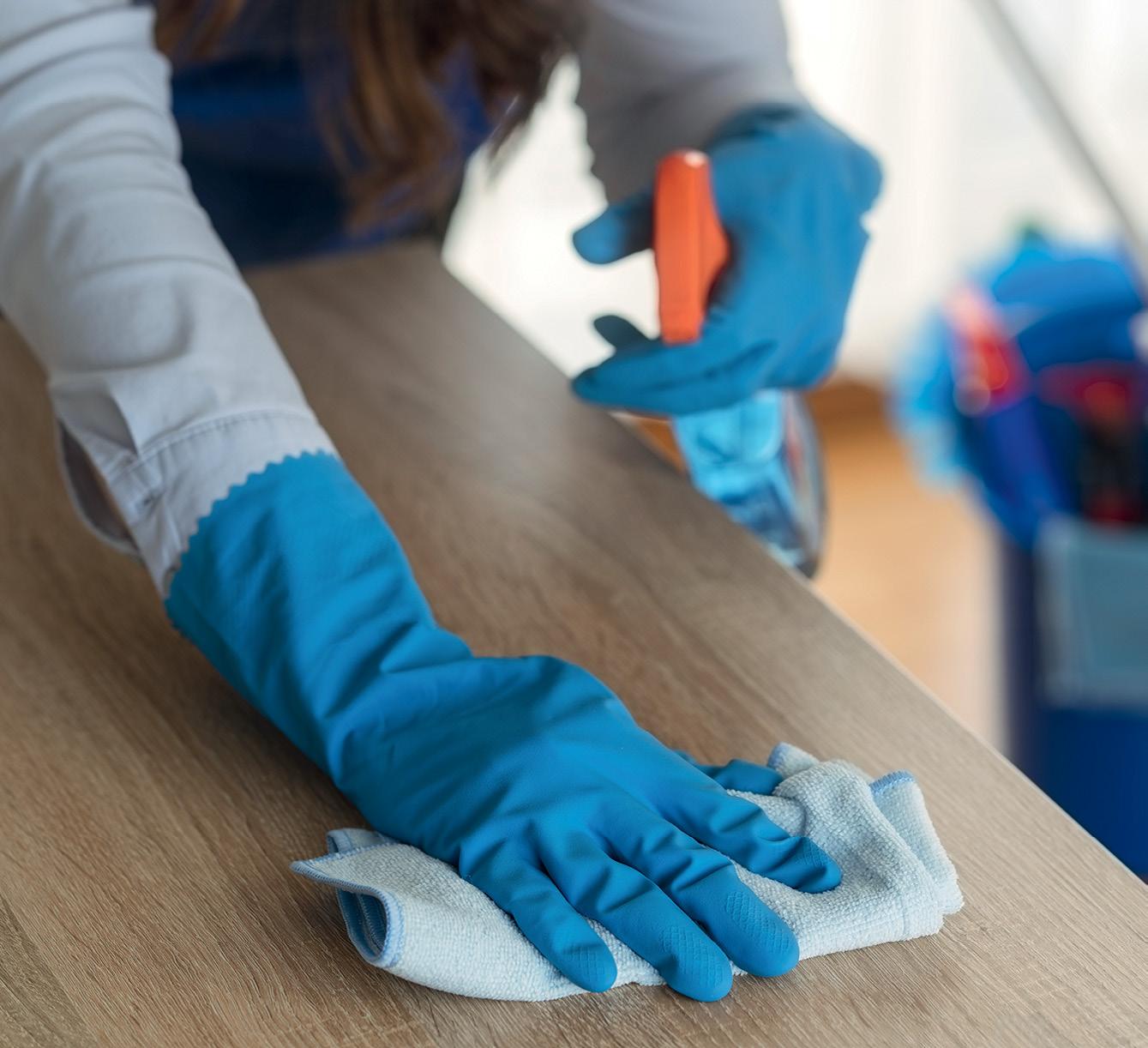
“This new venture has been made possible by our customers’ immense support and continued interest in our business. We promise to maintain the same quality of service and deliver everything that our patrons need,” said Sebastian.
“The staff and management at NZ Cleaning Supplies forever endeavours to serve our customers better.”
NZ Cleaning Supplies currently has multiple locations across New Zealand including Auckland and Wellington.
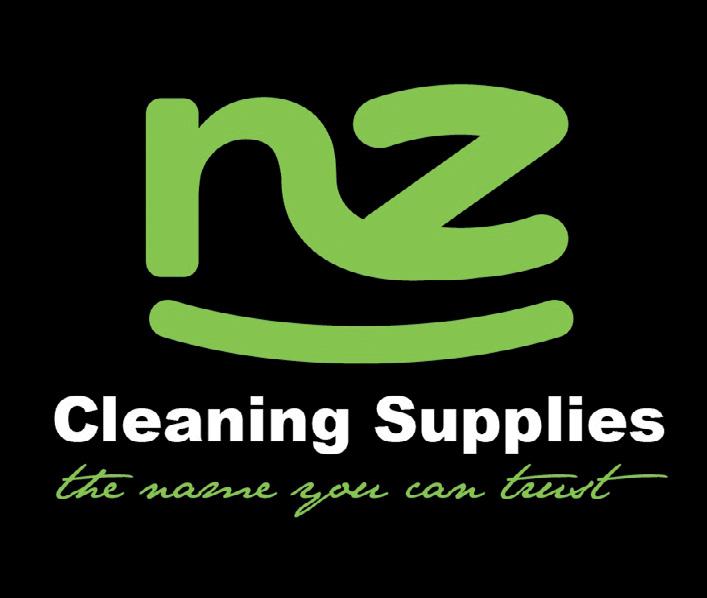
Poor hygiene standards in public spaces and overall worry for global health threats are just some of the barriers to wellbeing identified in the Global Hygiene and Health Survey 2022 conducted by Essity.
The findings are based on responses from more than 15,000 people worldwide with the aim to find healthier solutions for future generations. The Global Hygiene and Health Survey 2022 focuses on the future of wellbeing as well as the knowledge gap around issues of hygiene and health.
Joséphine Edwall Björklund, senior vice president, communications at Essity, said the survey was conducted by Essity to raise awareness of the importance of hygiene and health and its link to wellbeing.
One of the surveyed areas was public spaces. When it comes to hygiene standards in public spaces, one in four say they feel comfortable about hygiene standards in public bathrooms and three in 10 in public transport.
Out of these, seniors feel the most uncomfortable about hygiene standards in public spaces, especially in public washrooms as only 13 per cent of people aged 66-80 years old claim
to feel comfortable about hygiene standards in these venues.
A majority also expressed higher expectations on the hygiene standards in public bathrooms after COVID-19. Furthermore, there are higher demands on the cleanliness, accessibility and smart solutions such as connected washroom devices.
Improving hygiene standards in public places may also have other positive effects. According to the study, 38 per cent of the respondents say that improvement of hygiene standards in public spaces would make the biggest difference in helping to stop the spread of bacteria resistance to antibiotics.
In fact, the worry about antimicrobial resistance (AMR) has increased since 2019 when 46 per cent expressed concern. Today, more than half of the respondents (54 per cent) are concerned of AMR as a threat to public health where they live.
This can be compared to pandemic outbreaks, which 63 per cent are worried about, a slight decrease since 2020 (70 per cent), but still higher than prior to the outbreak of Covid-19 when only 43 per cent experienced this as threat to public health.
The demand for cleaning grows hand in hand with the diversification of the areas to clean, from small office spaces to large commercial malls, from public transport areas to distribution centres. For this reason NZ Cleaning supplies has further expanded its scrubber dryer range.
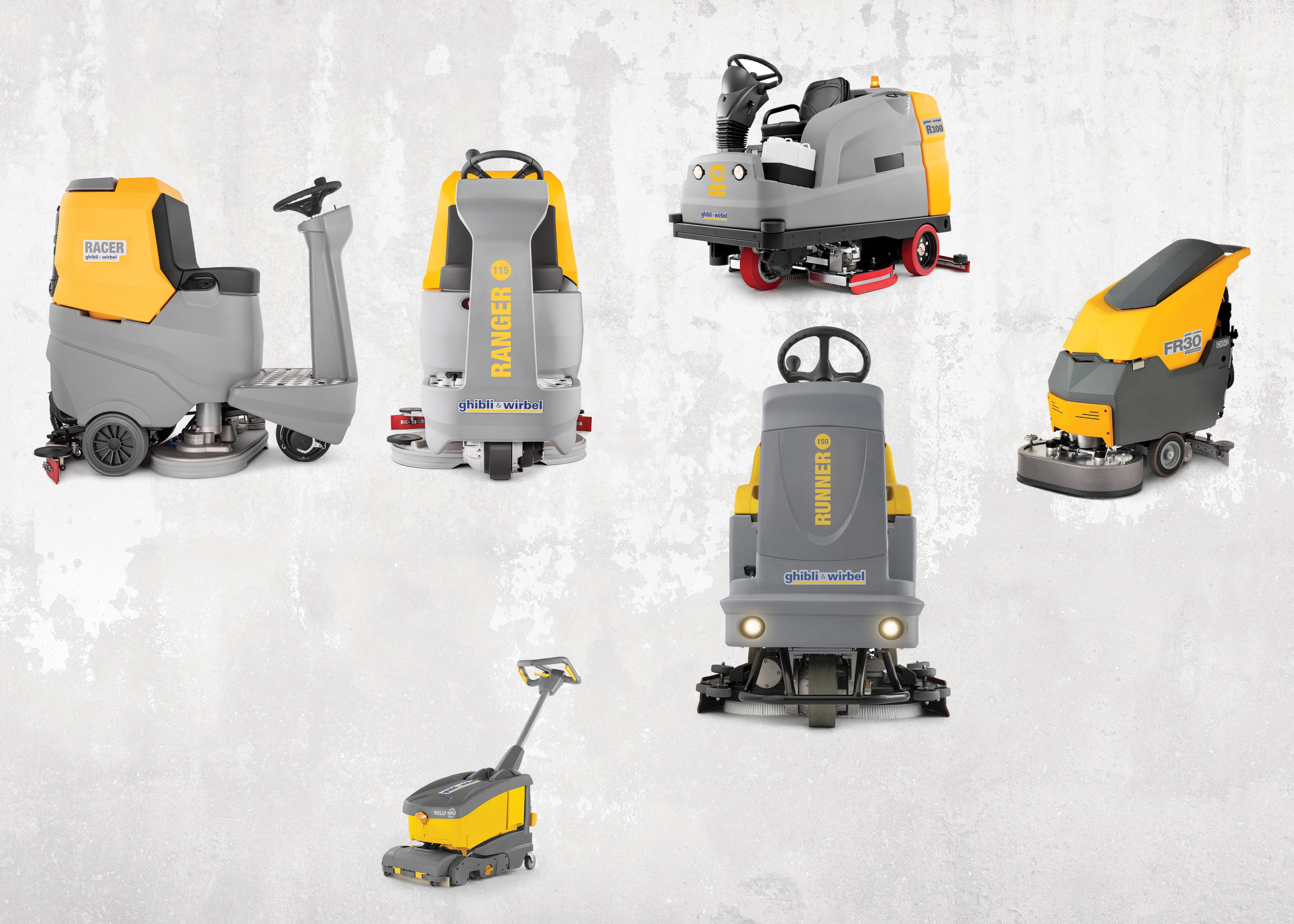
Racer R 85 FD 75 is the ride-on scrubber dryer designed for cleaning operations in medium areas. 85 litre capacity and 750 mm of cleaning width ensure the best cleaning performance. Furthermore, the low noise level makes Racer perfect for day cleaning in all the environments (hospitals, rest homes, schools) where silence is a must.
11 liters of tank capacity, its dimensions, combined with a special handle (patented) and swivel wheels allow Rolly NRG to go and work in small areas. Top cleaning and drying results. A start & go machine: no training required, everybody can use Rolly: - all the main functions can be managed by the intuitive control panel;coloured levers and knobs clearly help the user preparing the machine for work or while using it; - effortless maintenance.
Ranger R 115 FD 85 is the ride-on scrubber dryer designed for cleaning operations in medium and large areas. 115 litre capacity and the large cleaning width (850 mm) ensure a productivity of 5000 m²/h. . Ranger is easy to use, no training is required and even daily maintenance operations are quick and easy. That is why even the untrained operators are able to work with this professional scrubber dryer.
Runner is Ghibli & Wirbel’ sturdy, powerful and extremely reliable ride-on scrubber dryer ideal for any kind of cleaning task, above all the long and heavy ones. Remarkable scrubbing width, combined with high productivity (up to 5000 m²/h), guarantees the perfect solution for large areas cleaning.

R R 300 FD 130 is the ride-on scrubber dryer designed for cleaning operations in large areas. 300 liter capacity and the large cleaning width (1300 mm) ensure a productivity of 10400 m²/h. Powerful, sturdy and reliable, R 300 is able to tackle the most difficult and stubborn dirt and it is ideal for wide environments such as car parks, warehouses, production sites and logistics.
FR 30 represents something unique in the cleaning market. First of all the new design, which makes FR 30 a masterpiece of aesthetic and ergonomics. Then 30 litres of tank capacity, an high manoeuvrability and above all a complete set of integrated solutions make FR 30 suitable for any environment and surface. Silent mode” function: ideal for day cleaning and in all the environments (hospitals, schools ) where silence is strictly required.

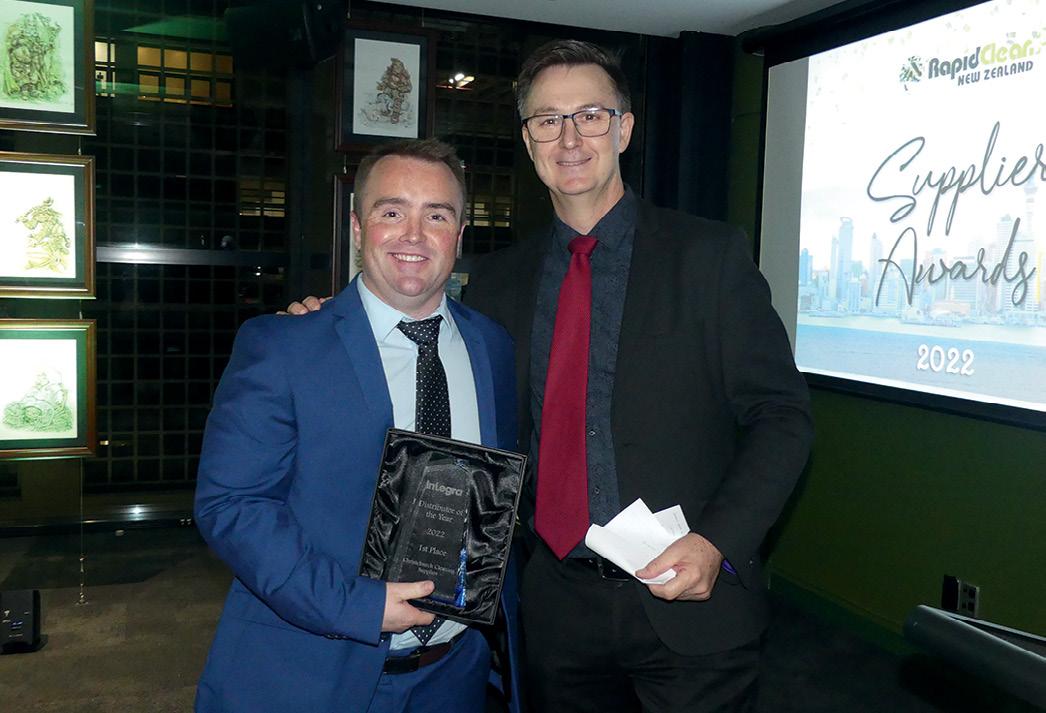
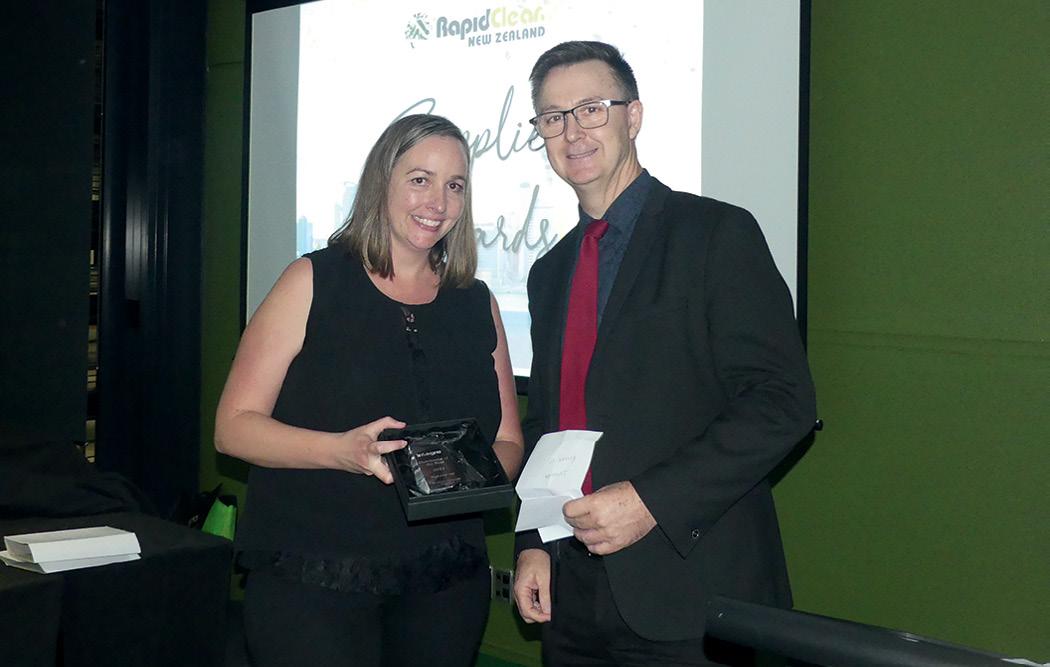
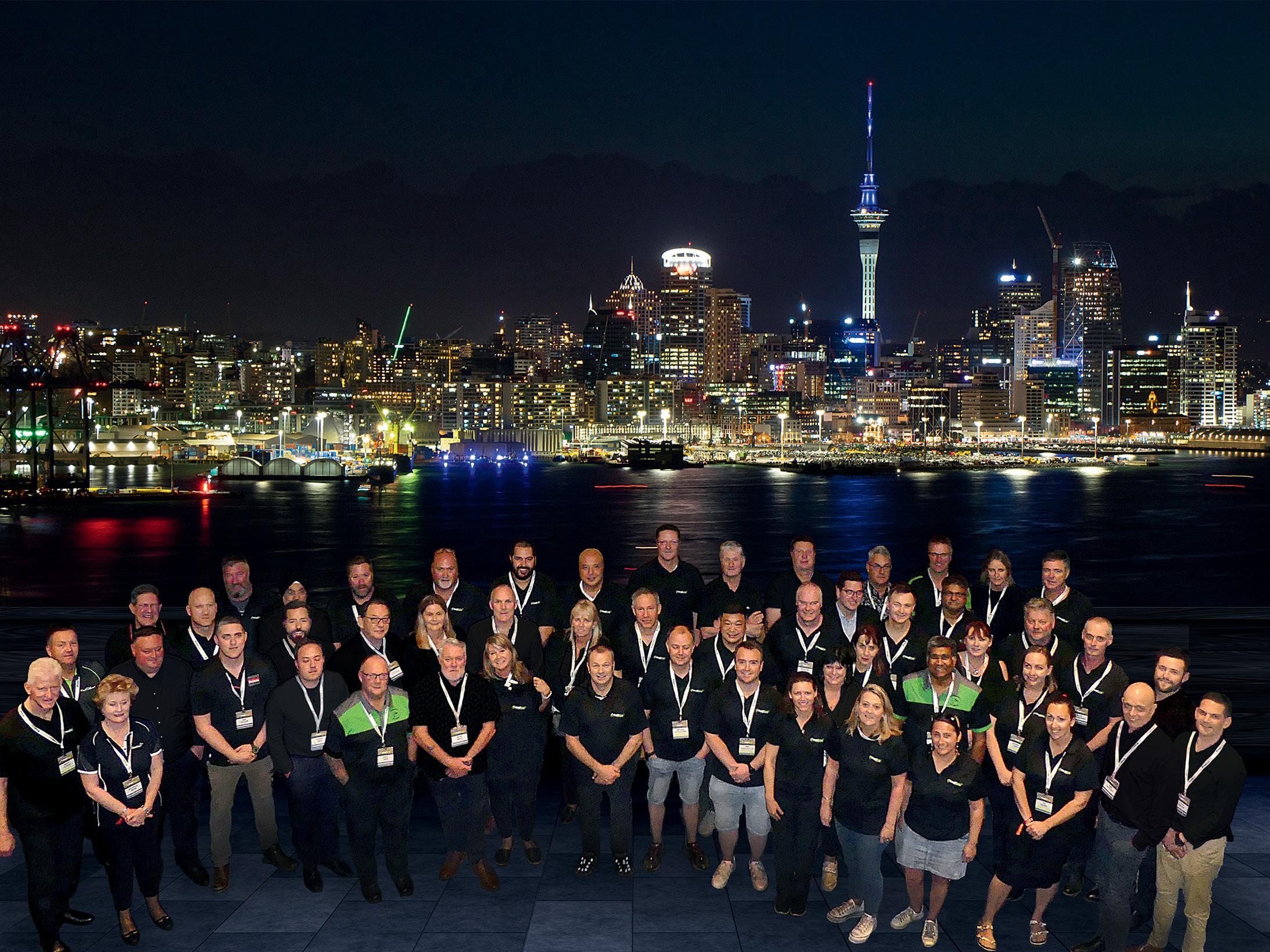
After successfully exhibiting at CleanNZ Expo, RapidClean New Zealand members and staff gathered together for the first time in four years for the co-operative’s annual conference.
The event, held at the Sky City Conference Centre, commenced with a welcome address by Geoff Hughes, RapidClean NZ manager; followed by presentations from Bruce Lees, GM RapidClean; and David Thyne, RapidClean board chairman; and new board member, Lee-Ann Kemp. Bruce Carr, owner of Web Ninja also gave a presentation on the power of online trading.
Following the presentations, members entered sessions of ‘speed dating’ with one-on-one interviews with preferred suppliers.
“These sessions proved to be exceedingly popular with members and suppliers,” said Hughes.
The conference concluded with RapidClean New Zealand’s gala award dinner, where Member of the Year and Supplier of the Year were announced.
The event include guest speaker, former All Blacks Ian Jones.
“Ian provided an insight into the value of working together as a team, along some very funny stories that amused our audience,” said Hughes.
Member of the Year was awarded to Waikato Cleaning Supplies, while Filta Cleaning Products was named Supplier of the Year.
“Congratulations to all the winners and finalists of this year’s awards.”
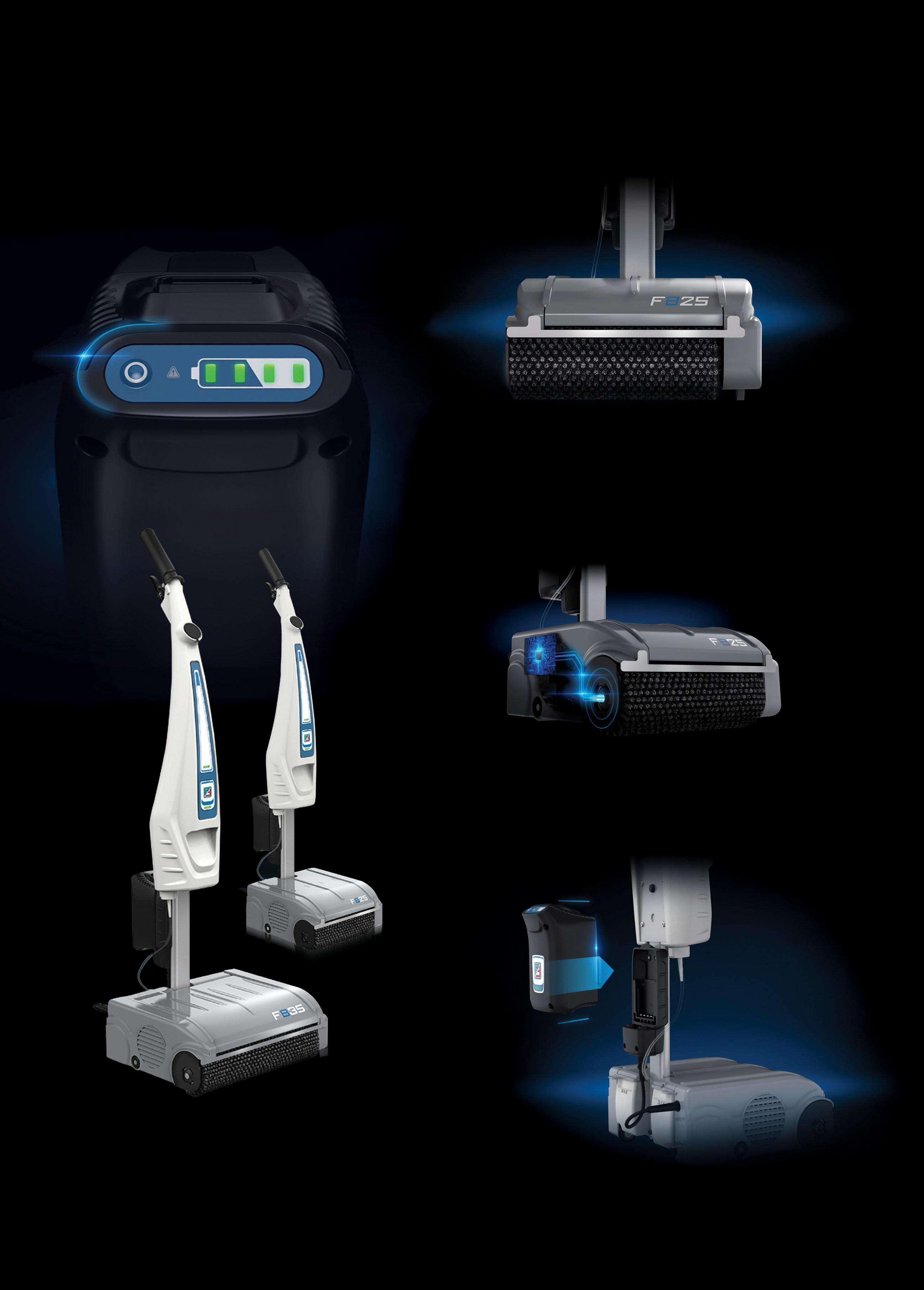

After a dramatic three years for the cleaning and hygiene sector, 2023 shapes as a critical and exciting year full of opportunities as the impact of COVID-19 starts to ease. INCLEAN speaks with industry leaders to identify key issues that should be on the radar for business owners, executives and employees in the next 12 months.
More and more facilities are starting to measure indoor air quality (IAQ) – and it is not before time, according to Dr Gavin Macgregor-Skinner, senior director of the Global Biorisk Advisory Council (GBAC).
The Washington DC-based infectionprevention expert says the importance of managing IAQ for health and safety
reasons is well understood as a result of the pandemic.
“COVID-19 has made it an issue,” he says.
“If you go back to the beginning of the pandemic it was all about filtration, but now with all the technology we have it’s more about air purification.”
Given that about 99 per cent of harmful particles in the air cannot be seen, Dr Macgregor-Skinner says measuring
IAQ is crucial. Promisingly, a range of cost-effective monitors are available on this front.
“These devices are about the same size as a smoke detector. They’re very affordable and they give you real-time data on the air quality for 10 or 12 different airquality parameters.”
As well as being ideal for facilities such as airports, schools and hotels, Dr
Macgregor-Skinner is encouraged that such devices work well, too, in homes and small business settings.
“It’s doable and easy to interpret.”
He adds these devices are simple to set up and keep track of pollutants such as carbon dioxide, total volatile organic compounds, carbon monoxide, radon, formaldehyde and particles such as allergens, pollen and dust.
“Particulate matter are a mix of particles and droplets in the air, and the World Health Organization considers exposure to PM2.5 or less (fine particulate matter with a diameter of two-andone-half microns) which cause cardiovascular and respiratory disease and cancers as the world’s single biggest environmental health risk,” MacgregorSkinner says.
For Steve Ashkin, founder of The Ashkin Group and renowned for his green-cleaning advocacy work in the United States, 2023 shapes as an important year to continue the fight for sustainability in the cleaning sector.
“I’m going to do my best to not only make sure this issue doesn’t go away, but that it really flourishes,” he says.
“Now that we’re post-COVID, this is the time to establish the sustainability agenda and go beyond all the green-cleaning stuff and the innovations that have taken place in the past few years. Sustainability is the next issue that I hope our industry will be paying attention to.”
Ashkin says a priority for him will be to clearly articulate that sustainability is different from green cleaning.
His sustainability drive will include focusing on how organisations act and operate, the ethical treatment of employees, energy and water conservation, superior fuel efficiency for fleet vehicles, as well as social issues such as fair wages, training and diversity.
With an eye to the future, Ashkin has been appointed to lead ISSA’s Global Sustainability Initiative.
He says it is critical sustainability campaigns target and educate developing countries where sustainability efforts are in their infancy.
“If we’re serious about doing something to make our world better, those are the people I want to work with,” he says.
“We’re planning on mentoring them, helping them transform their companies and giving them a competitive advantage.”
In this role, Ashkin says he will not be afraid to call out green washing.
“A lot of people want to believe what they’re doing is perfect and they don’t want anyone saying, ‘Well, that sounds like a bit of greenwash to me. Where’s
the data to support all these claims you’re making?’ So, if we want to genuinely make a difference, that’s what I’m determined to do.”
In tandem with sustainability, it is clear that environmental, social and governance (ESG) issues will also continue to be a major talking point in the next 12 months.
Vanessa Watson, founder of business consultancy Give and Take Co, advises clients on sustainability and ESG.
She expects tougher legislation around singleuse plastics to result in a significant packaging and materials overhaul for the cleaning sector. This anti-plastics push will be part of the evolution of a regenerative economy that reduces landfill.
Watson acknowledges that such changes may be a challenge for some cleaning companies and product distributors because alternatives to plastics are not yet ubiquitous. The storage of harsh chemicals could also still require a reliance on more traditional packaging.
However, she says momentum for such reforms is unstoppable and requires a change of mindset among industry leaders, even if it comes with financial imposts in the short term.
“There’s going to be a cost to this and that’s the biggest challenge facing industry leaders today –accepting that the changing way that we must do business may cost us some money.”
Business advisor Kathryn Groening, who is an ISSA Oceania education and training consultant, believes an embrace of ESG is crucial to future business success.
“It works, it’s proven. and it’s a way for a company to be successful and still do good at the same time,” she says.
Groening encourages cleaning enterprises to partner with a social or indigenous enterprise. This engenders great spirit within a business and employees “start telling their friends about it – that my company is doing this and that”.
“Most people don’t talk a lot about the day-to-day stuff in their company, but when they can talk about things that are meaningful to them, it improves morale, productivity and efficiencies.”
The rollout of new technology and the spectre of automation will continue to be a topic of debate in the next 12 months and beyond.
Brant Insero, ISSA senior director of education, training, certification and standards, expects two areas of tech to dominate:
Robotics – “The labour shortage is still very real for our industry globally and will continue to be a struggle for the foreseeable future,” Insero says.
“
Simply telling your clients that you are cleaning hygienically will no longer cut it. You have to prove it.
Quality control technology – he predicts an increase in usage of inspection software, plus ATP meters that are used for detecting contamination on surfaces and in water.
Insero says validation of any services being performed will be critical in the competitive world for cleaning contractors.
“As it relates to in-house services, technology such as ATP and others will help their internal stakeholders recognise strong performance.”
Insero says the cleaning industry will continue to evolve courtesy of new methods that demonstrate to stakeholders the value of clean surfaces, clean air, and clean water.
“Invest in and embrace new technology, or technology that has been available but not utilised yet,” he advises.
“If we stand in fear, our competition will walk past us and thrive from their ability to leverage technology to their advantage.”
While organisations should take advantage of appropriate technology, it is wise to show a degree of skepticism and commit to testing.
“Organisations can’t believe everything they hear, but they should play the role of myth-busters. Test technology with open arms and see for yourself it will fit within your organisation.”
Given that housekeeping and cleaning staff have been engaged in “life or death” work during the pandemic, the need for firstclass training is obvious.
However, Smarter Skills head trainer
Lesley Jones says too often cleaning employees are under-trained and under-prepared.
“It’s a systematic approach to training that’s lacking and which hasn’t been enforced in a way that it should have been,” says Jones, who has more than 30 years’ experience in health and aged care as a registered nurse, clinical educator and facility manager.
Many companies are relying on contract cleaners, but managers are so overburdened with work that they do not have the time to check if their suppliers are doing the right thing.
Jones hopes this flawed approach is rectified in 2023 and that appreciation for cleaners continues to grow.
“Generally speaking, everyone wants to do their best, but it’s about recognising housekeeping staff as some of the most valuable resources that we’ve got. We too often think of them as just cleaners and they’re not.”
She notes, for example, that cleaners in aged care settings often have to liaise with dementia patients and other people as they compete their work tasks.
There is an appetite for growth in the cleaning sector, according to Groening. This will translate to an emphasis on a range of business fundamentals, including improving operational processes, streamlining cash flow and applying a HR lens to training, workplace safety, employee wellbeing and recruitment and retention.
“It’s critical we retain our staff and training is key to that,” Groening says.
“Even the correct induction process will help you keep people and that will be one of the keys to success.”
In other areas, Groening expects supply chains to again be an issue of importance in 2023. She advises being transparent about manufacturing and distribution challenges, and aligning your business to reliable, trustworthy and ESGcompliant partners.
“If you have amazing supply-chain partners they become part of your business. But if you cherry pick partners and say, ‘Oh, I can get this product for 10c cheaper, which could equate to a few
Invest in and embrace new technology, or technology that has been available but not utilised yet. If we stand in fear, our competition will walk past us and thrive from their ability to leverage technology to their advantage.
thousand dollars over a year – you can cause overall damage to relationships and your business.”
Meeting supply-chain partners frequently is smart business, according to Groening, so you can tell them if your business’s usage rates have gone up or down and if any changes are required.
“For any effort you put in, you’ll get that back tenfold, particularly if you’re importing and make sure your supply chains and customers are okay.”


While many economists believe Australia and New Zealand will avoid a technical recession in 2023, accountant Brad Horan says there is a feeling among many businesses that trading conditions are tough, nevertheless.
He believes one of the big challenges for cleaning businesses will be managing pricing in an environment of soaring inflation and rising interest rates.
“Prices have gone up and, even if inflation goes [up] tomorrow, the prices are not going to go backwards,” says Horan, a director at business advisory consultancy Lucrature, which services commercial cleaning businesses among other firms.
“There’s a real challenge for people to understand when and how they can pass those costs back on to their clients, or how they can optimise their business to absorb some of those costs.”
One option is to drive business efficiencies to push down costs. Another is to change pricing models to ensure they are more value-based for customers.
Horan suggests offering different services packages that come with low, mid-range and high-end quotes, rather than just giving clients one take-it-orleave-it price.
“What a lot of cleaning businesses do is come in with one quote and they don’t really give options to customers. They’re really missing out on opportunities if they
do that because you don’t always know where the customer sits.”
Businesses should be seeking to improve cash-flow through measures such as finetuning the collection of outstanding debts.
“A lot of clients don’t do that well,” Horan says.
With immigration levels down substantially and COVID-19 causing ongoing sickness issues and absenteeism in the workplace, staff shortages are again expected to be a problem for the cleaning sector in 2023.
Jones says this is especially likely to be so in the aged care sector, where work requirements can be demanding, while exposure to viral infections is often high.
“The biggest challenge will be employing and retaining staff that fit into this new arena of cleaning,” she says.
Code: CONPRO
Contract Pro provides strong suction power driven by the 1300W motor high productivity when deep cleaning in medium scale commercial environments.

The hi-flow filtration and sealed disposable SMS dust bag offers the 4 stages of filtration, improving indoor air quality.
1300 Watt Flow Through Motor
Noise level (at 1.5m) 66dB(A)
55 Litres P/ Sec Airflow Rate
Lightweight (4.6) kgs
Capacity 5L
Ergo Padded Harness + Waist Band
Cable restraint - Short IEC Lead
Premium 18M Orange Extension Lead
4 Stage Filtration - High flow filter
2 Year Body and Motor Warranty
Jones advises looking after your staff in ways that suit both the employer and worker. “For example, staff need flexibility and a decent take-home pay. They need a sound job role with up-to-date training. They also need some training and experience of working with elderly clients, especially those with changed behaviours.”
With regard to wages, Jones says cleaning staff are fulfilling crucial hygiene services, in addition to a social role at aged care and retirement facilities, where they often have to engage with patients in rooms.
“That’s a big role and should be paid well,” she says.
Horan agrees that there is no quick fix for the staffing crisis in the cleaning sector. He says COVID-19 has convinced many workers to switch careers, while immigration inflows are still slow.
“We’ve got a smaller workforce to support a larger economy and that’s not going to go away tomorrow.”
To woo staff, Horan suggests trying to give people a sense of purpose in their job and allow staff to be part of the business. Measuring job happiness and outcomes can also be invaluable.
What companies cannot do is be complacent and sit on their hands.
“In the past the cleaning industry has expected a high turnover and thought they’d pick up people who needed work and burn them out and then get more employees,” Horan says. “But there aren’t any more.”








Simply telling your clients that you are cleaning hygienically will no longer cut it. You have to prove it, says Dr MacgregorSkinner.
“The big-ticket item on your list is validation of what you do – instead of just concentrating on the smell and the appearance of facilities after a cleaning job, it’s the metrics and measuring of the level of cleaning that’s so important.”
That means demonstrating pre-clean measurements versus post-clean results. Dr Macgregor-Skinner says there is also a shift towards scientific and evidencebased cleaning that can actually bring efficiencies and lead to cleaning costsavings for facilities. For example, during COVID-19 the tendency to replace HEPA and MERV filters too often caused cost blowouts.
“2023 for me in the cleaning industry is going to be the year for metrics, the year



for data, and the year for solutions that are based on information and data.”








































Ashkin agrees that data is becoming increasingly important.
“Measurement is going to become one of the big mantras going forward, whether we’re talking about greenhouse gas emissions or green STEM reports. Fundamentally, our role is to clean and sometimes we need to do a better job of making sure that’s exactly what we’re doing.”
Building on gains made during COVID-19, Ashkin hopes the cleaning industry keeps highlighting why cleaning is important in discussions with governments, businesses and people.
“It’s our responsibility to make sure we find our voice and really provide leadership to inspire and encourage people to do more and really reward companies that are committed to the future. That’s really on us.”
It also includes being up-front with clients about cleaning best-practice.
“It’s often hard in a service industry – we’re more accustomed to telling people that we’ll do whatever they ask,” Ashkin says.
“We’re not as good at saying, ‘Wait a minute – here’s what you need to be doing from a cleaning perspective.’ I hope we’ll find our voice and be willing to suffer the challenges of leadership.” ■
“
In tandem with sustainability, environmental, social and governance (ESG) issues will continue to be a major talking point in the next 12 months. ”
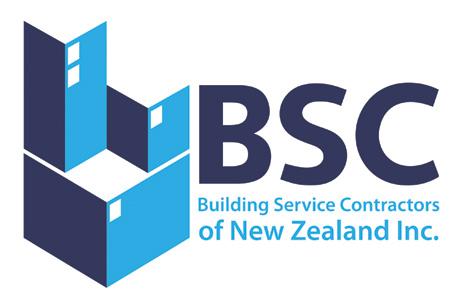
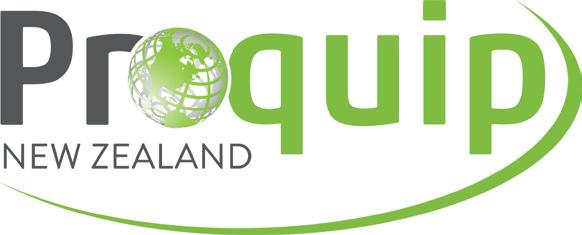
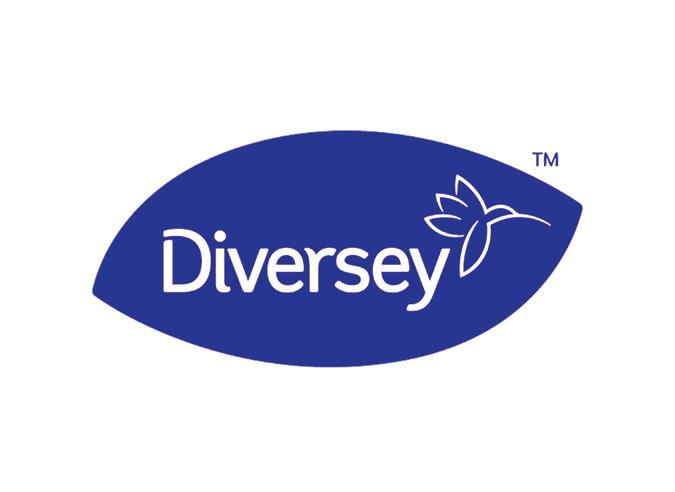
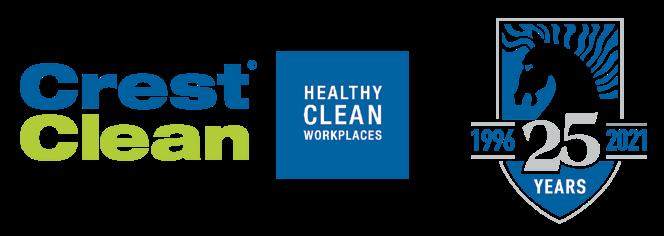
the name you can trust
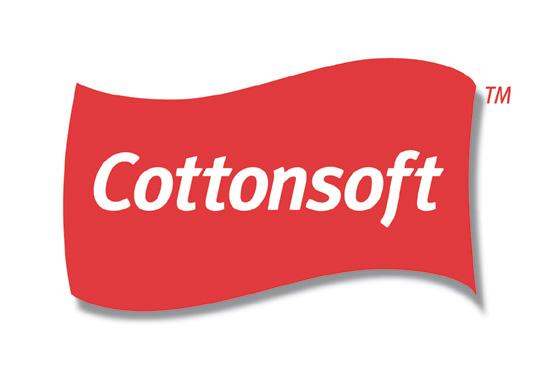

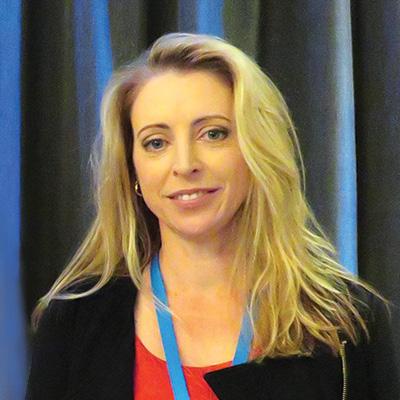
For the first time in three years the BSCNZ was able to run face-to-face industry events…… and so we did!
In March, we celebrated the industry’s best with the CleanSweep Awards. This was followed by CleanNZ Expo in October – giving distributors, manufacturers, and suppliers the opportunity to engage across a wide network of building facility management and commercial cleaning operators. A highlight was the presence of international brands, in attendance to learn and network.
Lastly, in October we also held our Evolve conference. This covered important topics such as the current and forecasted economic state of play, the potential impact of legislative changes, the learnings from the past few years and how we can integrate those learnings into our future planning. All three events were great networking opportunities after such a hiatus between major events.
Another highlight was our ongoing work with the Ministry of Social Development. Through our work broker programme, in 2022, we have placed 130 individuals into employment with BSCNZ members. We will continue this work in 2023, but as everyone can agree, with unemployment currently at 3.3 per cent finding labour continues to be an issue across multiple industries.

Advocating on behalf of our industry and members. This has never been more critical for multiple reasons; we are heading into an election year. A change in government and therefore a potential change in political agenda, or a re-elected ‘re-branded’ Labour government. If
Labour is re-elected, we will see the progression of Fair Pay Agreements, and all the complexities this legislation will inevitably bring.
Regardless of who ends up running this country, it is critical the BSCNZ advocate to ensure our industry voice is heard by our country’s leaders. The last census showed our industry is 29,245 workers strong, GDP contributing $1.3 billion. The cleaning industry’s contribution in NZ is significant. This significance is highlighted as we all continue to navigate our way through COVID. Recent flooding in the upper North Island is another key example of how our industry is on the frontline when disaster strikes.
Another priority of the BSCNZ will be to focus on our industry training. With the government’s implementation of RoVE (Reform of Vocational Education), as an industry we have an opportunity to engage with the new established entities. Careerforce is now integrated into Te Pukenga and mandated to deliver industry training. Ringa Hora is our new workforce development council required to engage with NZ service industries and set industry qualifications and standards. BSCNZ will be coordinating the important discussions between industry, key stakeholders, and these new entities. Having those essential and valuable conversations. Ensuring our industry training is fit for purpose now and into the future.
Inflation and the rising cost of doing business, which inevitably leads to passing on customer price increases. The challenge of managing customers’
expectations, working with them as they also face the pressure of taking cost out of managing their portfolios. Customer education is a key component of this, halving the cleaning bill will not halve the work.
Another challenge is the changes in the political environment. Ensuring the leaders of this country and policy makers understand the unique issues that our industry faces. Ensuring political leaders understand the unintended consequences of the policies they have made or will make. The obvious solution is the importance of networking and having those crucial conversations when needed.
Staff burn out is another challenge well worth mentioning. Taking care of your operational staff on the frontline is imperative. In the past few years many of our team members have stepped up and gone above and beyond expectations. With that comes a mental and physical fatigue, I believe it is truly important to acknowledge these important team members and support them where we can.
Working with industry customers to continue to highlight the importance our industry provides. Through pandemics and natural disasters, we are the industry that turns up. A collective group of people who are passionate about the environment around us and the impact that has on communities’ health, safety, and wellbeing. We will celebrate Thank Your Cleaner Day this year on Wednesday, 18 October 2023. This celebratory day is a great way to promote this important message. ■
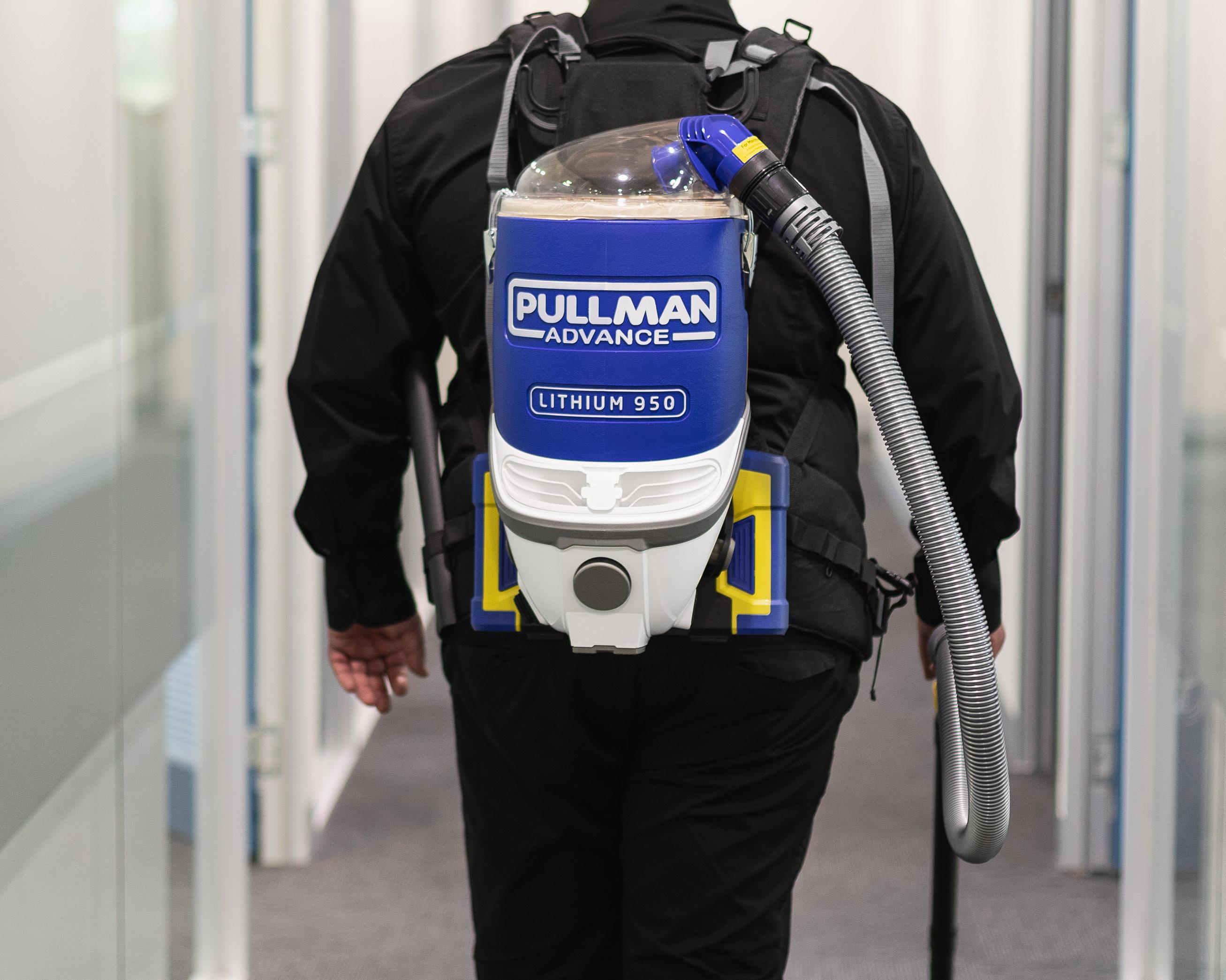
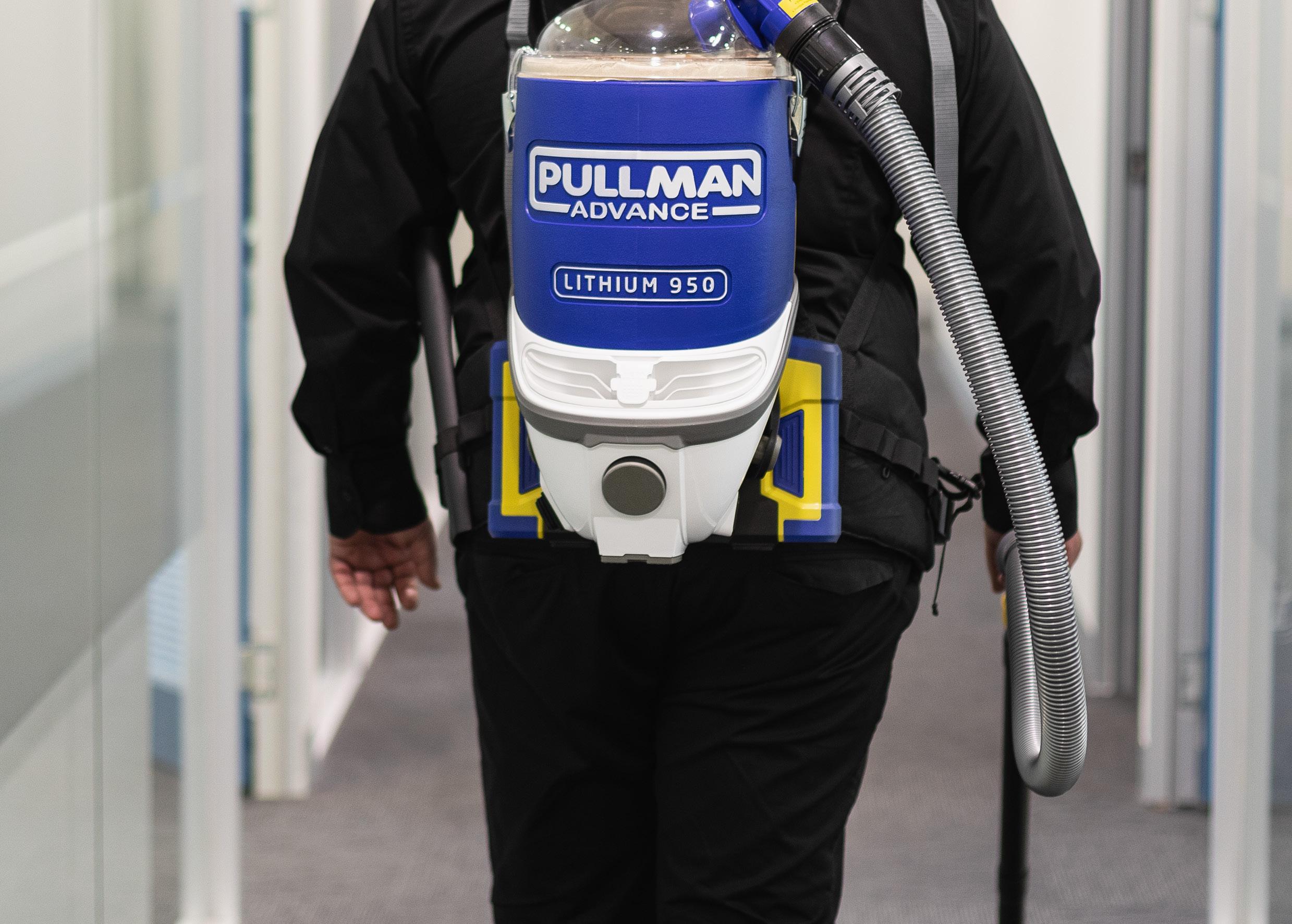
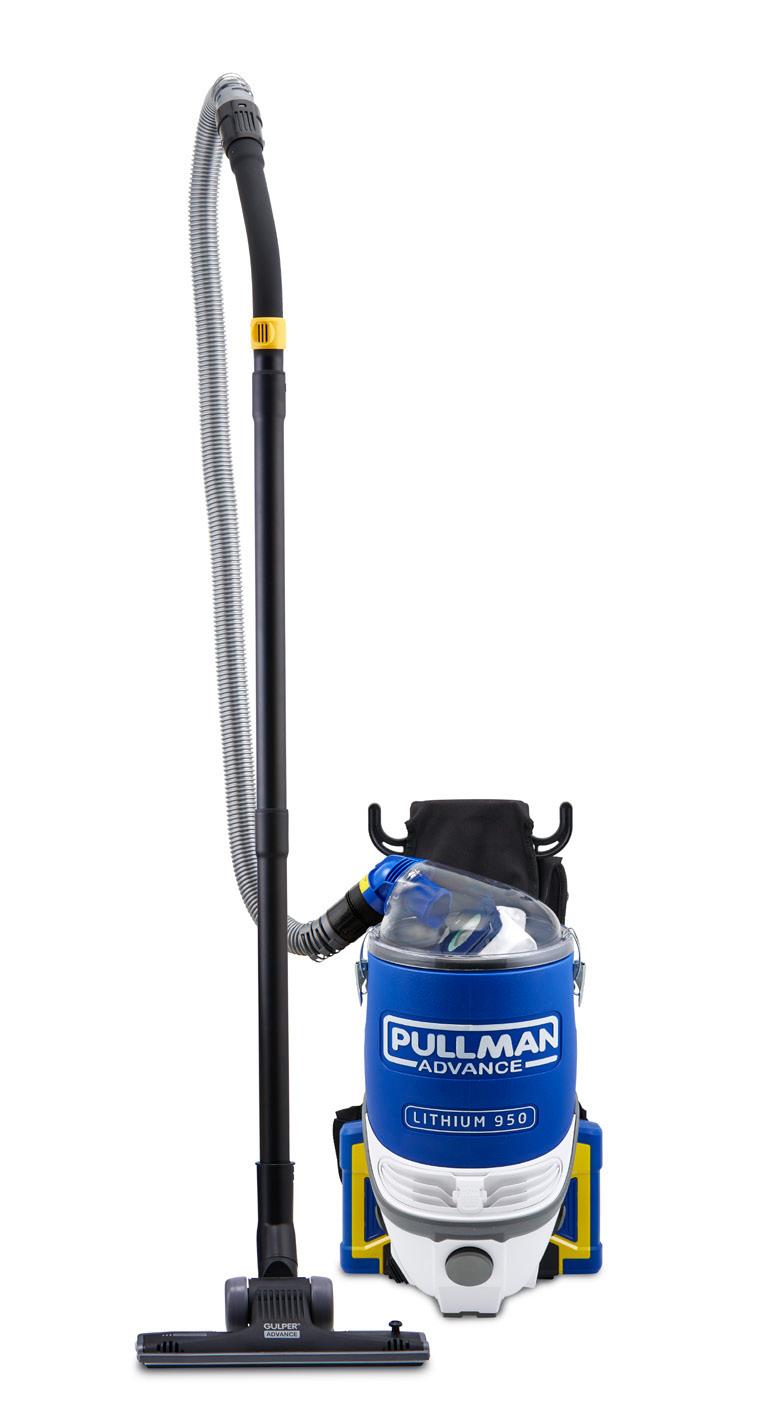
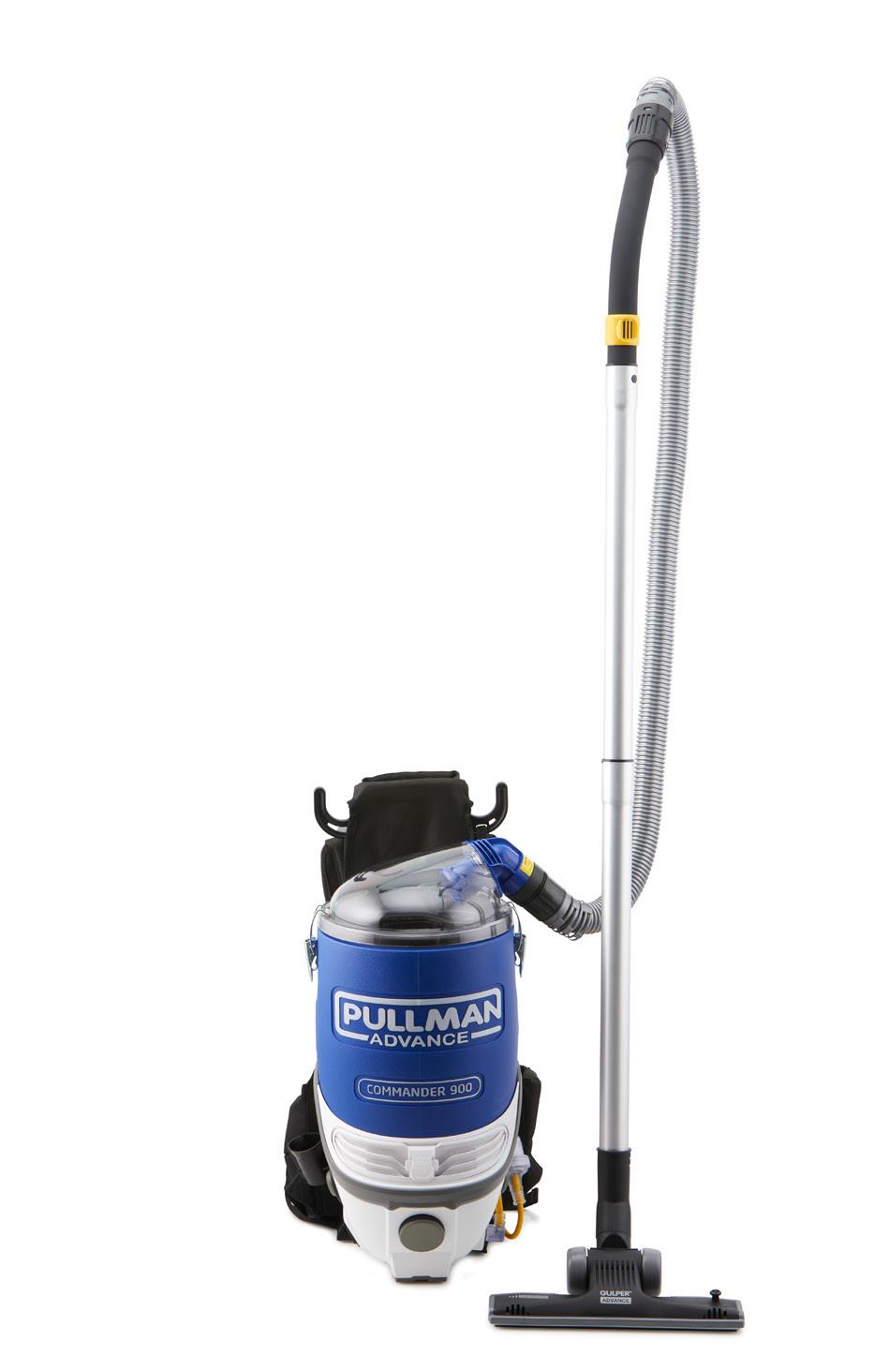
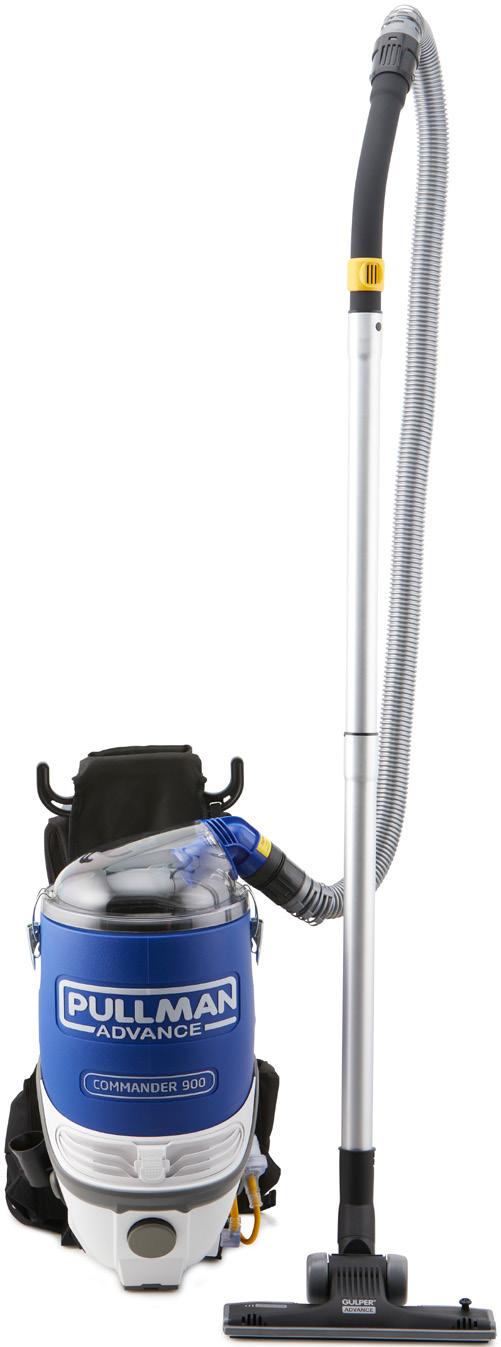
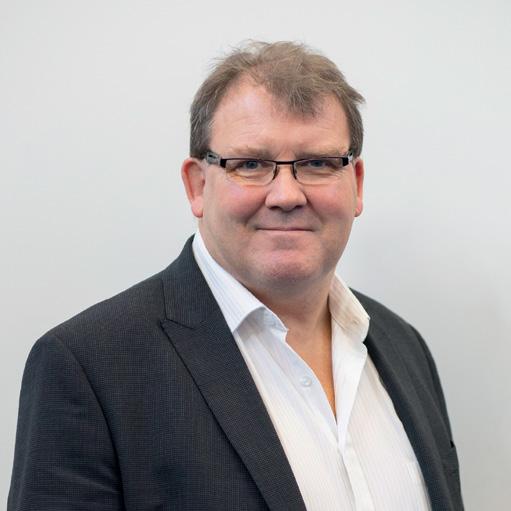
Like many organisations, the main challenge was the impact of Omicron on our business and the sectors we support. During the first half of 2022, while Omicron was at its peak, the challenge was to prioritise staff wellbeing and safety, while still focusing on maintaining our level of service to the employers we support. This is where our organisational culture came to the fore, as staff across the organisation stepped up to help each other out when needed.
2022 was also a time of significant change for Careerforce as we were officially welcomed into Te Pūkenga - The New Zealand Institute of Skills and Technology. At the same time, we farewelled Jane Wenman, our hugely respected CEO. Te Pūkenga was set up as part of the Government’s Reform of Vocational Education (RoVE) and brings the Institutes of Technology and Polytechnics (ITPs) and the arranging training activities of certain Industry Training Organisations (ITOs) together to create a national network. This is an exciting evolution for Careerforce and will ultimately give learners more choices and flexibility in what, where, and how they learn. It is pleasing the transition to date has been smooth, although as we now move towards fuller integration across 2023, more significant change for staff may occur.
Over 2022, Careerforce was proud to launch updated and enhanced Level 2 and 3 cleaning training programmes that better reflect the constantly changing needs of the cleaning sector.

2022 has been another successful year for Careerforce, led by very strong growth in enrolments, no doubt due in part to free enrolments via the Government’s Targeted Training and Apprenticeship Fund (TTAF) which came to an end in December 2022. Although training will again be subject to enrolment fees in 2023, Careerforce has managed to restrict these to pre-2020 levels.
To date the transition to Te Pūkenga has not had any material impact upon our day-
to-day activities, nor the way we work with our employers and learners. Perhaps the only real noticeable change has been the application of co-branding with Te Pūkenga. 2023 will however see the pace of change accelerate as the full integration of the 16 polytechnics and nine industry training organisations takes effect. There is a significant commitment to growing and better supporting work-based learning as a key outcome of RoVE, and the combined skills and experience of Careerforce staff will be critical to the longer-term success of Te Pūkenga.
We remain committed to minimising any disruption to our employers and learners as we progress through these organisational changes, and I am excited about the future opportunities that will be available to our employers and learners participating in work-based learning.
A key priority across 2023 is to maintain or lift our level of service while we fully integrate into Te Pūkenga. We will also be considering the opportunities for employer and learner value adds that integrating into a large education organisation will bring and engaging in discussion with employers about how best to realise these opportunities. For example, joining Te Pūkenga provides access to a national network of English language teachers who could support staff for whom English is their second language.
Careerforce is also committed to supporting learner equity and celebrating the success of traditionally underserved learners. Over 2023, we will strengthen our activities to support our Māori and Pasifika learners as well as those with disabilities, and those requiring extra learning support.
If we are to believe the economic forecasters, then ongoing high levels of inflation and potential recession will be the biggest issues in 2023.
This naturally means considering operational efficiency and monitoring cost.
I would suggest it is also a time to analyse how productivity can be improved and whether investing in people (training) or plant can achieve this. This presents an alternative to simply cost cutting.
Currently cleaning qualifications are not in the Government’s ‘green list’ nor covered by a sector agreement. As a result, international fees will need to be applied to non-domestic (work visa) learners. This will create a barrier to training for some cleaning staff.
Just as severe workforce shortages continue to create significant challenges across the health and wellbeing sector, the same applies across the cleaning sector. We need to continue to promote cleaning as a vocation, and the career pathways available, supported by qualifications.
The pandemic has certainly highlighted the essential role cleaners play in our society as hygiene and cleanliness have been brought to the forefront. We would like to continue to see their visibility and profile elevated further and continue to remind people how cleaners are essential to the workplace.
We would like to see continued efforts to respect, recognise and appreciate the work that cleaners do, improved remuneration and to see more investment in skills development, supporting learning and improved career outcomes. With Careerforce cleaning programmes, cleaners can gain the skills and knowledge needed to pathway from a Level 2 to a Level 3 qualification (with strands in specialist cleaning and supervision).
Finally, I’d just like the opportunity to thanks all the employers who have engaged with Careerforce over the years. This year is the end of an era as Careerforce fully integrates into Te Pūkenga and we say farewell to the Careerforce brand. Of course, we will continue to provide the on-job training sought by industry, just via a different brand and structure. ■
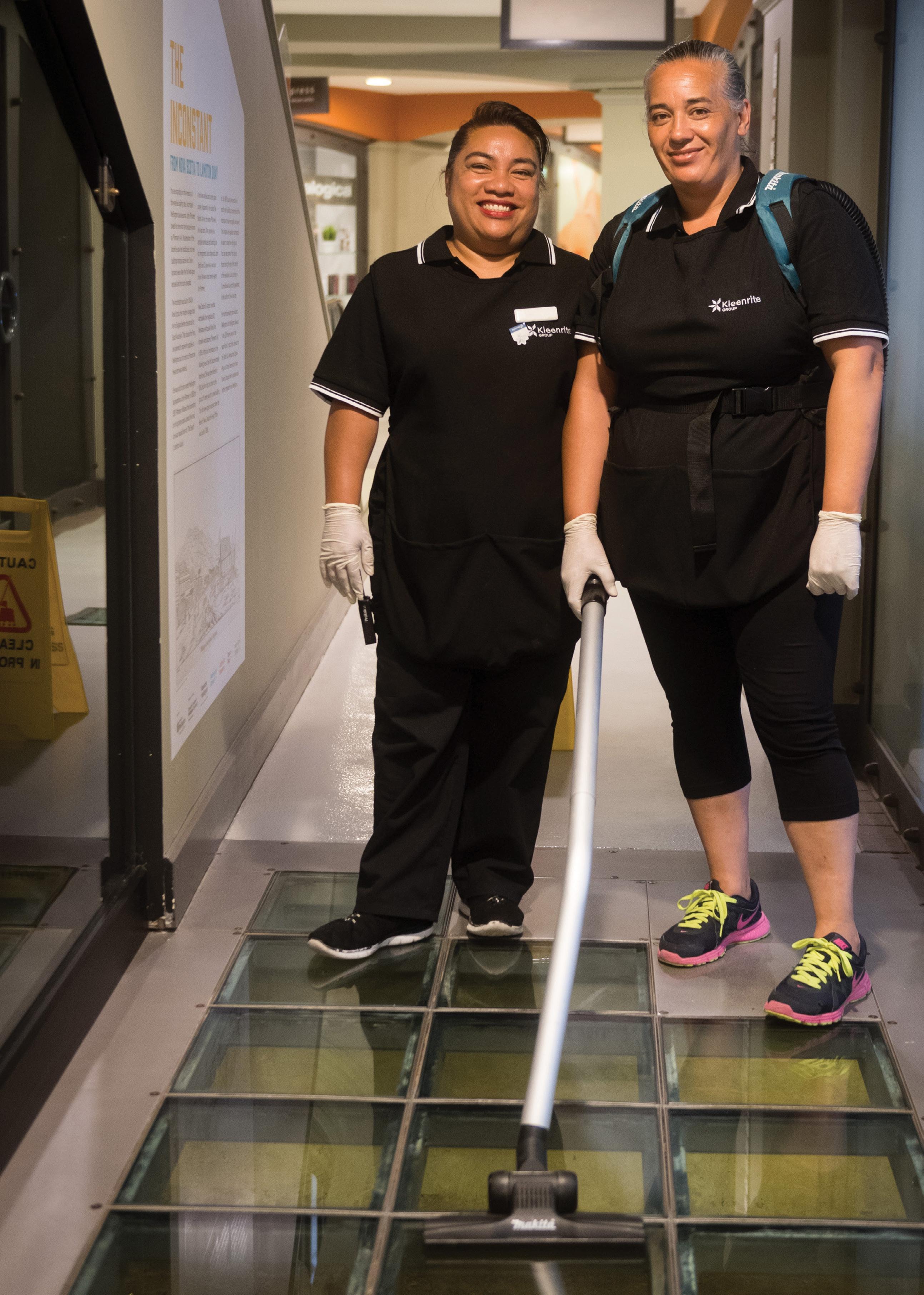
“Our investment in training has helped staff motivation, retention and
Talk to us today about upskilling your staff via our workplace-based training programmes. careerforce.org.nz/cleaning
client satisfaction.”
Yvonne Percival, Kleenrite Customer Services Manager
It’s all about the people! He Tangata, he Tangata, he Tangata. Take care of your people, respect them, train them, empower them, support them and they will look after you.
Grant McLauchlan Managing Director, CrestClean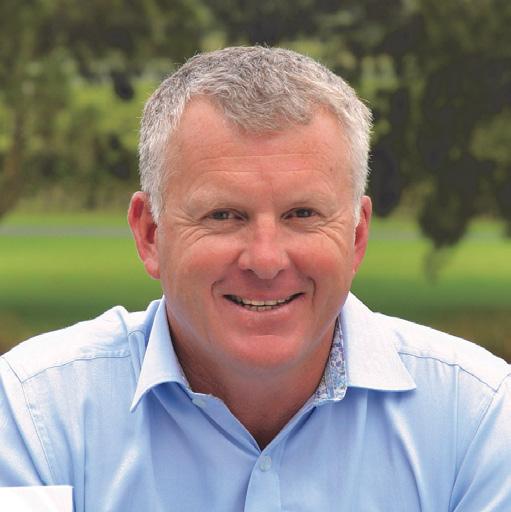
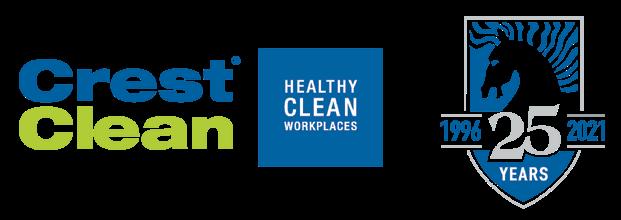
How was 2022 for CrestClean?
While the last 12 months were full of ongoing disruption and uncertainty that impacted the general economy, we are pleased that our strategies to counter Covid and the related disruptions have delivered the greater CrestClean franchise system a high degree of resilience which resulted in us wrapping up the year with significant positive momentum and engagement with franchisees and customers alike.
What were the highlights?
Without question, celebrating our 25th anniversary as a team was an overriding highlight, followed by successfully deploying our new information technology environment and launching our specialist services programme ‘CrestClean HealthCare’. These made for a year of milestone achievements that lay the foundation for an exciting year ahead.
What were the challenges?
The ongoing uncertainty of Covid disruptions across the country, coupled with the lack of the Government’s understanding and support of businesses in New Zealand, has made it difficult to plan too far into the future, which is both frustrating and challenging for all businesses in the country. With tight labour markets, due to unrealistic immigration settings and elevated inflation in the economy, we see the challenges of 2022 only being extended into the year ahead.
What are the company’s main priorities for 2023?
Like every year, in 2023 our core focus will be on doing the basics well, ensuring we are delivering on our promises to our customers, while maintaining an emphasis on the health and wellbeing of everyone involved with CrestClean.
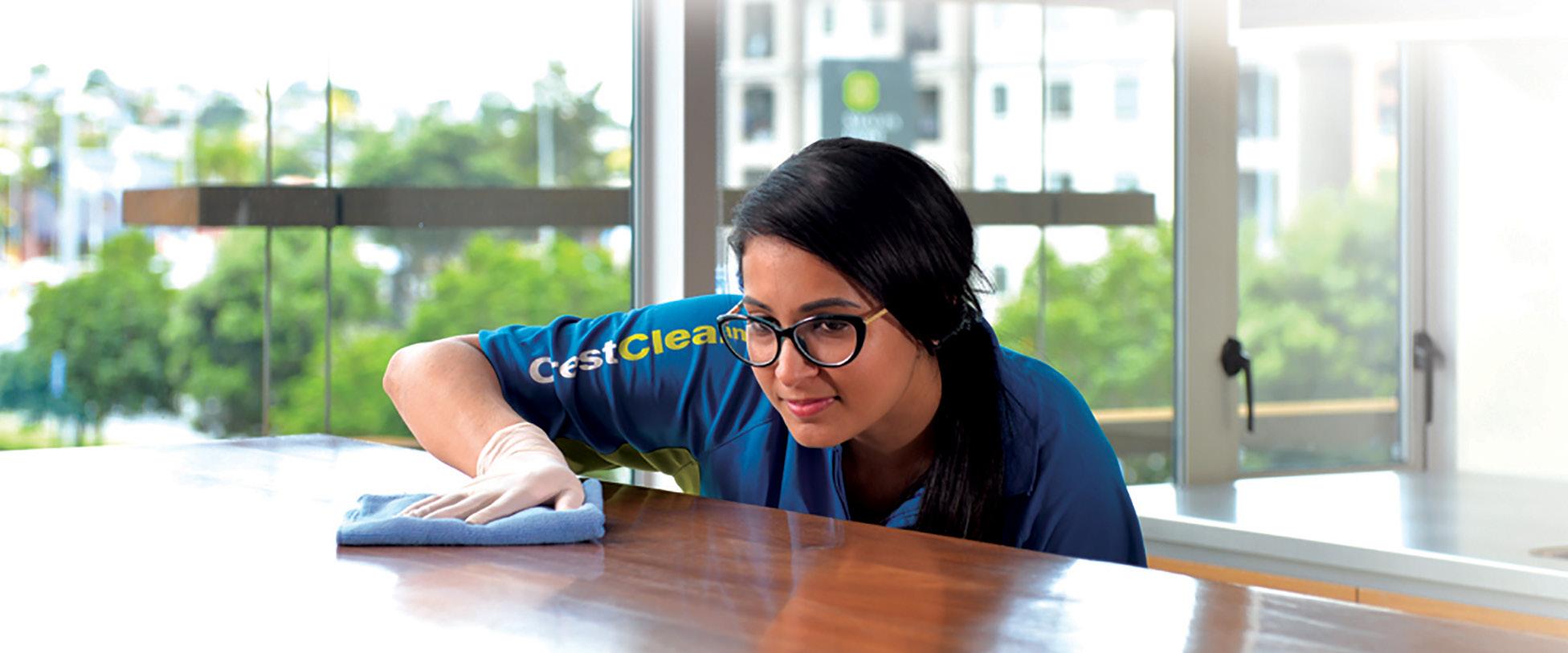
What do you see as the big trends for 2023?
We see further focus on the wellbeing of personnel as a growing trend within successful, sustainable organisations, coupled with a need for all entities to have a good look at their supply chain regarding modern slavery as a requirement to ongoing success in the year ahead.
Are there any key sustainability commitments CrestClean has made for 2023?
Being the only nationwide New Zealand cleaning company with the governmentendorsed Environmental Choice Licence, (Licence Number 4517141 Cleaning Services), we are challenged, as part of that licence, to document and prove annual reductions in our environmental impact as well as educate our customers in the benefits of implementing good environmental practices within their organisations. We have committed to continually improving how we operate regarding this as a responsible corporate citizen.
How will you measure your progress?
As part of maintaining our Environmental Choice Licence we have a rigorous independent audit undertaken by Tonkin and Taylor bi-annually, where our progress is monitored for improvement.
Over the last six years we have achieved annual improvements in our environmental credentials and over the last 12 months we have seen a significant increase in the number of EV and hybrid vehicles across our fleet which will only see further improvements in all our environmental KPIs well into the future.
How do you see the cleaning industry evolving in 2023?
Seeking out innovation and the absolute need to work smarter, given the tight
labour markets, will be a necessity for businesses that wish to succeed. Innovation will be key to reducing the pressure in some areas. Training and personnel development, not only in cleaning but also in professional development, will become a focus as cleaning becomes a pathway to success in other careers.
What’s the biggest challenge facing leaders today?
Maintaining a culture of success, one that engages all people at all levels involved in the organisation with a view to retaining the personnel who are crucial to the ongoing operation and success of your business — this is mission critical in an economy where labour is unsustainably tight.
What advice would you give to fellow leaders in the cleaning industry?
It’s all about the people! He Tangata, he Tangata, he Tangata. Take care of your people, respect them, train them, empower them, support them and they will look after you.
Is there a message that you would like to share with the industry?
CrestClean’s cleaning services meet the strict environmental criteria as set by Environmental Choice New Zealand. This helps to improve the sustainability of our cleaning services and it allows our customers to verify sustainable procurement.
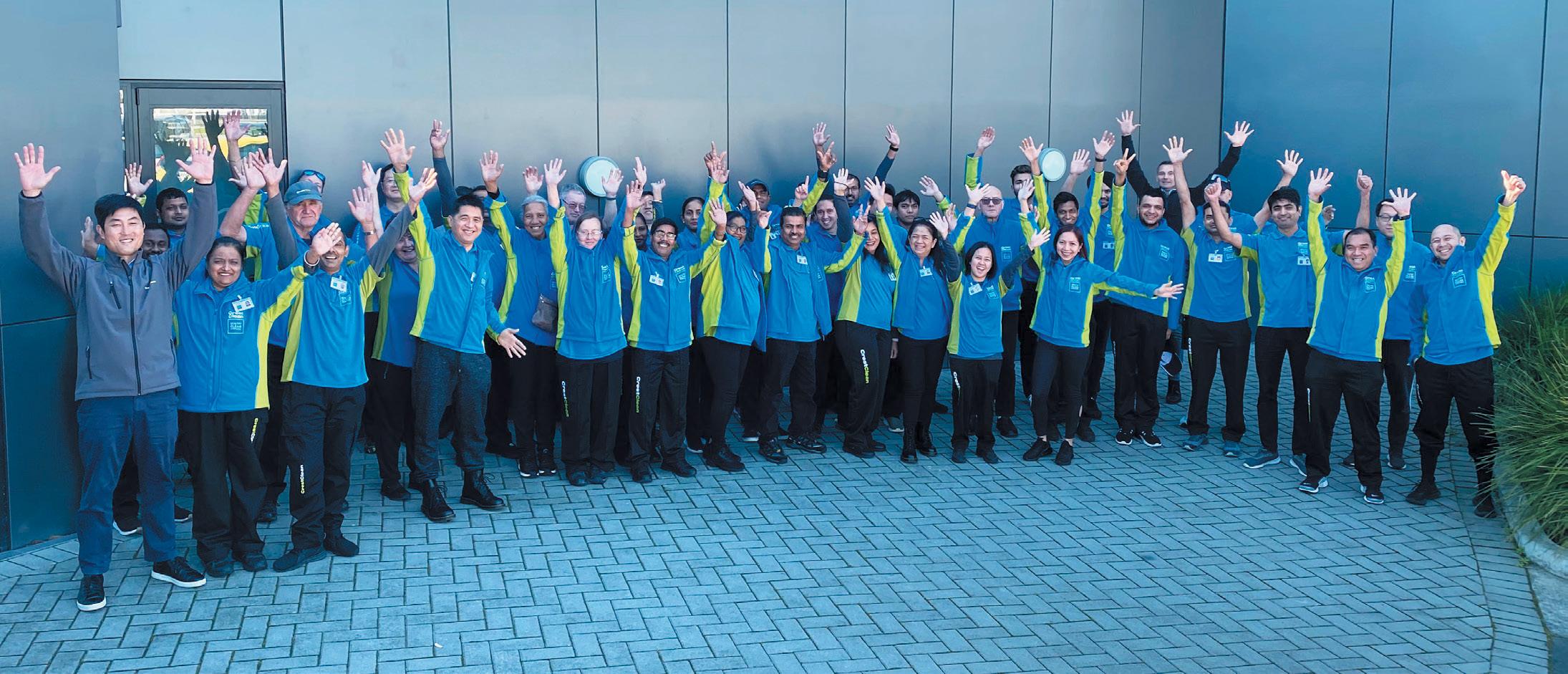
Sustainability is in our DNA
The essential services/products we supply as an industry are critical to enabling organisations to operate, so ensure you place a sustainable value on what you’re offering so that it delivers an equitable return to all stakeholders. Do not discount your pricing as it will end up delivering little value to you as an organisation, to your customers and most importantly to your people. ■ www.crestclean.co.nz
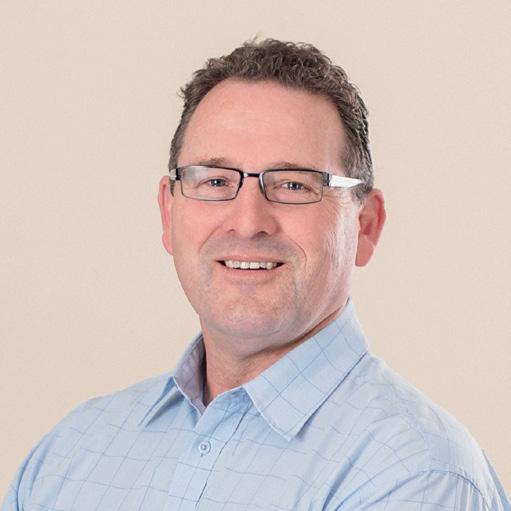
Cottonsoft had a very strong growth year in 2022.

We were well placed to start the year, following the opening of another Auckland factory in late 2021, and the market exit of some retail competitors. With continued supply constraints across the away from home market, our supply infrastructure and service abilities allowed us to provide solutions to many of our established partners and still support new customers.
A 2022 highlight was our supply chain resilience. We were able to overcome the limited availability of containers with bulk tissue supply and switch our container allocations over to commercial products. Later in the year, when other competitors suffered supply disruptions, we were able to source extra volumes using our connections to multiple mills and our strong contracts across the world.
A key focus is stabilising operations and working in partnership with our customers to support their future plans.
We still hold significant buffer stocks across the business - at a huge holding cost - in order to meet our commitments to our customers. In addition, we continue to face severe labour shortages impacting everything from receiving, devanning and returning containers, transport supply, and our ability to increase output on locally manufactured products.
While 2023 will still see the impact of labour shortages, inflationary pressures and the remnants of covid disruption, we’re looking forward to these easing and are preparing for new product releases that have been on hold for some time.
Impending recession is on everyone’s mind so spending may slow. However, with existing labour shortages there may
be less impact on employment than we might have seen in other recessions.
Employees who lose jobs may be able to fill current vacancies, so unemployment may not lift as high as predicted even with the tightening of monetary policy.
Recessionary times put pressure on margins, and businesses who provide alternative solutions and products to restrain cost increases will be able to direct their customers to those solutions. An example is our Livi range, which provides Good/Better/ Best options for the end user looking to economise, the three ranges also allow us to cater for individual business needs.
There is significant future imposition of regulatory change being rushed through by the government, with changes to everything from water supply, RMA, Product and Waste Stewardship programmes, and employment changes. The last few years have taught us that rushed policy has unintended consequences. Be aware of these changes, raise your thoughts around the impacts, and have your say.
Sustainability is a key focus for us, and we have a large number of initiatives under way, including:
• Measuring and reducing our carbon footprint from cradle to grave
• Reviewing product specifications to increase the density of product on each pallet and container
• Reviewing energy and resource use
• Removing plastic from existing products, and making sure our new products are improvements on existing ones
• Increasingly, shipping directly from manufacture point, rather than moving to central warehousing locations
• Encouraging full rather than partial shipments of products and shipping in bulk
• Moving tissue supply to the most efficient mills, while protecting security of supply.
Are there any key sustainability commitments Cottonsoft has made for 2023?
Yes. We follow and support the commitment of our global supply partners. APP are signatories to COP22, and their commitments are linked to the UNDG and measured annually in their sustainability report.
Their Sustainability Roadmap Vision 2030 includes these commitments:
• 30 per cent reduction in carbon intensity
• 50 per cent increased use of renewable fuel
• 25 per cent reduction in energy intensity
• 30 per cent reduction in water intensity
• 30 per cent COD emissions lower than local regulations
• Zero waste to landfill
• Minimum recycled fibre composition in appropriate products
• Increased product biodegradability and resource efficiency
Locally, we recently measured our own carbon footprint, and implementing our reduction strategy in key focus areaselectricity, transport, and waste.
What advice would you give to fellow leaders in the cleaning industry?
In 2023, we have the need to secure the basics of our businesses.
Continuity of product supply and service provision while also having a watchful eye on end user expectations, is critical.
We need to be ready to respond to raised performance expectations. Throughout the COVID period, service failures and supply issues were accepted by most. However, the further we move beyond COVID, the less acceptable these issues will be. Are you ready?
Recent supply issues emphasised that a total reliance on one supply partner exposes a business to higher risk, unless that partner has an alternate source of supply should the worst happen. What supply security does your partner have in place? ■
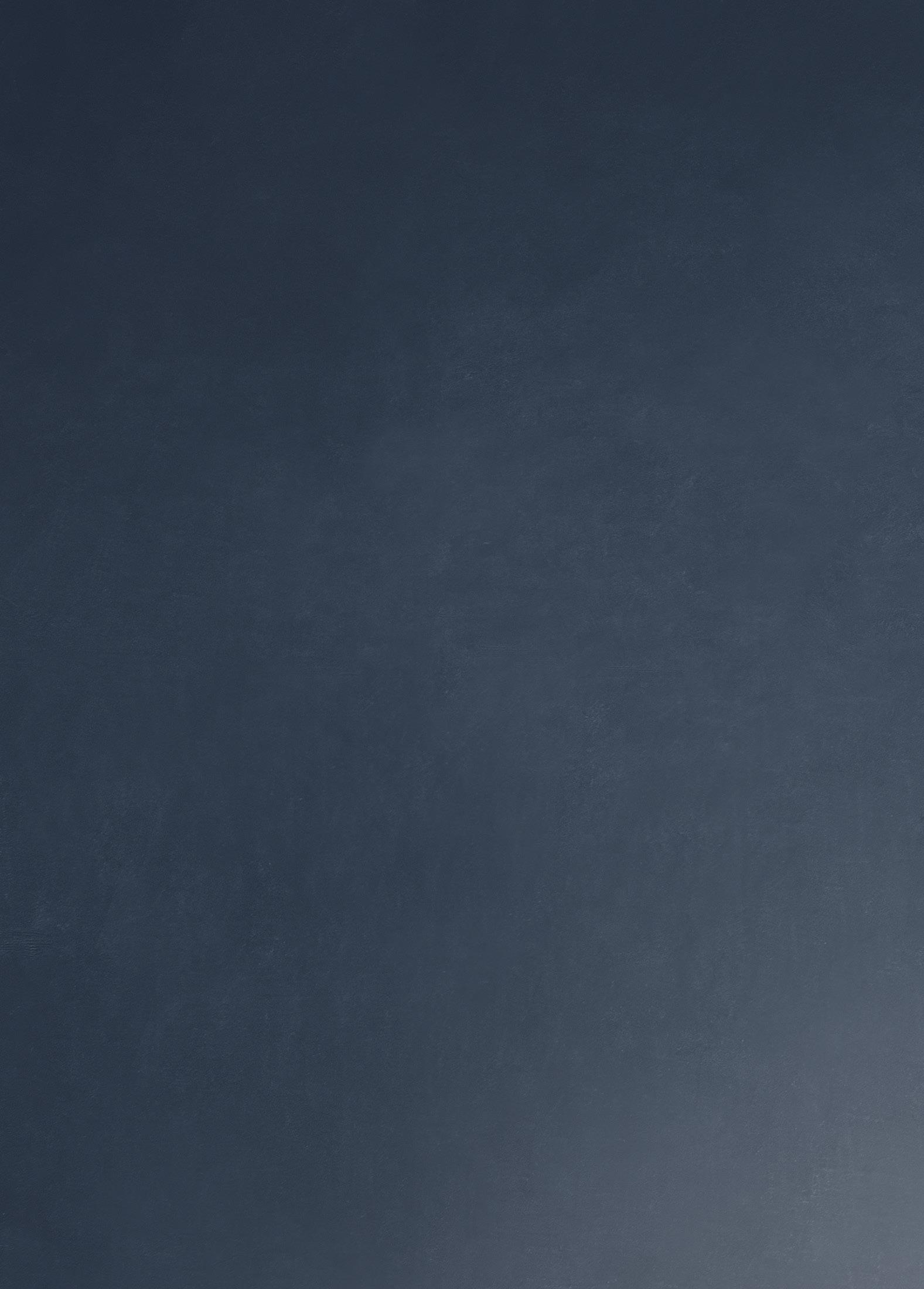
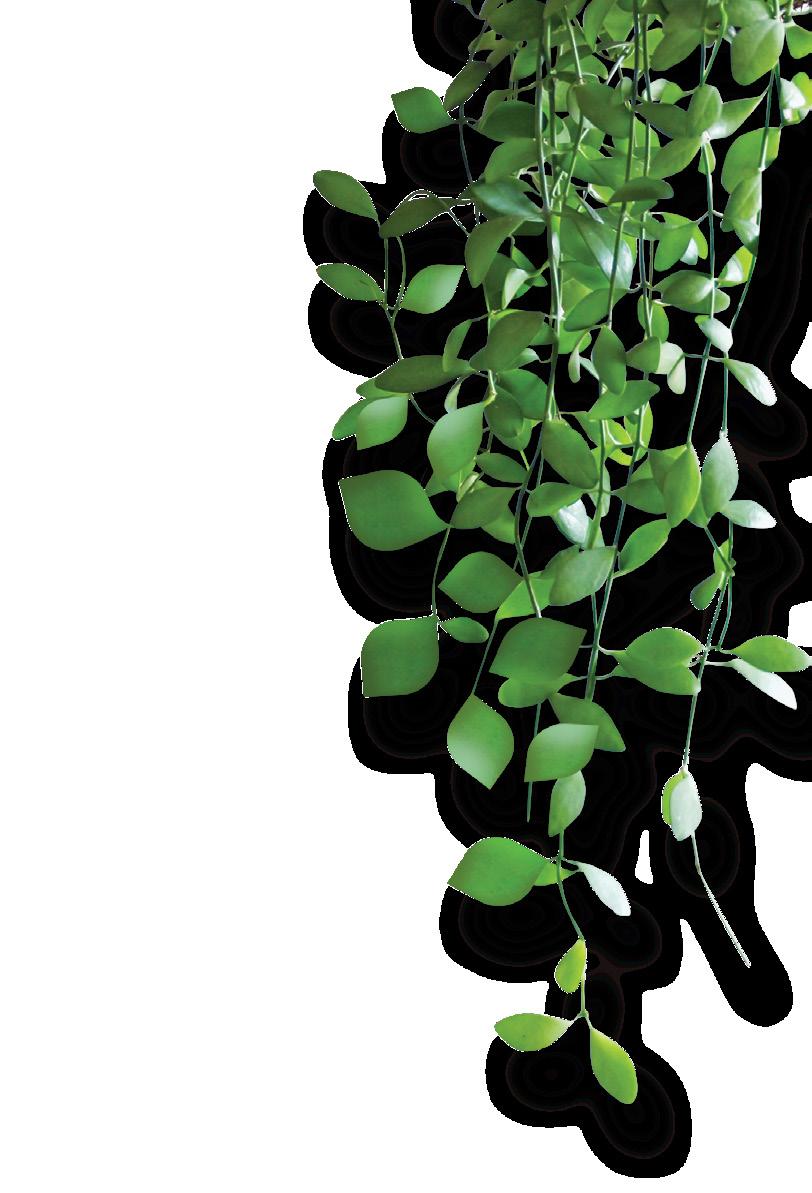
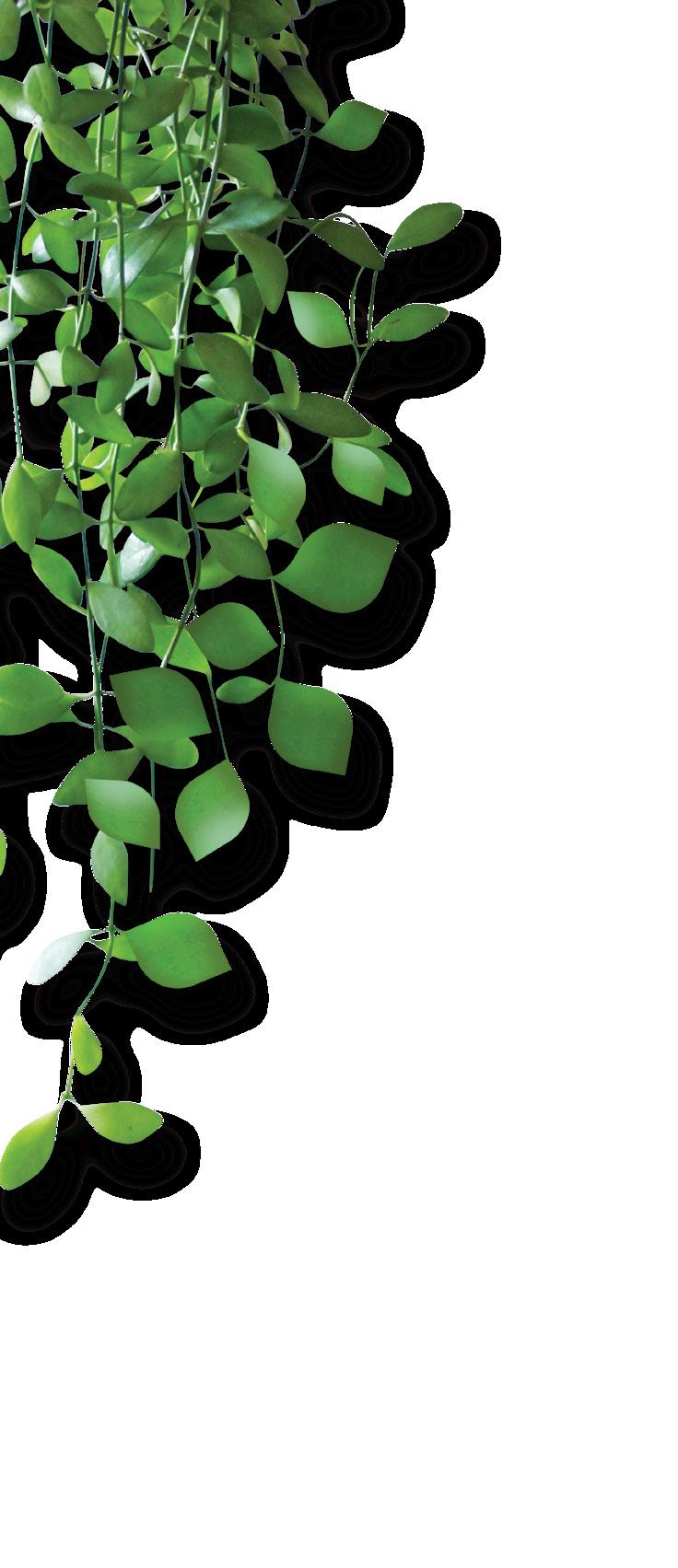
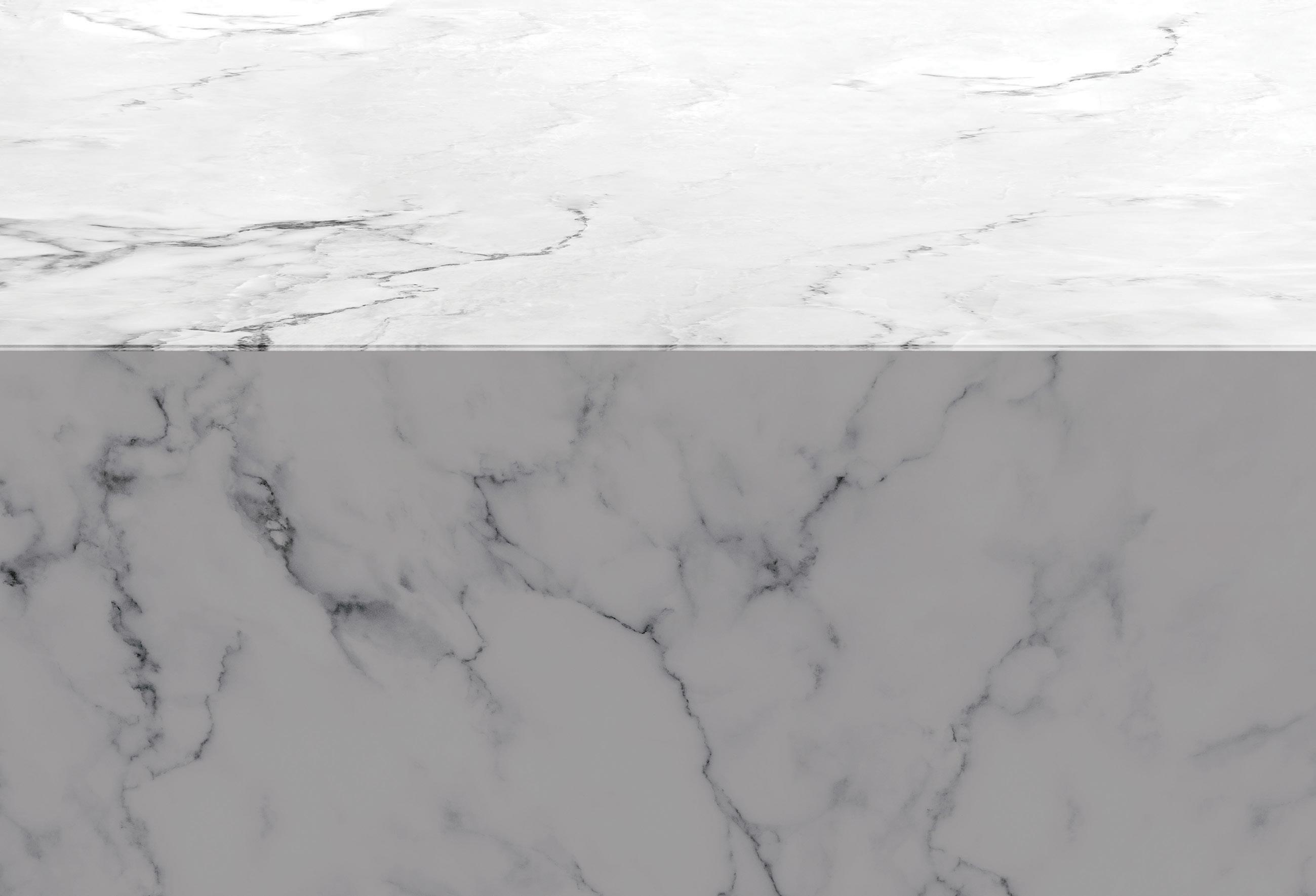
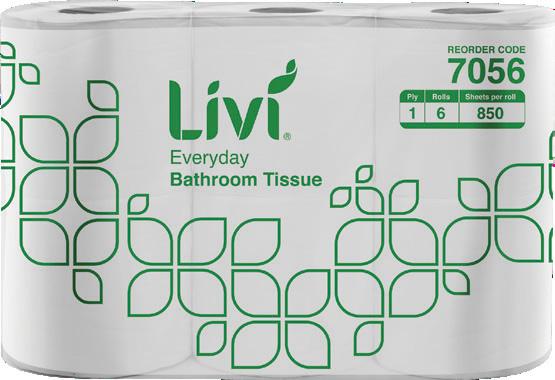
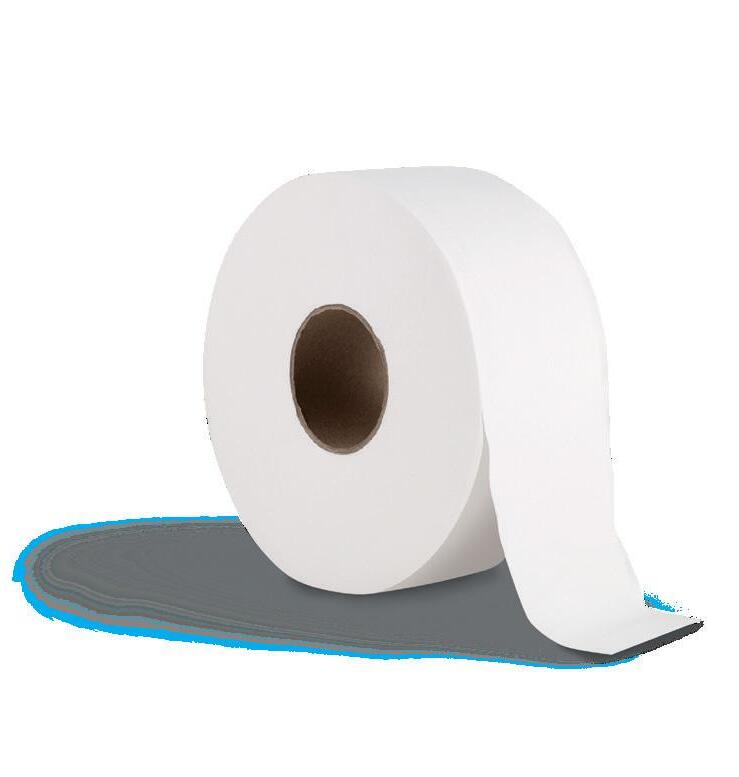





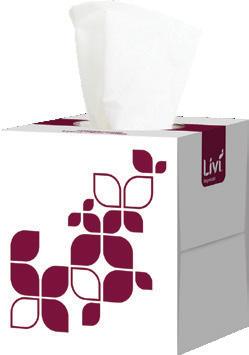
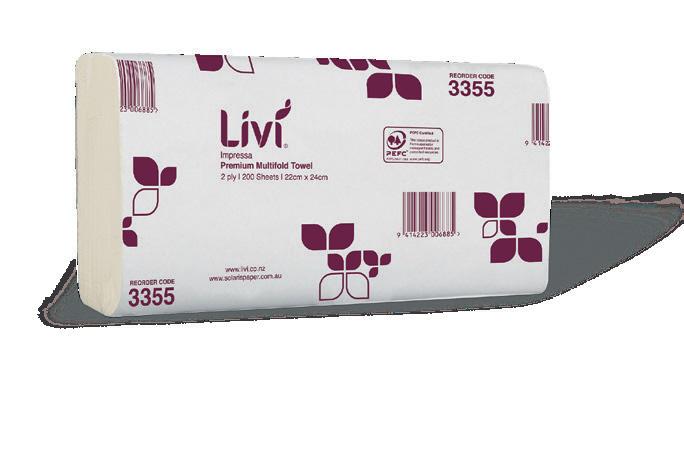
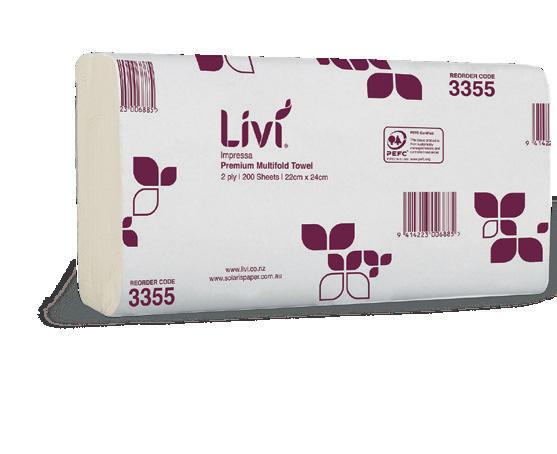
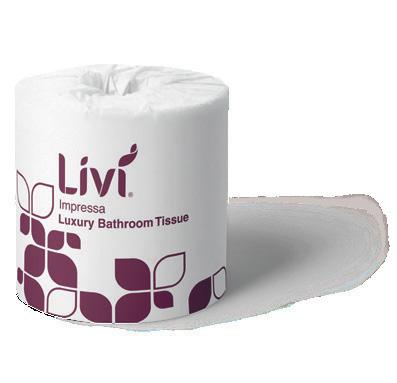
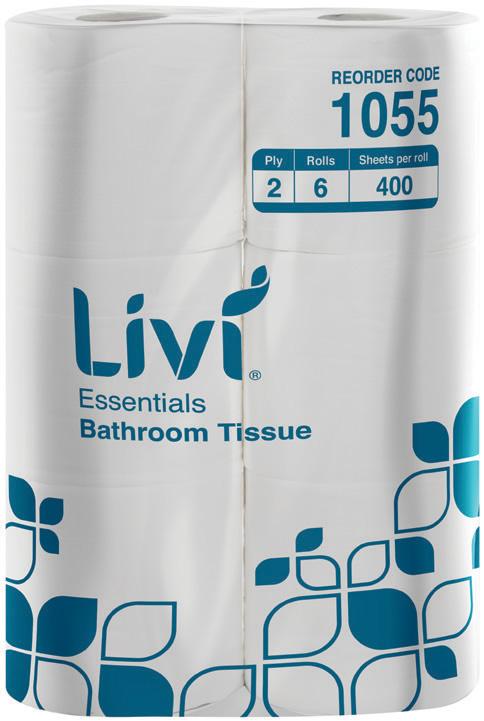

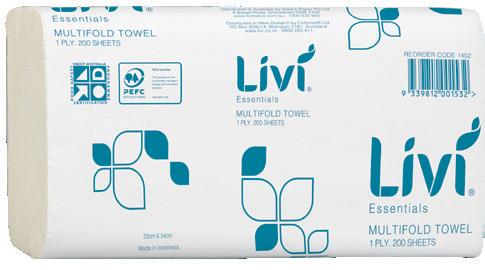
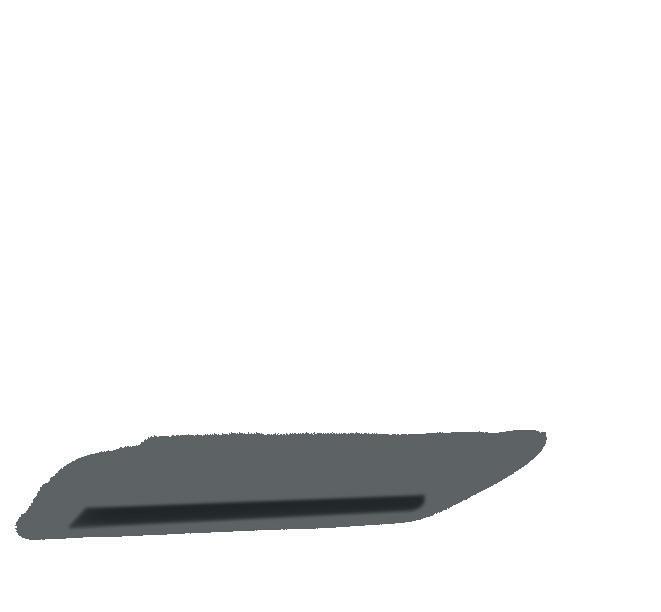
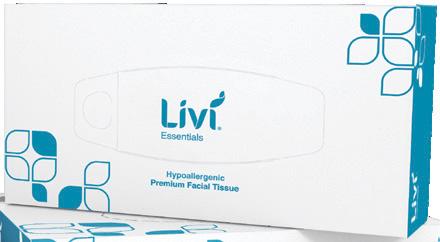
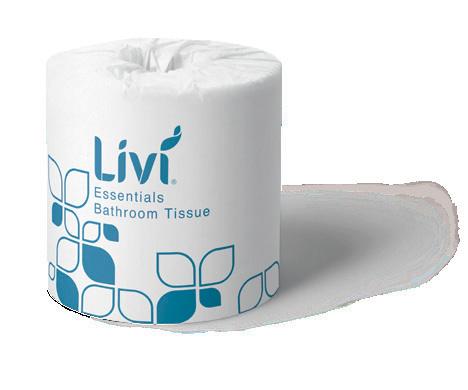
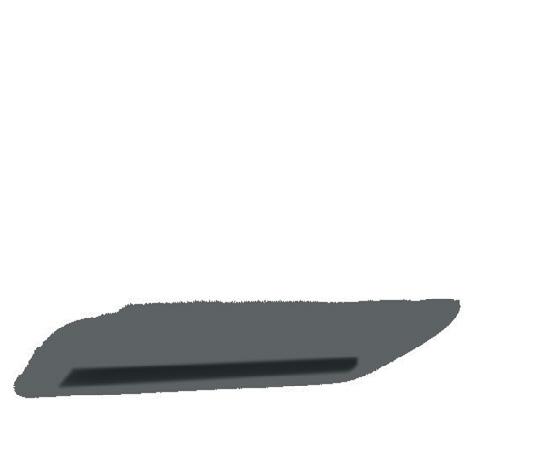
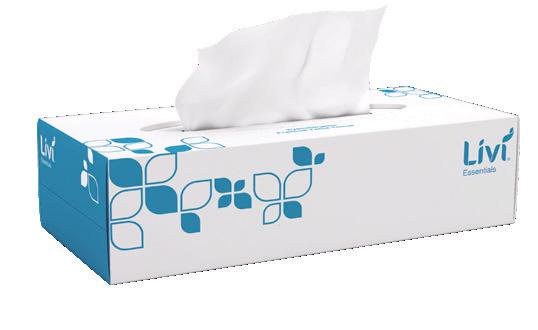

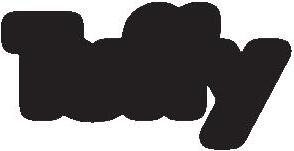


How was 2022 for Diversey? What were the highlights? What were the challenges?
Despite coming to the tail end of the pandemic and everything re-opening there still exists ongoing supply chain challenges, some COVID legacy and some new. For example, the war in the Ukraine, raw material shortages, increased energy costs due to China constraints, transportation, and even limited dangerous goods containers to name a few. Thus, to say we are moving back into a ‘prior to the pandemic’ status I feel is a little premature.
We are also journeying with customers on what their ‘new normal’ ordering patterns will be. In 2020 customers purchased and stored large amounts of hand sanitiser, disinfectants, and disinfectant wipes which consequently lowered 2021/22 sales as these stockpiles depleted.
However, as we move into 2023 and customers are looking to replenish stock. We are finding instead of moving back to pre-COVID purchasing patterns, they may still be in the cycle of wanting to place large orders (to be prepared for any future lockdowns). Therefore, in cases where our valued customers are not too sure of how to communicate their stock needs it has been difficult to forecast.
One of the highlights was our Oxivir Excel Wipes gaining ARTG registration for Class IIb: Cleaning and disinfectant wipe for non-critical medical devices and surfaces (Low level instrument grade disinfectant). Offering our healthcare customers in particular greater protection and further strengthening our infection prevention portfolio.
each country facing their own local supply chain challenges. In response Diversey ANZ purchased a local manufacturing facility in September 2021.
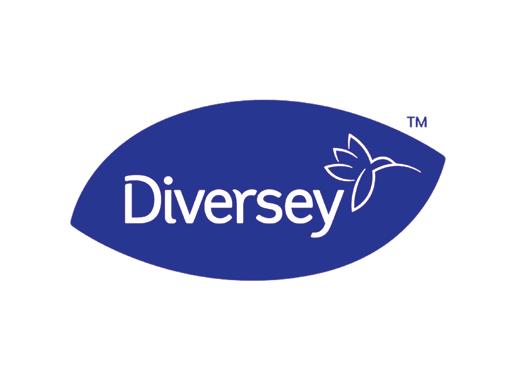
We are now working tirelessly to expand our local insourced range whilst providing the highest level of quality. This purchase has allowed us to move away from our reliance on global supply chains and provided more security for our ANZ customers.
Nevertheless, you can’t build local manufacture with all that is required overnight and 2022 has been a great learning curve as we work towards insourcing as many products as possible to avoid future spikes and troughs in supply and to protect our customers.
supply chain capabilities. In February 2023, we will have completed the upgrade of our new manufacturing facility. This will allow us to continue our investment in innovative solutions with infection prevention (IP) at its core, which we still view as a growing opportunity. In parallel we will be working on our sustainability offerings. Sustainable solutions are what everyone is looking for, whether that is sustainable formulations or sustainable packaging, this is where the future lays, not only for our business, but where the market is heading.
What do you expect to be the big trends of 2023?
Our cleaning and hygiene customers are evolving in their needs and sophistication, thus anything that will create a benefit for the customer is how we see market trends evolve. At the moment these trends continue to focus on sustainability, cost in use and safety to name a few.
How do you see the cleaning industry evolving in 2023? And how can organisations best prepare themselves for the future?
What do you see as the main challenges the market is facing in 2023, and what do you see as the solution to address those issues?
”The real key is being flexible and working to improve and move forward with customers’ developing needs. That said, with all evolution it is just step wise changes that move us towards our ultimate goal.
What advice would you give to fellow leaders in the cleaning industry? Have patience and be flexible.
Is there a message that you would
the industry?
What
We realised very quickly despite the fact we are a global company, during COVID international supply was difficult, with
As suppliers we need to be flexible enough to adapt and change with our customers’ needs. Conversely, given the last couple of years it is not easy to predict what next year is going to look like. After three years of unpredictable ebbs and flows the only thing we can say is, next year will different from the last few years, and what that will look like, only time will tell.
What are the company’s main priorities for 2023?
In a word for the ANZ team our priority is ‘insourcing’ and working to build our
Given the last couple of years it is important to remember infection prevention in everything we do. Everyone has experienced first-hand how quickly viruses can spread in the community thus it’s critical we continue to innovate and develop solutions to keep customers’ facilities safe and ultimately, protect their brand. ■
“
As suppliers we need to be flexible enough to adapt and change with our customers’ needs.
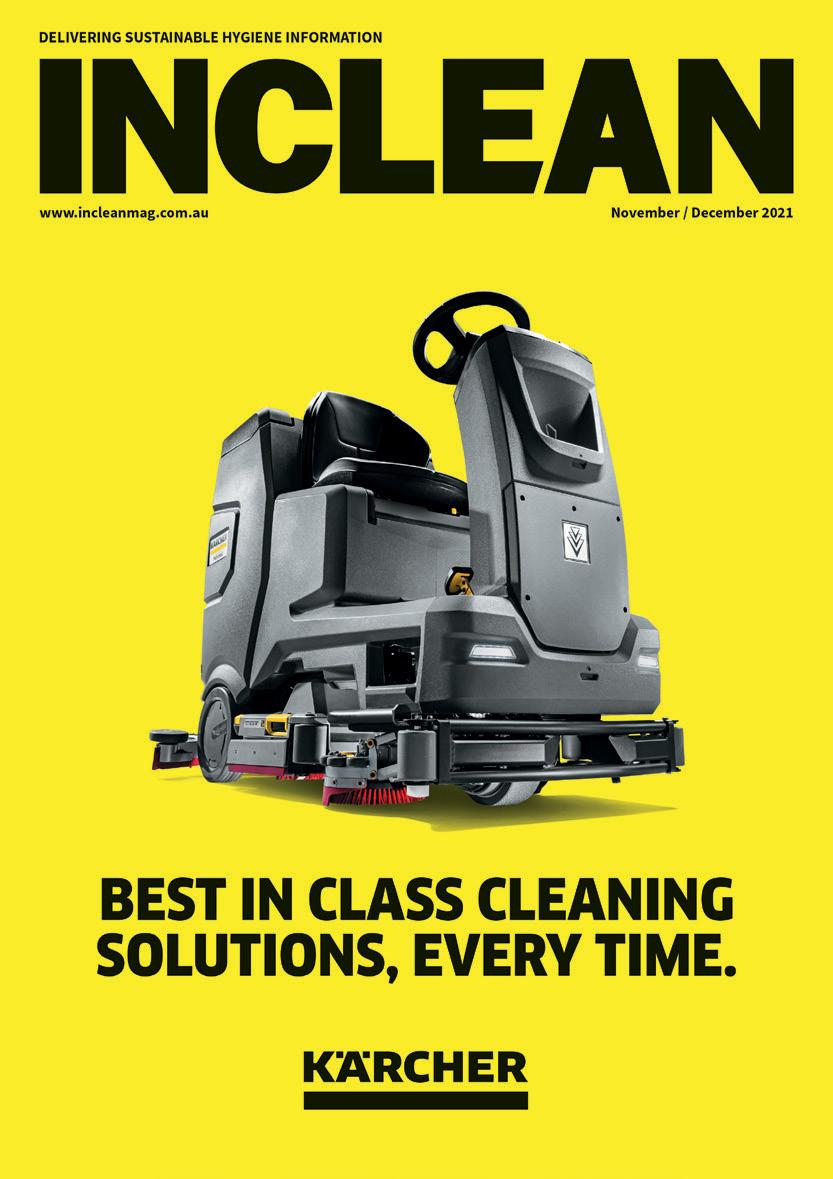
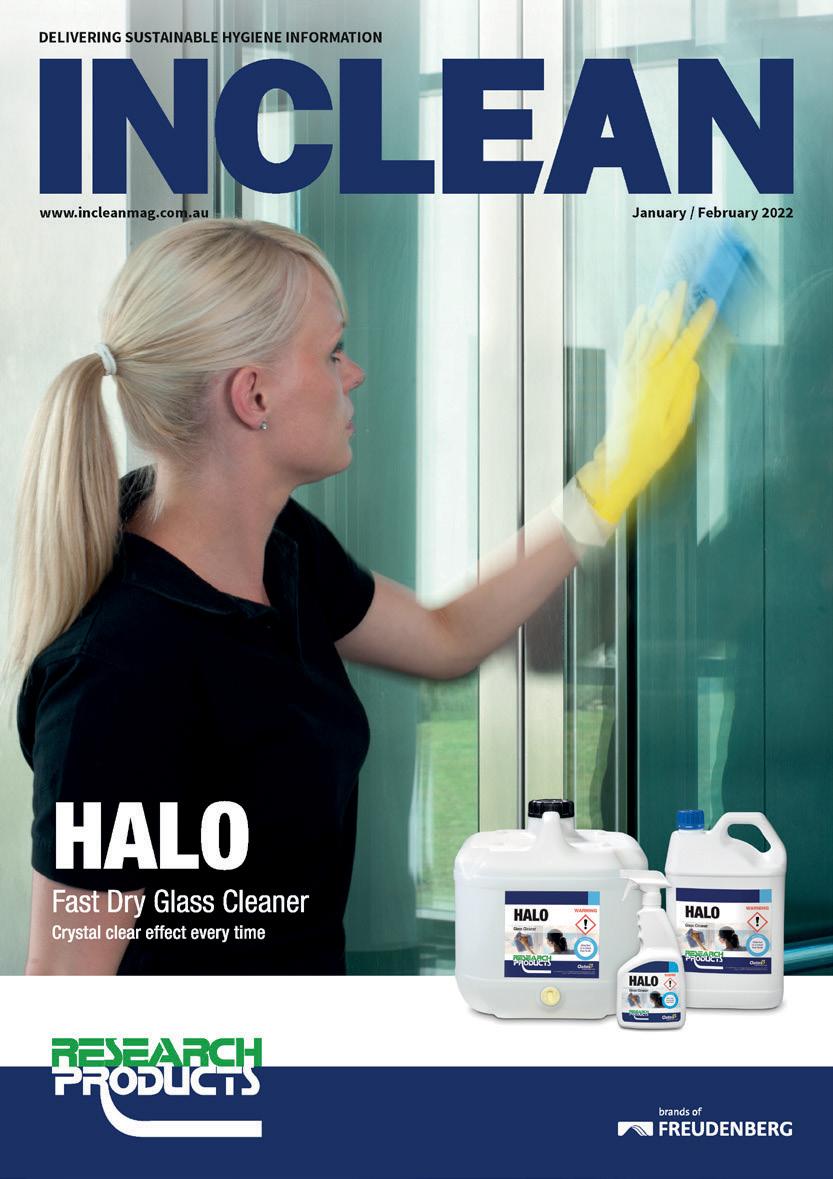
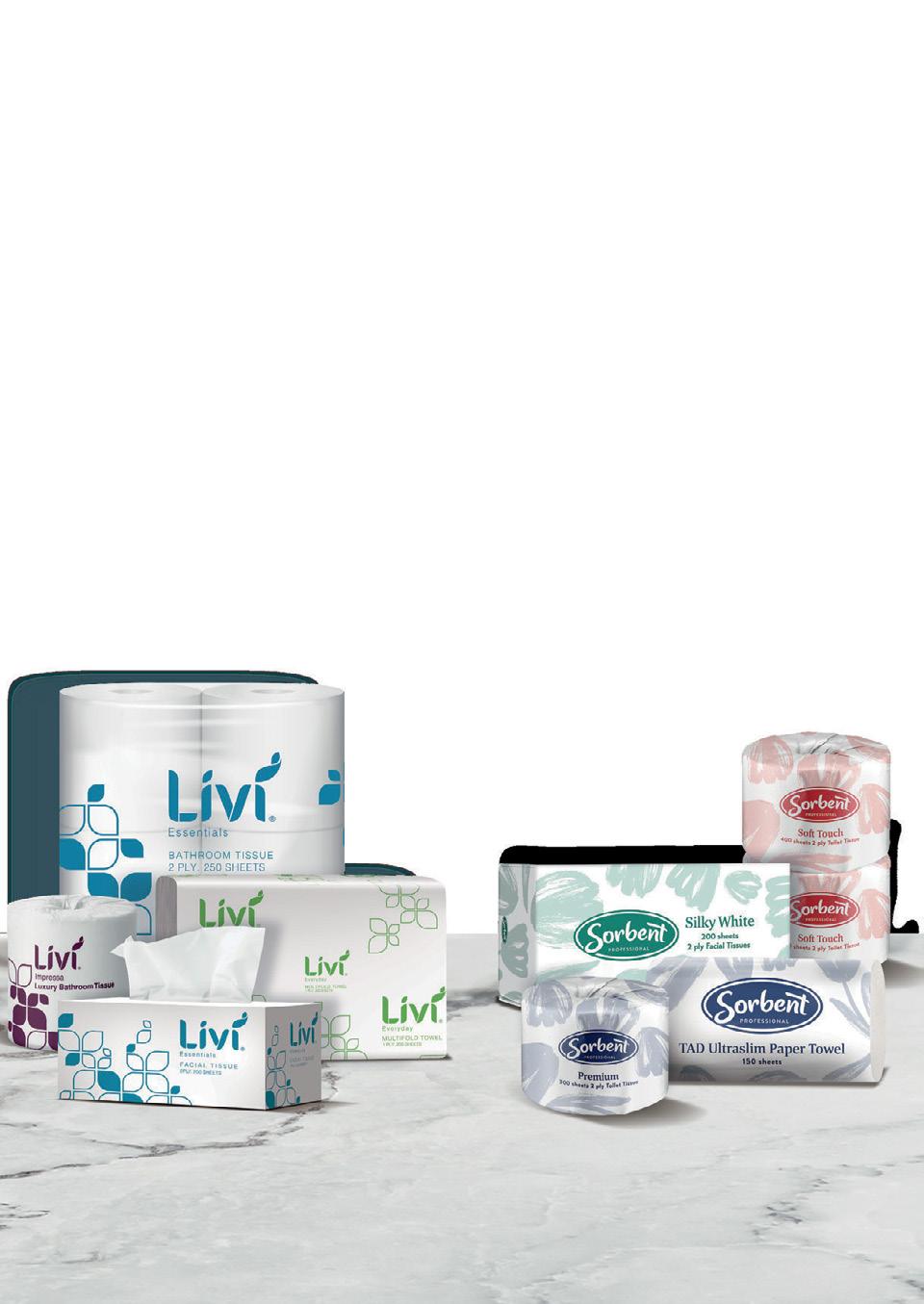



What were the highlights for 2022 for ISSA?
A stand-out moment for the industry was the ISSA Cleaning & Hygiene Expo. After two years of postponements, it was great to see the show go ahead in Sydney. The event brought people together again, with attendees wanting to meet face to face with industry peers and view new market products and services from our largest number of exhibitors to date.
The show saw a 25 per cent increase in attendees, with companies bringing more staff than normal to the event so these employees could sit in on workshops and see and hear from industry experts. These learning opportunities will be crucial as part of efforts in 2023 to strengthen teams and drive companies forward.

The expo also coincided with the INCLEAN Excellence Awards, which showcased innovative and progressive products within the cleaning and hygiene space. A record number of registrations for the awards underlined just how much research and developments was invested into products and services during the pandemic.
The ISSA Cleaning & Hygiene Expo will return this 1-2 November 2023 to the Melbourne Convention and Exhibition Centre. This will be our first show in the state of Victoria since 2019. Already more than 60 per cent of exhibitor space has been sold and we believe this show will be the biggest Expo to date. The INCLEAN Excellence Awards will once again return and coincide with the event.
This year, ISSA Oceania had our first company in Australia, residential and commercial property cleaning services provider, Sebastian Property Services,
achieve the highest level of Cleaning Industry Management Standard (CIMS) certification – CIMS Green Building (CIMSGB) with Honours.
Through third party validation CIMS GB offers a company the ability to distinguish themselves from the market, demonstrate their professionalism and commitment to cleaning excellence.
In 2022 ISSA Oceania also launched our Member Benefits program, powered by Supply Clusters, which offers benefits regardless of a company’s size or sector of the industry.
The program offers our members significant rewards, savings and strategic assistance across 30 common expense categories established to support members in streamlining their operation, boosting profits and managing spend across their business. We will continue to promote this initiative in 2023.
Supporting our members will be the focus again this year, along with ISSA’s overarching purpose of promoting the cleaning and hygiene sector, as the association celebrates our 100-year anniversary.
Throughout the year the association will be highlighting people, products and brands from around the world who have helped us reach this important milestone, and those moving ISSA and the industry forward into the next hundred years. The association is looking forward to hearing back from their members on industry icons within their organisations, past or present as well as innovative products and brands that have helped to transform the industry.
As the cleaning industry emerges from COVID-19 there is still a significant desire and need to embrace knowledge development and training. ISSA Oceania’s online webinars and workshops continued to remain very popular during 2022, and we expect that to again be the case in 2023. Sessions on costings, pricing and tenders have been in high demand, with businesses seeking to be more profitable, competitive and efficient.
The desire to remain abreast of the latest trends and developments was also felt across both our international and local media. ISSA Oceania’s INCLEAN publication experienced a 55 per cent increase in digital subscribers in 2022, highlighting the growing significance of the cleaning industry and the broader markets’ desire to remain informed about the sector. We expect to see this continual momentum moving forward into 2023.
A key theme that has been present across the publications and has gained traction throughout the pandemic is how we need to clean for health and the vital role our industry plays in infection prevention and management. We need to continue the momentum gained during this unique period into 2023 and beyond.
This will be a key message focus for ISSA and GBAC (Global Biorisk & Advisory Council – a division of ISSA). Both online training and certification as well as GBACtv global updates will continue to address the latest human health, infection prevention and control topics. Last year leading professionals updated our audience on the latest COVID variants, monkeypox, indoor air quality, tripledemic: flu, R.S.V & COVID and more.
Locally our association will also need to balance global trends and local needs. We will ensure that local membership continue to have updates and support material on issues like government budget review summaries, minimum wage and superannuation updates and other local business and industry related topics.
What are some of the challenges the market is facing, and what do you see as the solutions to address those issues?
A number of challenges from the past few years are likely to be on the radar again in 2023. Chief among them is the shortage of workers in an industry that has relied heavily on immigrant workers in the past. Hopefully, we will start to see an improvement in this area as overseas students and workers return to Australia in greater numbers.
The truth is that many domestic workers are exhausted after a gruelling period during COVID-19, and high turnover rates are an ongoing issue. Bringing on new staff requires an investment, but it’s a positive investment, and I would encourage business leaders to make a commitment to staff training because it is a proven way of improving operational performance and keeping staff.
Managing costs and budgets is a perennial challenge, and that will be no different in the year ahead. In this sense, ISSA’s Value of Clean tools will be more important than ever. They include infographics and return-on-investment calculators that allow cleaning contractors to justify their cleaning budgets in an easyto-follow way. These tools have been highly valued by our members during the past 18 months, in particular, and enable cleaning businesses to move conversations with their customers beyond pricing.
Looking to 2023, I would also urge companies to be dynamic, and by this, I mean embracing innovation and any new ways of doing business in an effort to get a competitive edge.
What opportunities do you see for the cleaning industry in 2023?
COVID-19 has put the spotlight on the industry and created enormous opportunities for smart players and people in the sector.
One area that is sure to be a big talking point is environmental, social and governance (ESG) strategies, which ties in closely with sustainability. The INCLEAN Excellence Awards highlighted the emergence of new environmentally friendly products, while the social and governance elements of ESG will also be increasingly important as cleaning companies and facility managers commit to ethical and community-focused projects and practices. All companies need to review their ESG approach and make sure it is up to speed.
More broadly, the cleaning industry should ensure that it continues to build on the branding and reputational gains that it has made during COVID-19. Cleaning has clearly been identified as an essential industry in the health and hygiene space and the gains of the past few years should not be lost.
What do you expect to be the big trends of 2023?
Inflationary pressures will continue to be an issue in 2023 as geopolitical and
economic forces drive up power, fuel and general running costs. Responding to such budgetary challenges is essential, along with managing ongoing supply-chain bottlenecks. Companies will need to continue to reassess budgets and review costings.
On the ESG and sustainability front, sourcing alternatives to plastics and more sustainable packaging options will be a critical differentiator for cleaning businesses and facility managers.
As mentioned, training programs will be a vital element as companies prepare themselves for the future. Falling behind industry trends and competitors is not an option, and well-trained employees give companies greater capacity to succeed. Training is also one way to address staffing issues – if you have great people in great positions, it helps the individuals, the team and the company.
In addition to aiding companies in keeping staff informed, companies will also look at other methods to highlight their professionalism and differentiate themselves in the market. Company certification
What factors loom as the keys to success in 2023?
This cleaning and hygiene industry is very passionate. Over the past 24 months, leaders have been able to draw on that passion to support their internal staff and keep them motivated and productive.
Moving forward, they must be able to maintain that drive among a cohort of staff who may be tired and burnt out as a result of COVID-19. Supporting staff, therefore, will be crucial to success, as will be the ability to examine different ways to go to market with products while generating strong tenders.
At the same time, businesses will have to diversify and distinguish their offering from the competition. All eyes will be on business leaders as they try do this while simultaneously addressing pricing scenarios in a highly complex trading environment. ■
“
Falling behind industry trends and competitors is not an option, and welltrained employees give companies greater capacity to succeed. Training is also one way to address staffing issues – if you have great people in great positions, it helps the individuals, the team and the company.
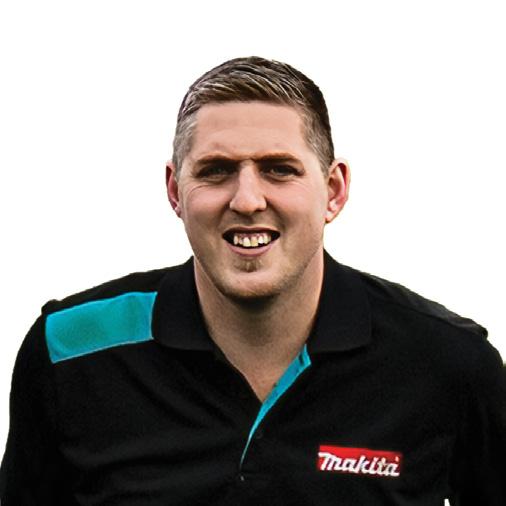
How was 2022 for Makita and what were the highlights? What were the challenges?
2022 was an exciting year for Makita. With the launch of our new 18v LXT DRC300 Robo Vac and 40v XGT VC008 2.0L backpack vac.
The 18v LXT Robo Vac has taken all the best features of the previous model combined with some exciting new features to create a machine which offers a highly efficient unit with a larger capacity to give the user a versatile unit.
The 40v XGT backpack vac uses popular 18V LXT model combined with the new 40v XGT battery technology combined have allowed us to present to the market a unit that has longer run time in combination with higher suction.
These additions gave our customer a great range of products to choose from in our cordless outdoor power equipment for a complete indoor and outdoor building maintenance solutions with little to no maintenance needed.
Stock the last few years has been challenging and 2022 was no difference. At Makita New Zealand we are very lucky to have a great NZ purchasing team who were able to minimise these challenges ensuring supply to our network.
What are Makita’s priorities for 2023?
In 2023 Makita has an aim to keep growing our range in building maintenance across both our 18v and 40v
platforms. 40v XGT, in particular, Makita New Zealand sees as a product that gives us a major opportunity as the market moves to a cleaner and safer workplace.
What do you expect to be the big trends of 2023?
Battery is going to continue to be an upward trend in the market. With safety such a big focus, power leads and petrol in a market will continue to shrink and consumers will continue the trend of moving to battery which Makita New Zealand has a solution to offer with our 18v LXT and 40v XGT battery platforms.
With predictions pointing towards the economy tightening up this creates challenges for both businesses and suppliers. During these times it is important for Makita to work with both our customer and the end user to come up with solutions which best suits their needs.
Makita New Zealand is here for the long haul and is dedicated to working closely with key sectors across New Zealand. Our aim is to use our market leading battery technology to help provide more efficient, cleaner, and safer environments. We hope to see you out there in 2023. ■
“ Makita New Zealand is here for the long haul and is dedicated to working closely with key sectors across New Zealand. Our aim is to use our market leading battery technology to help provide more efficient, cleaner, and safer environments.
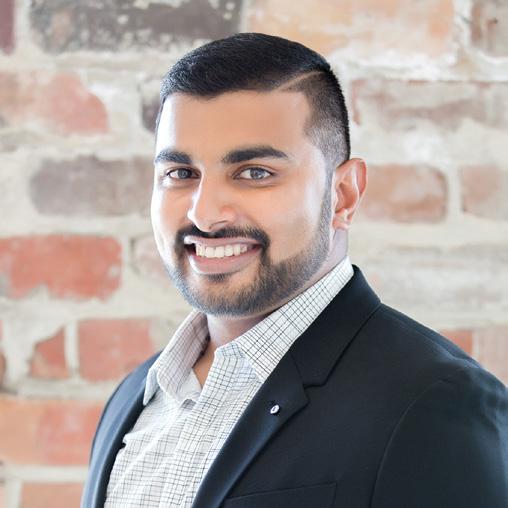
2022 was an exciting year for NZ Cleaning supplies, despite all the challenges we faced in terms of logistics and manpower, we emerged victorious by meeting customer expectations which has always been the goal from the start.
This year is unequivocally dedicated to our team who has gone above and beyond to ensure there is no disruption in the supply chain. What truly made this year exciting was the zeal with which everyone at NZ Cleaning worked towards the common goal and stepped up when needed.
This year truly reflected the work culture and the future of NZ Cleaning that is only getting brighter. In addition to this, we introduced DULEVO to NZ, which is a range of street sweepers that saves labour cost and less reliability on labour to do cleaning tasks ,which is one of the main concerns we as an industry are facing today. The range of DULEVO sweepers are eco-friendly and it is our way of giving back to the environment and maintaining our sustainability status.
One of the few challenges our cleaning industry is facing today and will possibly face in 2023 would be skilled staff. Businesses are always looking for highly skilled industry mavens as we continue to face staff shortages. We are actively looking to solve this by introducing semi-automated and fully automated cleaning machines into the market. We are conducting demonstrations and trials for existing and potential customers to see what suits best for their businesses. This will help businesses rely less on staff and more on proven technology.
Our goal for 2023 is very clear. As our business is expanding and constantly acquiring more and more customers across the country, we are actively looking to open
up a branch in Christchurch to provide better service to our customers in the south. We are hoping to achieve this in the first quarter of 2023. We are also investing on getting more DULEVO sweepers that takes less labour hours and also introduce SCARAB HINO SWEEPERS to NZ market.
Our second priority is to keep our staff updated with all the latest technology we bring in to help our customers choose what’s best for them armed with strong marketing collateral.
We are aiming to participate in more expos to cater a range of customers from commercial cleaners to facilities management. We are also working towards effectively strengthening our online presence as the future is digital and we believe in keeping up with current and possible future trends.
What we believe would gain momentum as employees are back to work would be to contain infections in the workplace. It is vital we look after our employees and make sure they feel comfortable working in the office so hygiene is paramount which in turn will again increase demand for sanitisers and disinfectants. This will open up opportunities for us to introduce innovative products to help solve the problem and stop them from recurring as companies will strive to avoid staff irregularities to avoid disruption in their services.
The evolution has unfortunately happened once we were hit with COVID, it was a learning process for everyone who hadn’t given hygiene utmost importance. It is no more one solution to all problems, it’s about a tailored approach to every cleaning issue as every little negligence could lead to things getting out of hand.
In 2023, cleaning companies would be looking into investing in effective products that are efficient and will prove profitable in the long run rather than cost cutting and trying to buy cheap products to retain
customers. The reward for work well done is an opportunity to do more.
Cleaning industries need to be well equipped for the unseen future keeping in mind what the past had us go through. More importantly be proactive, invest in right products, and focus on long term profits by catering to customer needs which in turn will increase customer satisfaction and reap good results.
Are there any key sustainability commitments NZ Cleaning Supplies has made for 2023?
NZ Cleaning as a company strives to be environmentally and socially responsible. We believe small changes can make a big difference. Starting with our office where we try to use natural light, when possible, instead of artificial lights, energy efficient bulbs, use laptops instead of desktops, hibernation feature on all computers thus reducing energy bills.
We are more inclined towards bringing in recycled or recyclable products wherever possible and avoid single use plastics which in turn reduces wastage in the supply chain.
We look at the packaging our suppliers send us if it can be recycled or reused. We are also looking to make changes to the way staff work by encouraging hybrid working, video conferencing, choosing energy efficient vehicle. We also source products locally made to reduce carbon footprint.
What’s the biggest challenge facing leaders today?
The biggest challenge facing leaders today is keeping up with changing trends and customer expectations. Currently, meeting customer expectations while being sustainable can be challenging in terms of costs. It can get tricky to introduce new technology while some customers are resistant to change and swear by traditional methods. Retaining trust of the customer while we face disruption in supply chain due to unavoidable circumstances can be challenging. Every leader will have their own set of experiences and challenges so all I can say is ‘customer is king’ and if you don’t take care of them somebody else will. ■
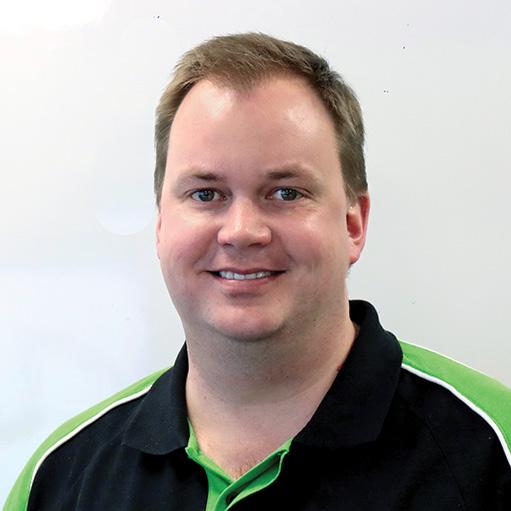
Throughout a year of ups, downs, and uncertainty, Proquip has remained upright and resilient, experiencing consistent growth. To keep all parts of our business under one brand, we merged our Frontline Cleaning Supplies division into Proquip. Alongside this we opened an exciting new chapter; the launch of our website as an online ecommerce platform, which has greatly benefitted our new and existing customers. Keeping the customer’s experience in mind, we developed this platform to allow multilevel accounts, so that any customer can review and purchase our products and equipment in the same space – regardless of their department.
A common challenge that our company faces this year is a lack of business confidence. Business confidence is vital to the economy, keeping our ship running smoothly in the right direction, obtaining success.
Nationally we’ve witnessed some harsh impacts of the economy; a cost-of-living increase, an escalation of crime and daunting news articles that keeps us on our toes.
Collectively we need to put a concentrated effort into thinking positively, support one another to battle this gloomy storm, and make it to the other side with brute force. If this sounds like a pep talk – it’s meant to – as a leader it is my duty to boost morale and motivate my team, which is sometimes easier said than done.
At Proquip, we prioritise end user training and customer education. An example of this is our launching of an online training platform, The Learning Centre (TLC). This innovative platform allows 24/7 access to training on our equipment, helping our customers to easily navigate information on use and maintenance. Alongside this, our team continues to drive effort into customer
visits, providing education with cleaning demonstrations, showcasing how to get the best out of the equipment. Our education focus also branches out to finance guidance, for customers acquiring cleaning equipment. We provide a range of finance options to suit a variety of businesses, administering flexibility and support.
What do you expect to be the big trends of 2023?
This year I expect that we will continue to explore battery-powered products and smart technology. In this magazine edition you’ll notice that we have released the exciting news that Numatic have upped their NX300 battery warranty from one to three years. This provides a great benefit, especially for a Building Service Contractor who purchases a battery powered product with the three-year warranty, they can rest assured that the battery itself remains under warranty for at least three-years of the cleaning contract duration. This makes it easier to price contracts and provides further confidence in the longevity of our products.
How do you see the cleaning industry evolving in 2023?
As the cleaning industry is a large, slow turning wheel, I don’t expect much drastic change this year. The challenges we face, such as the availability of staff and cost increases are not quick fixes either.
In preparation for the future, we need to focus on investing in our existing staff, supplier network, and customer relationships, providing as much protection and support as we can. This should be prioritised before stepping into new projects and ideas, ensuring our team is resilient, positive, and driven.
Water; funding access of clean water to communities in dire need. Last year, in partnership with Numatic, Proquip funded 600,000 litres of drinking water to communities in the Atsinanana and Sofia regions of Madagascar.
Every time a customer purchases the popular NUC244NX floor scrubber, a contribution is made towards this initiative. We expect this to grow by at least 20 per cent over this year, continuing to give back and improve living conditions to those who need it most.
Alongside this, we’ve also made the consistent effort to replace an increasing number of our products with those built from recycled plastic. Our EM3 cleaners trolleys are made of up to 97% per cent recycled plastic!
What advice would you give to fellow leaders in the cleaning industry?
When the economy takes a hit, business leaders can find themselves swept up in the stress and uncertainty, saying and doing things out of character. As a leader, it is vital to remain calm and positive around your team, and continuously focus on moving forward. Make sure to celebrate team successes, no matter how big or small, and focus on constructively turning any negative scenarios into positive outcomes. Staff can reflect their leader’s attitude and behaviour onto customers, so this shouldn’t be taken lightly. I thoroughly enjoyed and benefitted from reading The Seven Habits of Highly Effective People by Steven Covey. If you haven’t read it, I highly recommend it, if you have read it, read it again!
Are there any

Proquip is currently working on a handful of sustainability projects, the most noteworthy being a project with Numatic and an organisation called Charity
Keep an eye out for Proquip this year, we have some innovative and enticing product enhancements in store! Not only are these improvements great to have, but they’ll also overcome challenges that we previously thought were unachievable. You can follow us on LinkedIn to keep up to date on these developments! ■
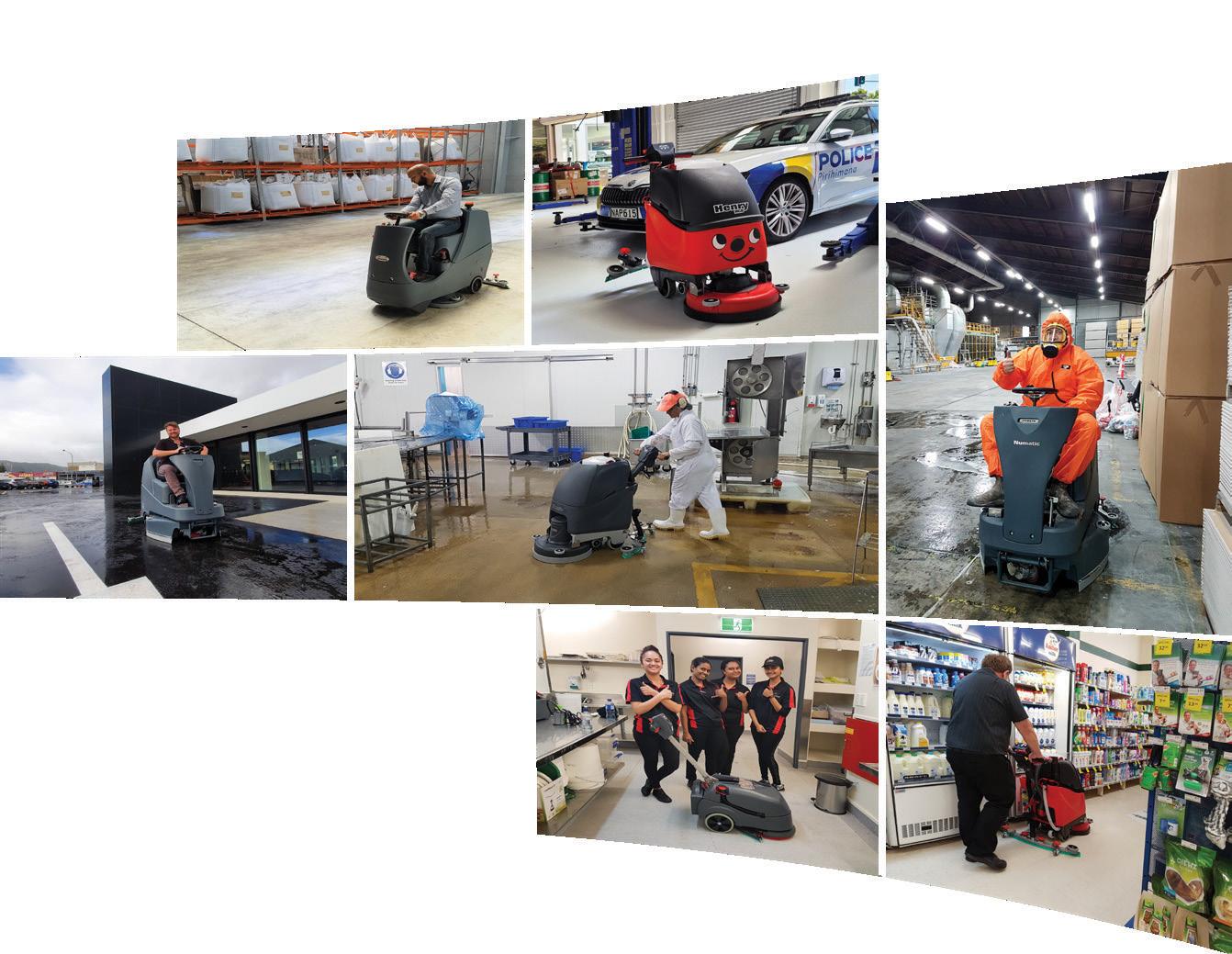
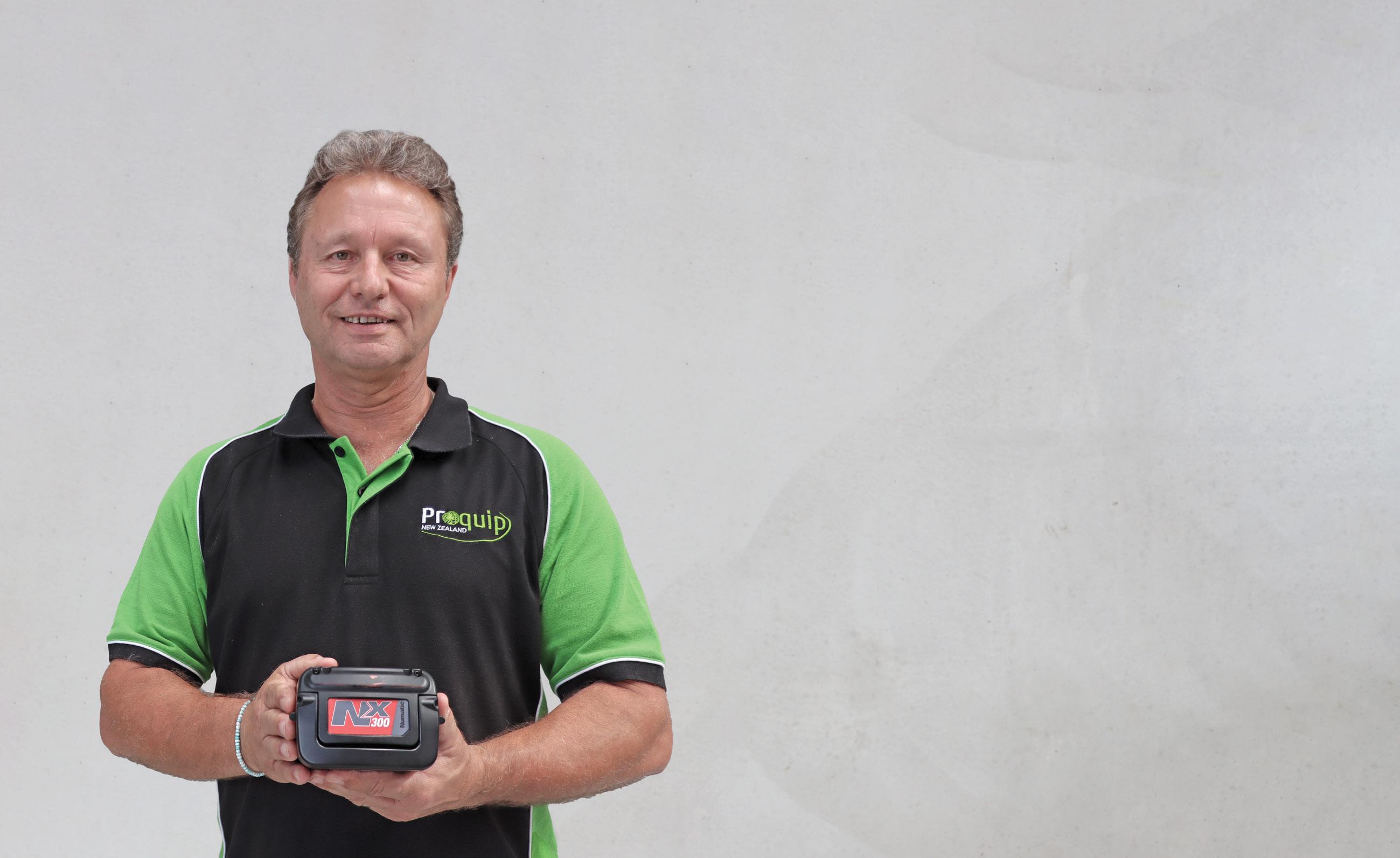




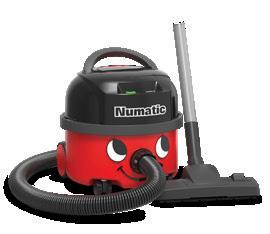
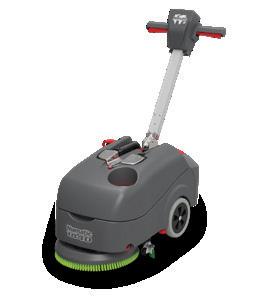
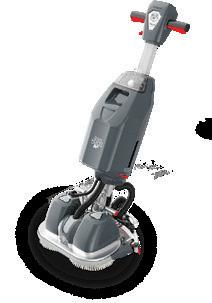
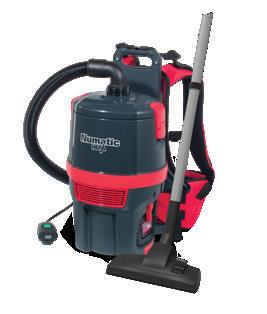
How was 2022 for RapidClean NZ?
2022 started out a slow year after such a fantastic previous year due to negative GDP growth and a slightly retracting economy.
Highlights came in the form of an overdue Clean NZ Expo, which the members both thoroughly enjoyed and supported. This was then followed up by our own RCNZ conference, which was previously withheld for a couple of years due to COVID-19.

This was very well supported by members and our preferred suppliers with events and speed dating for direct contact between member and preferred supplier senior staff which was not always possible during the COVID-19 situation.
The RapidClean NZ conference concluded with our awards dinner to acknowledge excellence in performance by both members and preferred suppliers from RapidClean NZ. Filta was named Preferred Supplier of the Year, and RapidClean NZ Member of the Year was awarded to Waikato Cleaning Supplies Limited.
What are your main priorities for 2023?
To continue to expand on the fact that RapidClean NZ is a mainstream competent, competitive, knowledgeable, and reliable supplier, with a strong focus on the environment, governance, and sustainability.
What are some of the fresh challenges the market is facing?
Main challenges for the New Zealand market are that economists are predicting that we are most likely heading for a recession/negative GDP growth which no-one really knows how bad it will be.
However, there is an election this year plus our hospitality/tourism sectors have started to thrive again. No-one can really predict so early in the year if this will bring about good growth so that hopefully will bring good vibes back into our economy, so our member businesses continue to thrive.
What do you expect to be the big industry trends of 2023?
We believe the cleaning, hygiene, and health sectors will continue to remain strong as new COVID-19 variants keep governments and people on their guard. However, as most people have signalled, they have had enough of lockdowns by governments they are travelling more readily and willingly to see other parts of the world outside of their own country. This should bear fruit for our members in the hospitality and tourism sectors where they have extensive experience and support.
Are there any key sustainability commitments/targets the Rapid Group has made for 2023?
Our members are expanding their sales via support from their customer base for our RapidClean NZ Green ECNZ certified range of chemicals which to date has received good support and is continuing to do so. All our members are very mindful they are employers with staff who depend on them for their livelihood, so they are always careful with the decisions they make. These decisions can impact all parties concerned both economically and socially in the short and medium to long term thus the members research all their decisions thoroughly. Our group of members are in for the long haul and their presence in
this area is one that is represented with pride and vigour.
How will you measure your progress?
Measurement is via the criteria prescribed in certifications of ISO9001-Quality; ISOEnvironmental & AS4801-OH&S standards which are monitored on a regular basis. The benefits of dealing with a certified company are many and beneficial as we as a group of members supply and engender the knowledge that they have the following objectives:
• Business and customer related objectives
• Embedded cycles of improvement (continuity of process improvement)
• Customer complaints handling system
• Customer focused process development
• System and process performance monitoring
• Planned and implemented staff training for both members and customers if required.
What’s the biggest challenge facing leaders in the cleaning industry today?
Compliance costs have been on the rise, and it is a situation that continues to develop and is a very hard area of business to get a direction in from either local or national government bodies so due diligence is required to be sure the objectives in this area are met.
Do you have any advice for fellow leaders in the industry?
This year looks uncertain in terms of the New Zealand economy and how/where it will go. So, to coin a couple of old phrases in one sentence we need to keep our eye on the ball and stick to our knitting in the short to medium term. ■
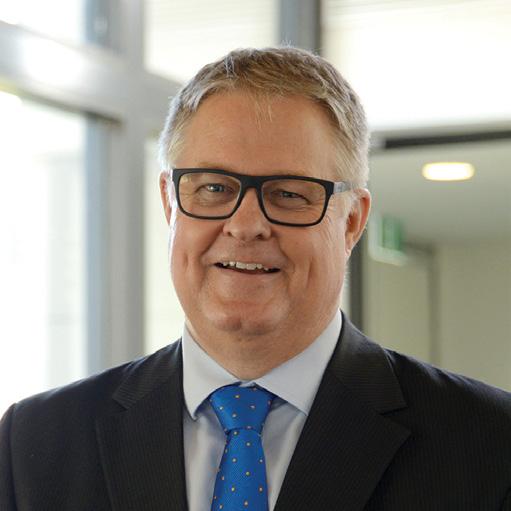
Whiteley had a successful year in 2022. The year provided more challenges that allowed us to continue to strengthen our relationships with customers, suppliers and teams across Australia and New Zealand
For Whiteley, 2022 allowed us to maintain our market position in the industry and focus on continuing to provide our customers with quality products they can trust. It continued a flow-on effect that provided new opportunities and new industries to help expand our product offering.
One challenge for Whiteley and all of the major manufacturers supplying hard floor products, was the supply of raw materials for hard floor industry which had a flow-on effect to customers.
Some raw materials have current lead times of 12+ months which disrupts everyone in the market. Becoming adaptable to find sources of materials around the country and making sure it could be delivered on impacted the cost of manufacturing, this had led to some setbacks, lead-times and of course included costs.
Our main focus in 2023 will be our research and development of new innovative products. We are lucky enough to collaborate with local universities and access their technology which has excelled us in researching product development.
Whiteley is excited to start building our new manufacturing facility in 2023. This will see our footprint increase in the healthcare space with a licensed human therapeutic plant. The new facility also enables us to start manufacturing products that have been created through years of collaborative research and ensure we maintain our premium products, that are backed by science.
The ‘unknown’ was previous a point of concern for most, however, businesses that have survived through COVID have developed a level of resilience they should be proud of. We believe the key challenges of 2023 will be establishing a new state of normality.
Now is the time to build off our successes and leverage from our resilience. Currently, we are facing challenges with freight and logistics. This affects the global supply chain, which can lead to delays and setbacks across businesses.
Whiteley’s solution is to increase national warehousing for our Asia-Pacific customer base. The build of our new plant will also allow us to manufacture more products internally and keep up with demand of our growing customer base. We will focus on providing our customers with quality products while ensuring the products are always safe to use.
What’s the biggest challenge facing leaders in the cleaning industry today?
There are two main challenges facing the cleaning industry, the first one is maintaining value for customers. Customers are no longer just looking for a product that does the job, they are seeking quality, value and benefits to their everyday cleaning roles.
The second challenge is to retain customers’ infection-prevention cleaning habits. Now more than ever it is crucial to upkeep our cleaning vigilance. We should still be focussed on minimising every risk of infection. Bacteria and bugs are still present in the environment, and we should not stop our high standard of cleaning because COVID-19 focus is slowing. Whiteley remains committed to protecting lives and livelihoods.
What’s the biggest lesson you’ve learnt over the past 12 months?
Most businesses have learned their capability to adapt and respond to any situation that arises. This year Whiteley has had to adapt to the delays and challenges with freight, logistics and shortages in raw materials. However, with a dedicated team we were able to find solutions and overcome the challenges in meeting the needs of our customers.
The biggest lesson from the past 12 months is continuing our focus for education. It is important to learn the processes, but also understand how a product is used. It is also important to refresh the knowledge regarding how the product is being used to ensure maximum safety and correct usage.
Education is a big factor of how to use each product properly, as well as learning how to manually handle the product and overall safety precautions. Ensuring education is undertaken will create best practices for the customer.
Is there a message you would like to share with the industry?
Always remember people are the focus of everything we do, we need to provide them with the tools and technology to continue the foundations of the cleaning industry. We need to support them in their roles and cleaning needs, whether this is new development, new products, or new methods.
They have had a hard few years with the pandemic and we need to supply them with the right tools they need to complete the services they provide. We also need to note although we make the products for the industry, it is the employees in the industry that deliver the results.
Their ongoing commitment to keep all of us safe and dedication to their roles allows us to continue our lives with less risk of contamination, infection and illness. They do the hard work and deserve credit for their contributions. Without them the cleaning industry wouldn’t survive. ■
Customer service is the bedrock of any business, but it’s especially important in certain industries – the cleaning and restoration industry being among them.

Cleaning and restoration professionals are often interacting with people and families who have lost their homes or businesses to fires, floods, and other calamities.
As a result, clients can be dealing with trauma and high emotions, the loss of valuable possessions, and even being displaced from their home.
For this reason, cleaning and restoration professionals must make customer service an absolute top priority.
When they do, they can help people through stressful, difficult situations and build a sterling reputation. This is important and often overlooked.
in
a crisis
When they don’t, they risk letting people down when they’re most vulnerable – and seriously damaging their professional brand in the process. Sadly, this is the scenario that often happens.
So, how do you deliver impeccable customer service in a crisis?
Two words: “transparent communication.” That is, always keeping the client informed,
involved, and at ease. Below, find six strategies for doing exactly that.

Your clients are amid one of the biggest crises they may ever face, so now is not the time for sporadic communication or long silences.
Once you begin working with a client, stay in communication regularly. Be incredibly responsive to their calls, emails, and other messages. And, share all updates in real time. If new information comes across your desk, share it immediately. This goes not just for the home or business owner, but for the insurance carrier as well.
It’s not just the conscientious thing to do, it also ensures everyone is always on the same page and fully informed.
Cleaning and restoration professionals have a wide array of tools at their disposal – not just for cleaning and restoring, but also for cataloguing and communicating. Make sure you’ve mastered the latter in addition to the former.
You, or the insurance carrier, may have software to upload photos, take notes, and provide other necessary documentation. You can also designate formal correspondence channels between you, the home or business owner, and the insurer, such as a custom web portal or dedicated email thread.
These tools will keep you organised, give the client peace of mind, and make it easy to check records and answer questions.
As noted earlier, the period of cleaning and restoration after a fire, flood, or other crisis can be some of the most trying and traumatic times in a home or business owner’s life.
For that reason, it’s essential to build sensitivity – in addition to efficiency and effectiveness – into your approach to transparent communication. Directness without sensitivity may come across as harsh or unfeeling.
Both office staff and field techs should be trained on how to best interact with emotional clients.
Let the clients know that you are professionals; that as challenging as this time may be, it’s not the first time it’s happened to somebody, and that they’re well on their way to getting through it, restoring their property, and returning to normalcy.
Cleaning and restoration professionals are often interacting with people and families who have lost their homes or businesses to fires, floods, and other calamities.
For the communication process (and the restoration process at large) to run smoothly, you must build trust with your clients. They are depending on you to put their properties back together, so they need to know they can count on you. How?
First, act as a key ally when it comes to interacting with insurance. Remind property owners to contact their insurance agency as soon as possible and to thoroughly review the policy to determine what coverage they have in place.
During this stressful time, clients may neglect to fully review or understand their insurance. You can build trust by helping navigate this aspect. For example, you can remind the customer to determine if certain crises (like mould remediation) are covered or not, or you can help clarify whether additional living expense coverage (i.e., relocation) is available. In short, be a trusted guide in what can be a confusing and overwhelming insurance process.
A cornerstone of transparent communication is going above and beyond. Home or business owners may expect you to simply clean and restore, but you can show them you’re capable of much more. Provide a daily report on progress since clients may not be able to visit the site themselves. Additionally, schedule walkthroughs after the completion of each phase of the restoration process.
This ensures your work is up to the client’s standards and gives them agency in what can feel like a chaotic time. Lastly, before finishing the project, create a final “punch list” to ensure all needs and preferences are met.
So far, we’ve covered what you should do to ensure transparent communication. Of course, there are also things cleaning and restoration professionals shouldn’t do. One of those is to make assumptions about what a 0home or business owner knows about the restoration process, their insurance policy, and any other topic.
Since there are so many moving parts and people involved in a restoration process, it can be appealing to make assumptions and speed things along.
But that often results in problems like miscommunications, misunderstandings, and upset clients. If the project is plagued by assumptions and miscommunications, take the time to talk things through and ensure everyone is on the same page—and then don’t let it happen again going forward.

Cleaning and restoration professionals may feel confident when addressing a fire, flood, or other crisis—after all, that’s our trade.
But client emotions are often just the opposite: fear and a sense of being overwhelmed.
For that reason, it’s crucial for cleaning and restoration professionals to show up not just with their physical tools, but also equipped to deliver clear, transparent communication and compassionate customer service every time.■
Ron Fanish is co-owner of Rainbow International Restoration. This article was first published by Cleanfax and has been republished with permission
A cornerstone of transparent communication is going above and beyond.
issacleaninghygieneexpo.com



Capitalising on both of its international and local resources, ISSA, the worldwide cleaning industry association, will be putting together a two day industry event. The industry’s leading manufacturers, distributors and wholesalers will come together for information sharing, education, relationship building, cutting edge technology and product innovation.





Get in touch!
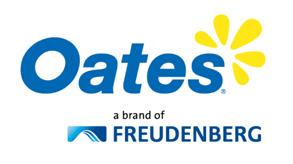
Call 1300 789 845 info@interpoint.com.au issacleaninghygieneexpo.com

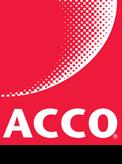

 OWNED BY MEDIA PARTNER PLATINUM SPONSOR GOLD SPONSOR SILVER SPONSORS
OWNED BY MEDIA PARTNER PLATINUM SPONSOR GOLD SPONSOR SILVER SPONSORS
More than two years after Australia’s first border closures and nationwide lockdowns, a greater understanding of hygiene and the role we collectively all play in helping reduce the spread of germs has emerged.
When faced with the behemoth task of protecting over one million visitors, 10,000 athletes, volunteers, and cleaning crew members from germs at the 2022 Commonwealth Games over 12-days and 15 stadiums, we set out to build a bespoke hygiene and cleaning program that would cater to one of the year’s largest sporting events while also encouraging people to ‘do the right thing’.
Thanks to our long history of research and rigour to inform our products at Reckitt, we used a combination of proven methodologies such as motivation, effective ‘nudge theory’ and choice architecture to inform our hygiene protocols (I’ll get to what each of these means imminently). The importance of these techniques has become more apparent than ever in helping to drive positive hygiene behaviour as complacency creeps in.
One of the most widely used approaches for behavioural change at both individual and societal levels is ‘nudging’. Based on the understanding that behaviour is strongly influenced in largely automatic ways by the context within which it is placed, ‘nudging’ is used to push people in particular directions. Nudge theory can be effective at influencing the likelihood of someone exhibiting a behaviour – as seen with the fly experiment carried out by Richard Thaler at Amsterdam Schiphol airport.
Thaler and his team discovered that etching a fake fly into the airport urinals improved men’s aim and reduced spillage by 80 per cent when urinating . While I’m relieved to tell you that we refrained from sticking fake flies above urinals at the Commonwealth Games, we did employ similar nudge theory tactics to help protect players, spectators, and employees from the spread of germs.
Here are our top tips that any organisation, or large-scale event, can employ to help influence behaviour change to enhance hygiene compliance.
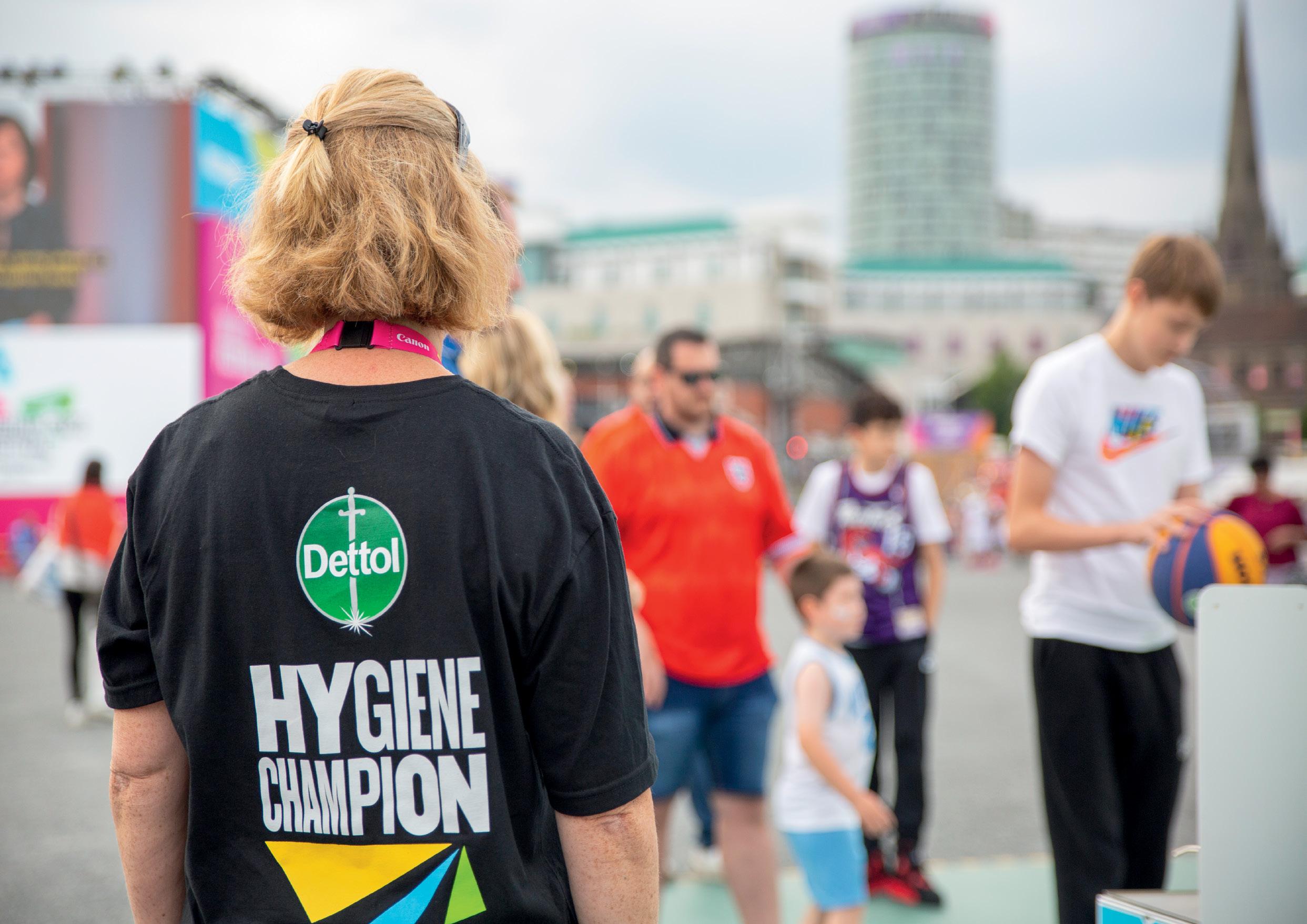
More than 2800 sanitising stations were set up at the Games, of which 100 were ‘talking’ hand sanitiser dispensers. This was an innovative way and a surprising element to remind the crowds of the importance of hygiene behaviour.
Behaviours are much more likely to be practised if they are convenient or require limited effort.
Studies have shown that particular settings can help ‘nudge’ people towards the right behaviour. Making target behaviours visible, the default or easy option has been demonstrated to be an effective approach to changing a range of public health behaviours and has been used quite widely to promote hand hygiene amongst children .
At the Commonwealth Games 2022 we distributed more than 2000 posters to reinforce good hand hygiene habits in the sink area of each restroom, alongside the use of Dettol soap. However, one can argue that trying to reach people purely at the basin area
is a bit late. And so, we took things a step further and targeted people in the cubicles with clear, simple and entertaining messaging. We placed thousands of stickers, in the shape of hands, with messages such as ‘Winners Wash Their Hands Before They Return To The Stands’ or, ‘Cleanliness is Next To Sportiness, Wash Your Hands’ prompting attendees to wash their hands and placed them on the back of cubicle doors, to encourage good hand hygiene at a critical moment.
A key task of any behavioural intervention is to get people’s attention and continue to disrupt the status quo until the ‘new normal’ includes the targeted behaviours. This is because the majority of behaviour
happens automatically and is shaped by what has worked well in the past, something called ‘reinforcement learning’, where a problem is faced and behaviour is learnt through trial-anderror interactions .
A Dettol hygiene kit was given out at the Games to provide staff, volunteers, athletes and officials with a face covering and personal hand sanitiser to use when on the move. Hygiene messaging, incorporated on to the box itself, encouraged the use of the items, again making it as easy as possible to drive positive hygiene behaviours.
Protocols at the 2022 Commonwealth Games were centred around timely and ‘Targeted Hygiene’ — the practice of putting into place hygiene surface and hand hygiene interventions when and where they are most needed .
More than 2800 sanitising stations were set up at the Games, of which 100 were ‘talking’ hand sanitiser dispensers. This was an innovative way and a surprising element to remind the crowds of the importance of hygiene behaviour.
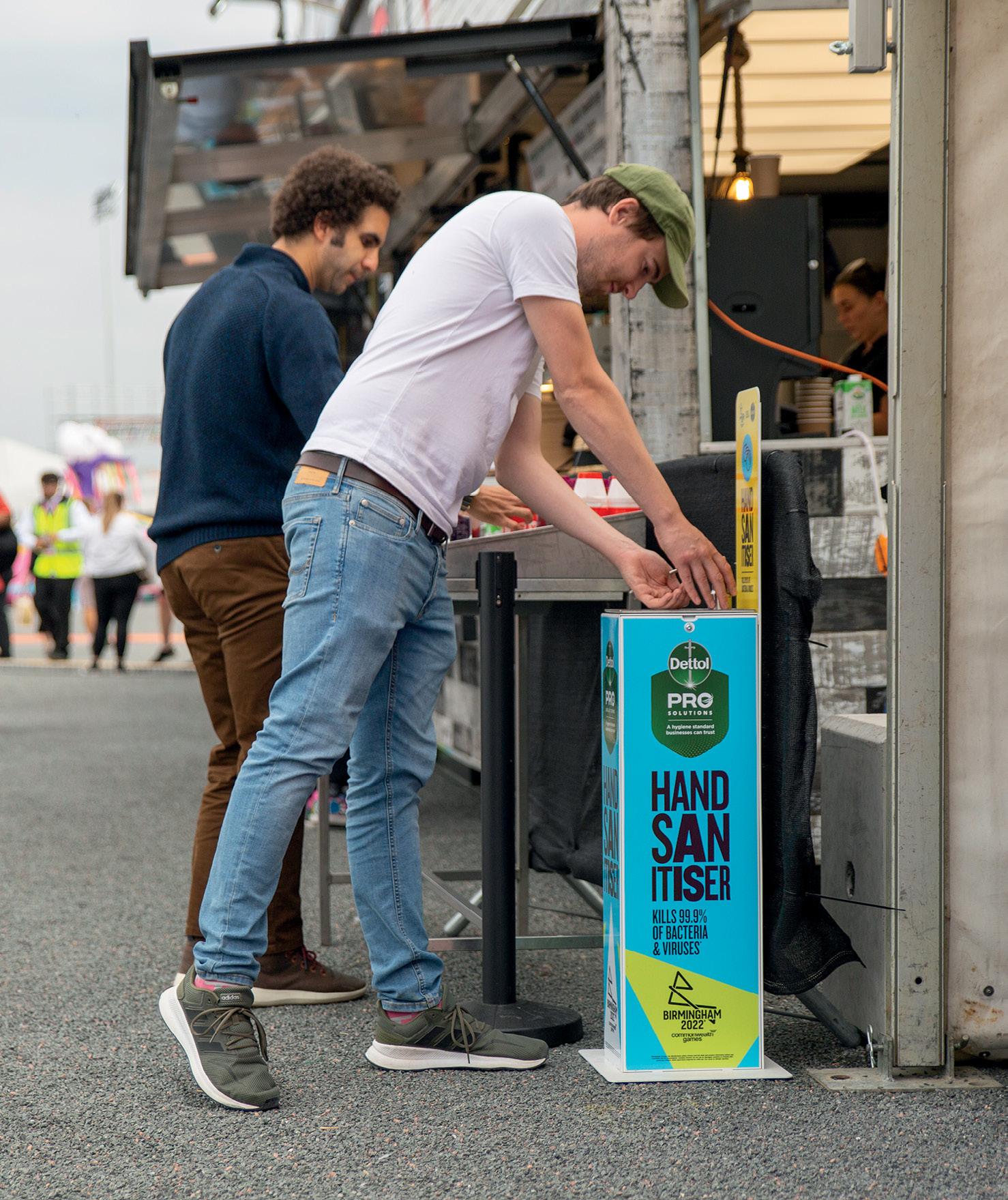
The dispensers had a voice activation feature that delivered ‘thank you’ messages to people as they sanitised their hands and a counter to show how many times the unit had been used.
This principle emphasises the use of interventions that are also fun and brightly coloured in the attempt to capture one’s attention. One study at a school in Bangladesh found that changes to the infrastructure, including brightly coloured paint and footpath nudges that led from the toilet to the handwashing facility resulted in a 64 per cent increase in good hygiene behaviour six weeks after installing the nudge . This could be considered hand-in-hand with other appropriate measures, such as encouraging staff and attendees to wash or sanitise their hands at critical times, such as upon arrival at the premises.
The 2022 Commonwealth Games celebrated human achievement, perseverance, and dedication. Reckitt also champions these attributes in its purpose to protect, heal and nurture in the relentless pursuit of a cleaner, healthier world. ■
Katy Slater is Regulatory Director, New Growth Platforms, Reckitt
1. Vlaev, I., King, D., Dolan, P. and Darzi, A., 2016. The theory and practice of “nudging”: changing health behaviours. Public Administration Review, 76(4), pp.550-561.
2. Oullier, O., Cialdini, R., Thaler, R.H. and Mullainathan, S., 2010. Improving public health prevention with a nudge. Economic Perspectives, 6(2), pp.117-36.
3. Watson J, Dreibelbis R. Using Environmental Nudges to improve handwashing with soap among school children. COVID-19 Hygiene Hub: WASH in Schools Network; 2020.
4. Kaelbling, L.P., Littman, M.L. and Moore, A.W., 1996. Reinforcement learning: A survey. Journal of artificial intelligence research, 4, pp.237-285.
5. The Case for Targeted Hygiene, 2019, Accessed 7 July 2022 at: https://journals.sagepub.com/doi/10.1177/1757913919864070#:~:text=Targeted%20Hygiene%20is%20 an%20 approach,in%20Figures%201%20and%202
6. Watson J, Dreibelbis R. Using Environmental Nudges to improve handwashing with soap among school children. COVID-19 Hygiene Hub: WASH in Schools Network; 2020.
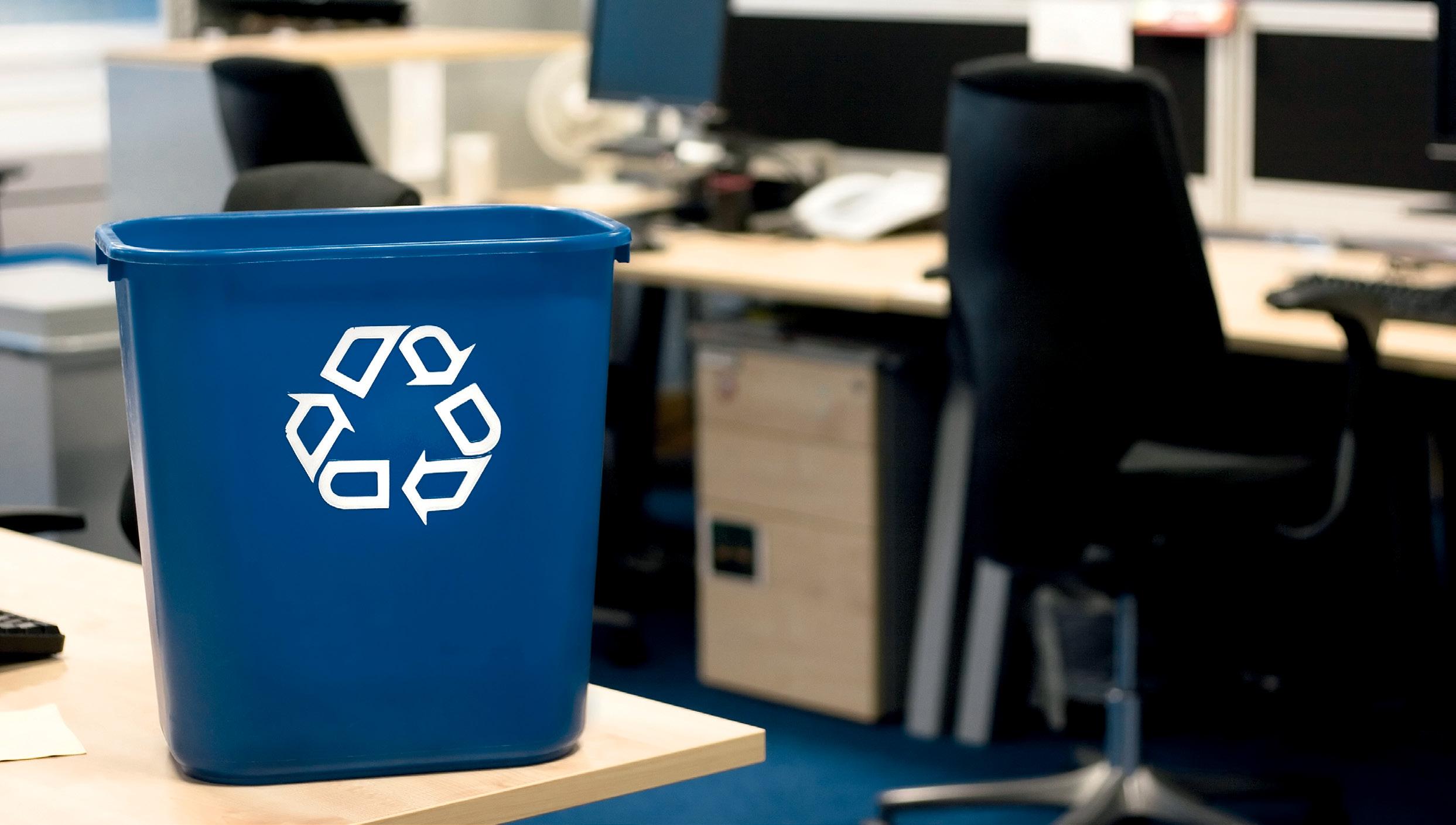
In recent years, organisations looking for ways to reduce their environmental impact have turned their focus to facility waste management.
Managing all that waste efficiently and cost effectively can be a challenge. As such, facility managers must find ways to reduce the waste their buildings produce. Fortunately, there are many things they can do to achieve this goal.
This article suggests three key steps: conducting regular waste audits, analysing your facility’s existing approach to waste management, and working to reduce the level of waste that goes to landfills.
The way an organisation handles its waste is closely related to the overall effectiveness of its facility management.
Good waste management practices can help a facility save money, reduce its environmental impact, and improve its image.
The first step in effective waste management is understanding the waste types generated at a facility. Waste can be classified as either solid or liquid, and each kind of waste presents unique management challenges.
• Solid waste: Solid waste is any garbage, refuse, or other discarded material resulting from industrial, commercial, mining, and agricultural operations. This waste can harm the environment if it’s not managed correctly, so facilities need to have a plan for properly disposing of it.
• Liquid waste: Industrial and municipal facilities generate large amounts of liquid waste, including sewage, stormwater runoff, and processed wastewater. Liquid waste can contain harmful pollutants that
could contaminate water supplies and harm the environment.
Once a facility understands the predominant waste types it generates, the next step is to develop a plan for managing that waste. Facility managers can follow five tips to reduce waste and improve their facilities’ environmental performance.
By identifying the areas where your facility produces the most waste, you can focus on finding solutions. Start with finding and addressing the root causes of your facility’s waste. Even simple changes, like using more recycled materials, can make a big difference. Regular audits will help you keep track of your progress and ensure that your efforts have a positive impact. Many facilities find that conducting waste audits is one of the most effective ways to reduce environmental impact.
To analyse your current approach to waste management, consider the following:
• The type and amount of waste produced
• The source of the waste
• Environmental and financial costs of managing the waste
• The potential solutions for reducing waste. With these in mind, facility managers can develop a waste management plan tailored to their facilities. Let’s say you want to reduce the amount of paper waste your facility produces. You can do this by switching to digital documentation and communication. The change would require an initial financial investment, but it would save money in the long run.
After conducting an audit and analysing your current approach to waste management, implement a plan to reduce waste. This plan should include specific goals and objectives as well as strategies for achieving those goals.
As previously mentioned, switching to digital documentation and communication could be one solution. Other solutions might include:
• Recycling: Setting up a recycling program for paper, plastic, and other materials
• Composting: Implementing a composting program for food waste
• Reusing: Finding ways to reuse materials instead of throwing them away.
These are just a few examples; there are many other ways to reduce waste. The important thing is to find solutions that work for your facility.
Educating your employees on the importance of waste reduction is essential to the success of your plan. Employees should be aware of the goals, objectives, and strategies used to achieve the plan.

Make sure to ask employees for their input on the plan. This will help ensure that everyone is on board and increase the chances of successful implementation. When employees are invested, they are more likely to make an extra effort to reduce waste.
Suppose you plan to reduce waste using a technical solution. In that case, train your employees about the latest technology and how it can help reduce waste. Encourage them to attend workshops and seminars on waste reduction.
Monitoring your progress is essential to ensure that your waste reduction plan works. Track the amount of waste produced and the costs associated with managing that waste. Periodically conduct waste audits to follow your progress and stay on schedule with your objectives.
If you are not making progress, it’s crucial to identify why and make appropriate revisions to your plan. Sometimes, changes in technology or processes can help you achieve your goals, while other times, they might stimulate the need to make adjustments.
For example, if you cannot reduce the amount of waste produced, you may need to increase your recycling or composting efforts. Overall, monitoring your progress and updating your facility management strategy is essential to the success of your waste reduction plan.
Reap the benefits of your efforts
Reducing waste can seem daunting, but it is achievable. You can see accurate results by auditing your facility’s waste production, implementing a waste reduction plan, and educating your employees on the importance of reducing waste. And don’t forget to monitor your progress – this is essential to ensure an effective waste management plan. ■
Bryan Christiansen is the founder and CEO of Limble CMMS. This article was originally published by CMM and has been republished with permission
The way an organisation handles its waste is closely related to the overall effectiveness of its facility management.
As the world continues to address the challenges associated with rapidly changing business demands, cleaning organisations desperately need viable information to respond to the daily rollercoaster of change. These modifications range from staffing challenges and reductions to cleaning frequency increases and new levels of service.
Published cleaning tasks, tools, and times are in demand now more than ever. With labour representing a larger piece of a cleaning organisation’s budget, knowing how long specific tasks take to properly complete drives correct staffing.
Cleaning times are the starting point for preparing bids and estimates, as well as for budgeting labour and workloads based on specific cleaning tasks.

Cleaning times identify efficiencies for increased productivity through the utilization of equipment and technology.
Cleaning professionals build standard cleaning schedules using five common components: tasks, tools, times, total units, and training.
Traditionally, there are five main methods to calculate how long a cleaning job will take:
1. By task and time
2. By square footage to be cleaned per hour or day
3. By the area assigned to be cleaned
4. By each fixture – which includes an inventory of toilets, urinals, and sinks
5. By adopting benchmarked data from other businesses of similar type and size. Although an experienced workloader might be able to calculate the time and costs of cleaning an area, those with less experience will need a reference base from which to start.
As an industry, cleaning professionals are typically not standardised in how they determine staffing levels.
Many organisations are reactionary in their custodial operations and lack a dedicated investment in workloading.
Some adapt readily to the concept due to economic pressures and a focus on a financial bottom line.
Others do not have the resources to invest in work loading and need a trusted resource to validate cleaning times. This is where an end-user validation program comes into play. Focus on the following five primary activities while working with end users on work loading assessments:
• Collecting and analysing current program documentation
• Conducting a site visit and physically verifying cleanable assets
• Determining necessary staffing levels
• Comparing current staffing to the industry standard
• Making recommendations including upgrades for a best-in-class program.
Using information gathered from the steps above, create a work loading chart that lists the optimal amount of time (or labour) that it takes to perform specific cleaning tasks in your facility based on its square footage and the number of fixtures it contains.
Make sure to include non-cleaning tasks, such as breaks and equipment setup. List tasks competed every day, such as garbage pickup and floor cleaning, as well as tasks that are performed less frequently, such as floor stripping and refinishing.
The goal of workloading is to provide a mathematical and factual base for custodial staffing levels in relation to customer and management expectations of cleanliness.
Validated cleaning times specific to your facility’s unique features will take away the guesswork regarding resources needed to ensure your business keeps up with changing demands. ■
Tim Poskin is director of ISSA Consulting, providing systems integration and consulting solutions for the cleaning industry. Poskin is one of the world’s leading authorities on custodial workloading. He currently serves as chair of the ISSA Cleaning Management Institute (CMI) workloading and benchmarking committee. He can be reached at timp@issa.com.
Clear Reflections window cleaner contains a quick, efficient detergent system that rapidly penetrates and dislodges dirt, dust, and other soils on windows. It leaves a streak free surface on glass and most other surfaces. Clear Reflections may also be used on surfaces such as computer and T.V monitors, stainless steel, Formica, whiteboards and many other surfaces. Novel detergent system ensures a minimum amount of elbow grease in cleaning. Clear Reflections may also be used as a spray and wipe for cleaning desk and counter tops in office environments.
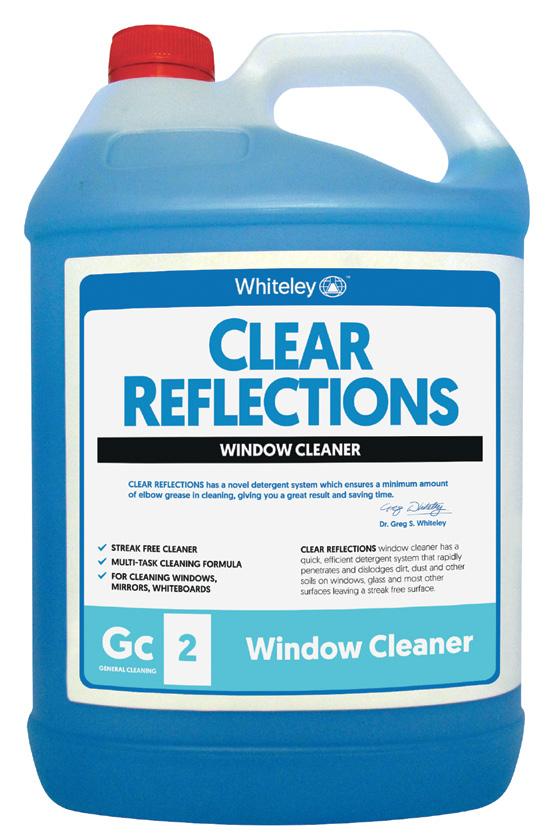
The boosted alkalinity in Clear Reflections makes it ideal for use as a multitask spray and wipe for poker machines.
• Clear Reflections is available in 5-litre and 500ml spray bottles
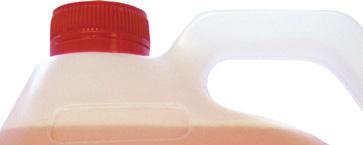
• Streak free cleaner

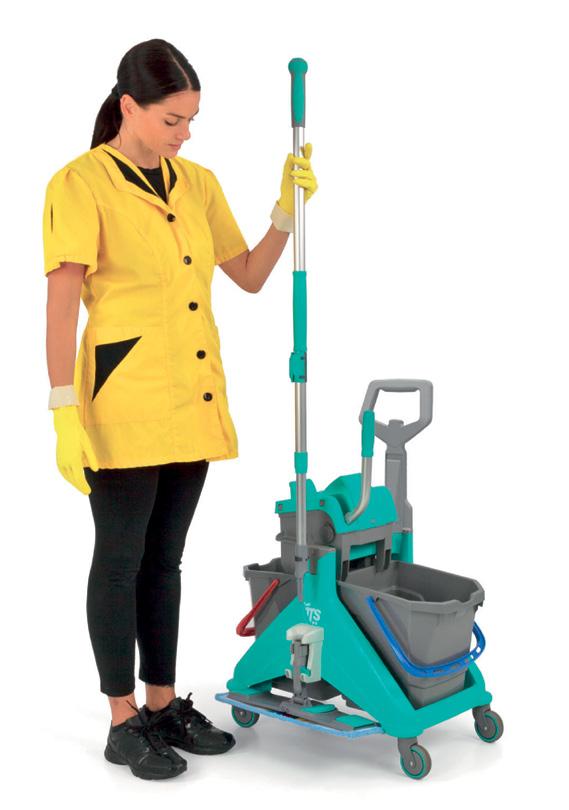
• Boosted alkalinity for multipurpose use
• Multi-task cleaning formula
Whiteley Corporation



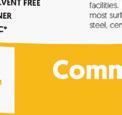
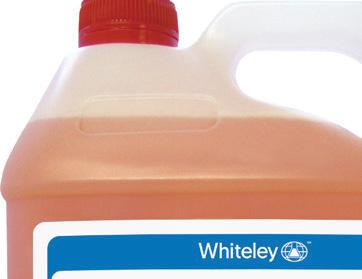
0800 257 352
www.whiteley.co.nz
Dusting, washing, transporting, and collecting: TTS products and systems fully meet all requirements, making cleaning simple, fast, and highly effective. Designed to overcome the limits of traditional methods, they facilitate different operations while ensuring maximum hygiene, efficiency, and safety.
• Products made from 100 per cent polypropylene: fully recyclable

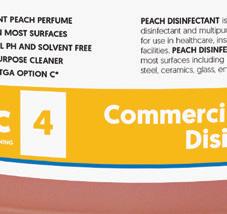
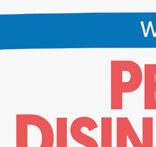
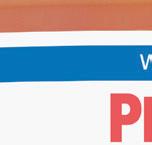

• Use of raw materials deriving from recycling: low environmental impact
• Ongoing research for innovative materials: more hygienic, lightweight, and strong






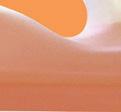



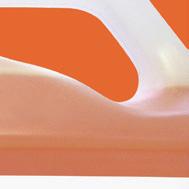









• Sustainable design: it reduces the waste of natural resources and energy
• Increasing the ROI of our products: efficiency and guaranteed performance over time


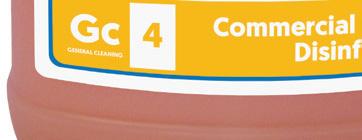
• Improving health of the operators: maximum results with minimum effort
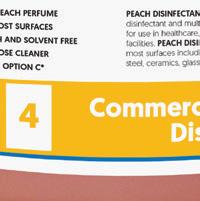

NZ Cleaning Supplies
0800 269 253 orders@cleaningsupplies.net.nz www.cleaningsupplies.net.nz

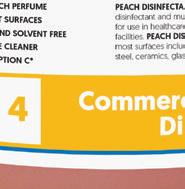
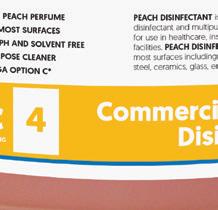
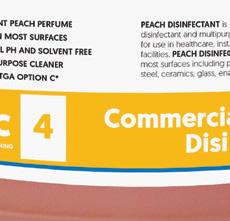
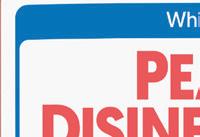
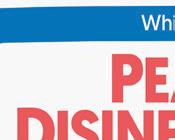
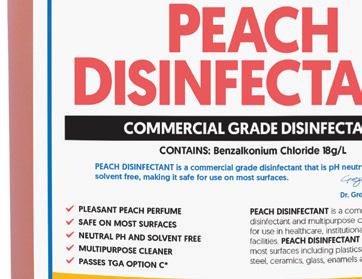

Resolve All Purpose is a water-soluble cleanerdegreaser which rapidly emulsifies, suspends and removes all types of animal, vegetable and petroleum oils. It is also extremely efficient at removing greases and grime in industrial, commercial, and food processing areas. Resolve All Purpose being a non-flammable waterbased detergent, makes the ideal replacement for solvent-based cleaners-degreasers and is suitable for use in registered food preparation establishments.
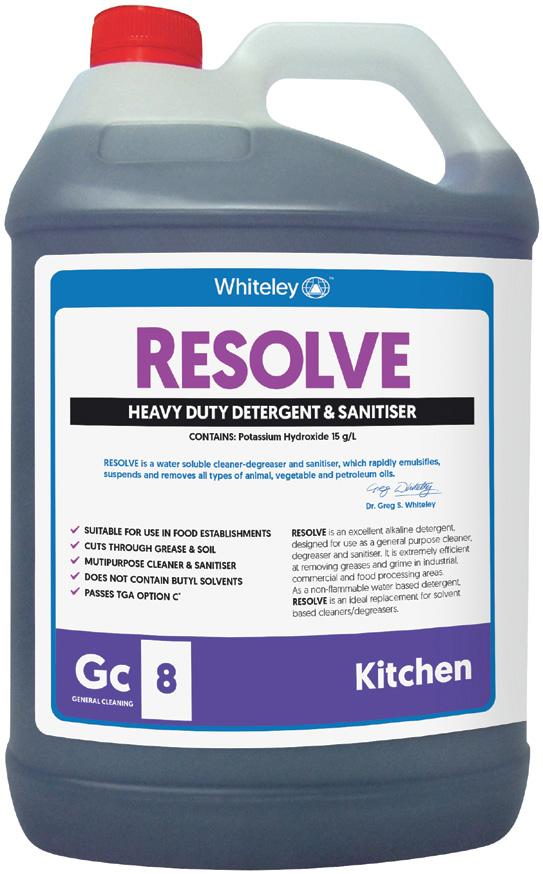
• Cuts through grease and soil
• Does not contain any Butyl Solvents
• Multipurpose cleaner and sanitiser
Whiteley Corporation
0800 257 352
www.whiteley.co.nz
Introducing Henry Quick, Proquip’s latest small but mighty cordless vacuum from Numatic! Perfect for spot and day cleaning and a must-have around the home or at work, Henry Quick has a huge capacity for its size with a full litre of compacted dust space. Plus, with the recycled, climate-friendly dust collection pods, you get easy one-click dust-free emptying that’s better for you and the environment. Other fantastic features include scented capsules for super freshness, a power brush and power boost button to pick up the most stubborn dust bunnies. Supplied with 1 Lithium Battery. Talk to the Proquip team today.
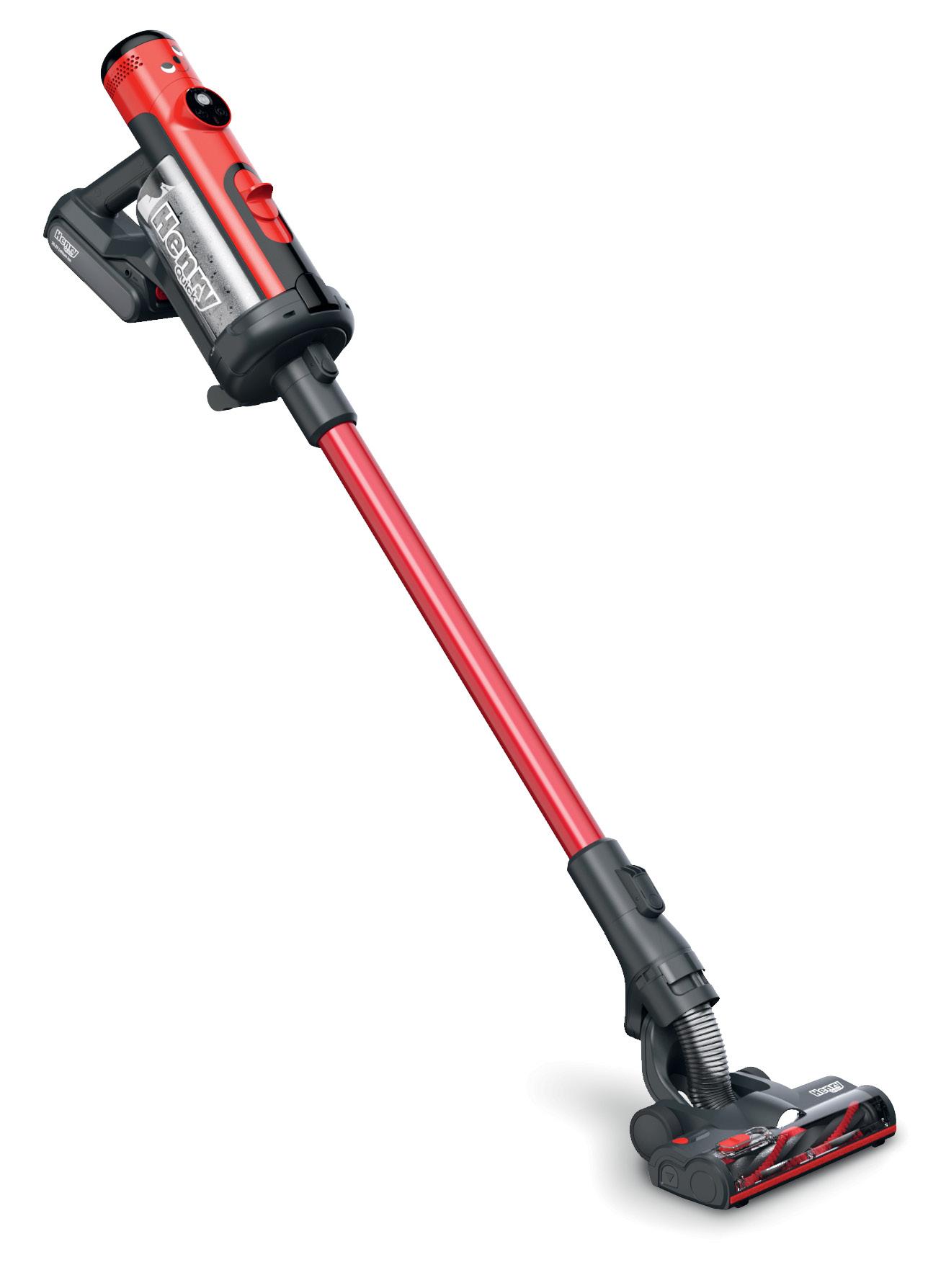
Proquip New Zealand
www.proquipnz.co.nz
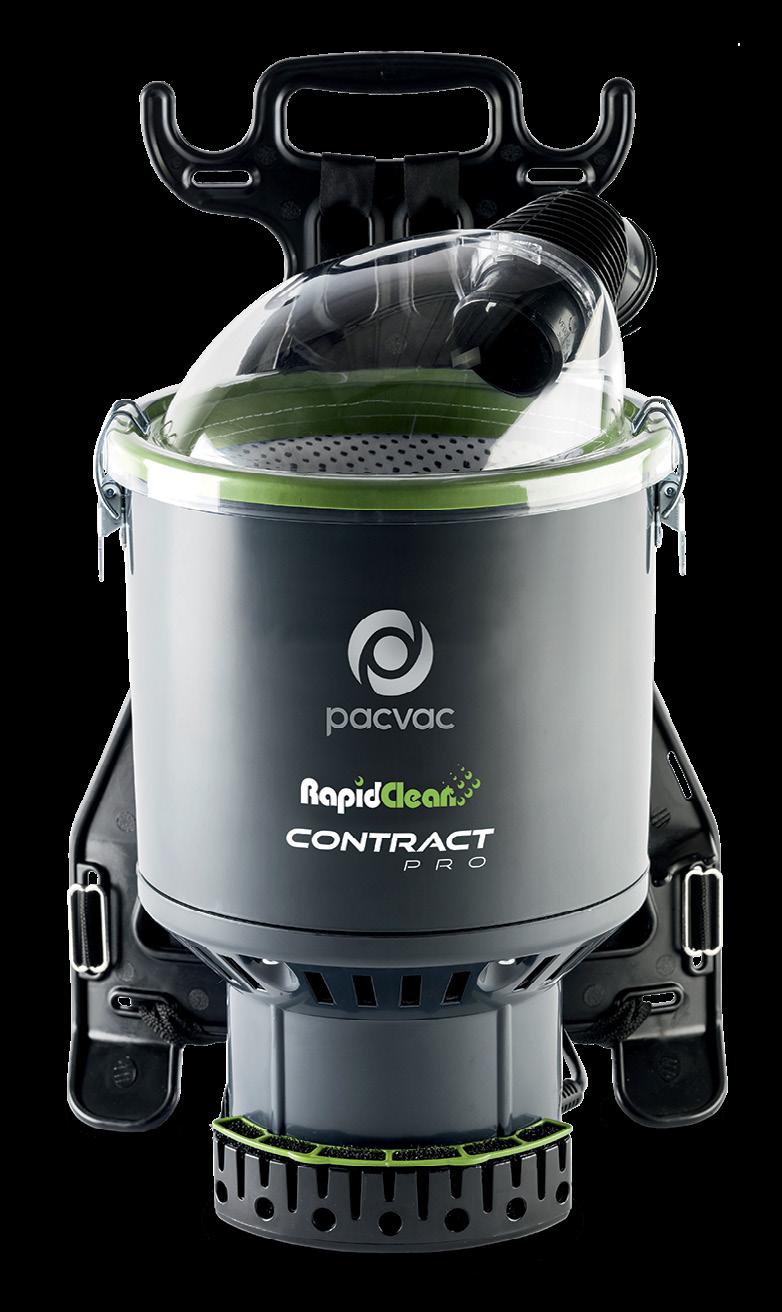
Contract Pro provides strong suction power driven by the 1300W motor high productivity when deep cleaning in medium scale commercial environments. The hi-flow filtration and sealed disposable SMS dust bag offers the 4 stages of filtration, improving indoor air quality.
• 1300-watt flow through motor
• Noise level (at 1.5m) 66dB(A)
• 55-Litre p/sec airflow rate
• Lightweight at 4.6kg
• Capacity five-litre
• Ergo padded harness and waist band
• Cable restraint - short IEC lead
• Premium 18m orange extension lead
• Four-stage filtration - High flow filter
• Two-year body and motor warranty
RapidClean New Zealand
0508 727 433
sales@rapidclean.co.nz
www.rapidclean.co.nz
















